
2009 Season

Fiddler on the Roof
(1964)
Music by Jerry Bock
Lyrics by Sheldon Harnick
Book by Joseph Stein
In the small Russian village of Anatevka, a violinist perches perilously on the roof of the home of Tevye, the milkman. The fiddler scratches out a tune, just as the Jewish people of Anatevka scratch out a living under perilous conditions. Only one asset sustains them — their tradition. Tevye works hard to provide for his wife, Golde, and their five daughters. He envisions for his oldest daughter Tzeitel a scholarly husband, with whom he can discuss the scriptures. Yente, the matchmaker, however, has other plans for Tzeitel — a match with the rich and widowed butcher, Lazar Wolf. Tzeitel has her own sights set on her childhood friend, the penniless tailor Motel Kamzoil, who eventually summons the courage to ask Tevye for Tzeitel’s hand. Adamantly refusing at first, Tevye finally relents when he sees the love in Tzeitel’s eyes. The revolutionary university student, Perchik, engaged to teach the bible to Tevye’s children in exchange for food, makes a positive impression on second daughter Hodel. Tevye, meanwhile, has been informed by the local constable that there must be some anti-Jewish demonstrations in the area. His immediate concern, however, is how to break the news to Golde that he has given his blessing to Tzeitel and Motel. He cunningly relates to her his dream in which Golde’s grandmother has risen from the grave and insisted that Tzeitel marry Motel. In her support, there appears the apparition of Fruma-Sarah, the butcher’s deceased wife, who threatens revenge on Tzeitel should she take her place as Lazar’s wife. The frightened Golde has no choice but to agree that a marriage between Tzeitel and Lazar is impossible. The act ends as the joyous wedding celebration of Tzeitel and Motel is interrupted by a band of Russian soldiers, carrying out the threatened demonstration. Perchik professes his love for Hodel as he tells her that he must return to the city to further his political causes. In a break with tradition, he does not ask Tevye’s permission to marry Hodel, but only for his blessing. Some time later, news reaches Anatevka that Perchik has been arrested for his political activities and sent to Siberia — Hodel must go to him, but promises her father that they will be married properly as soon as Perchik is freed. When third daughter Chava announces her intention to marry outside the faith — to the Russian Fyedka — Teyve is incensed and will not be swayed; from that day on, Chava is dead to him. The final blow to life in Anatevka comes with the news that all Jews must leave the village. As they leave — some for America, some for other destinations in Europe — Tevye beckons the fiddler on the roof to follow. Wherever life might lead the displaced villagers, the fiddler will forever be with them.
Conductor: J. Lynn Thompson
Stage Director: Stephen Carr
Choreography: Carol Hageman
Costume Design: Eric Hall
Scenic Design: Kimberly Cox
Lighting Design: Shannon Schweitzer
Assistant Conductor: Selim Giray?
Assistant Choreography: Karla Hughes
Tevye, A Dairyman Ted Christopher
Golde, His Wife Julie Wright
Tzeitel, Their Daughter Courtney Miller
Hodel, Their Daughter Karla Hughes* Samantha Grenell-Zaidman**
Chava, Their Daughter Tania Mandzy
Shprintze, Their Daughter Anna Kitzmiller* Stephanie Haught**
Bielke, Their Daughter Noelle Crites* Taylor Mills**
Yente, Matchmaker Ashly Evans
Motel, Tailor Jacob Allen* David Kelleher-Flight**
Perchik, A Student Revolutionary Nate Brian* Paul Hopper**
Lazar Wolf, Butcher Gary Moss* Zack Rabin**
Mordcha, Innkeeper Matthew Kuehnl
Rabbi, Spiritual Leader of Anatevka Chris Wert
Mendel, His Son Logan Walsh
Avram, Bookseller Owen Reynolds
Nachum, Beggar Philip McLeod
Grandma Tzeitel, Golde’s Grandmother Janelle Lentz
Fruma-Sarah, Lazar Wolf’s Dead First Wife Jessie Wright Martin
Constable, A Russian Officer Mark Snyder
Yussel, A Hatter Galeano Salas
Fyedka, A Young Russian Jon Gerhard
Sasha, His Friend Stephen Faulk
Shaindel, Motel’s Mother Holly Wert
Fiddler Emily DeVincent
Children
Kellen Crites, Jacob Nurse, Alexander Thompson, Jennifer & Jillian Vicknair
* June 12, 20, 26 July 2, 9, 12, 17, 26, August 6
**June 17, 23, 28 July 7, 11, 16, 22, 30, August 8
? June 26, July 7, 11, 12, 16, 26
Ensemble: Matt Ankney, Chelsea Basler, Nate Brian, Justin Carroll, Erin Daigle, Cecily Ellis, Ashly Evans, Stephen Faulk, Jon Gerhard, Eve Hehn, Paul Hopper, Kyle Knapp, Jacqueline Komos, Matthew Kuehnl, Janelle Lentz, Tania Mandzy, George Maxin, Philip McLeod, Sara Ann Mitchell, Gary Moss, Zack Rabin, Owen Reynolds, Galeano Salas, Mark Snyder, Nina Takács, Allison Toth, Logan Walsh, Chris Wert, Holly Wert, Jessie Wright Martin

Of Thee I Sing
(1931)
Music by George Gershwin
Lyrics by Ira Gershwin
Book by George S. Kaufman and Morrie Ryskind
John P. Wintergreen has been chosen by his party as its presidential candidate and provided a running mate…what’s his name…oh, yes…Alexander Throttlebottom. After conducting a poll, the party determines that, after money, it is love that is of the greatest interest to the public. To win the most votes, bachelor Wintergreen must fall in love with a typical American girl and romance her right up until election day — Americans will vote with their hearts and he will be a shoo-in. The party committee holds a contest — the captivating Southern belle, Diana Devereaux, is the winner. Unfortunately, Wintergreen has his heart set on secretary Mary Turner, who can sew and bake corn muffins — he refuses the hand of Diana and goes out on the campaign trail with Mary. After winning the election handily, Wintergreen and Mary are wed by the Chief Justice at the inauguration, a celebration that is interrupted when Diana arrives and serves him with a summons alleging breach of promise. The assembled Supreme Court justices rule in favor of corn muffins — John and Mary can head off to the White House. Vice-President Throttlebottom has been hanging around the White House, wondering what his job is. When told that he presides over the Senate, he dashes out to catch the first street car down Pennsylvania Avenue. Diana has not given up her fight — she gets hold of the French ambassador, who, on her behalf, elevates the issue to an international incident. The party committee, sensitive to the gravity of the situation, demands that Wintergreen either annul his marriage and tie up with Diana, or resign. When the President refuses both options, the committee pursues impeachment. The Senate vote is going distinctively against Wintergreen when, in the truest fashion of Gilbert and Sullivan, Mary bursts in with some startling news that ultimately both turns the vote in her husband’s favor and provides a logical solution to placating Diana and thus resolving the international crisis.
Conductor: J. Lynn Thompson
Stage Director: Steven Daigle
Choreography: Carol Hageman
Costume Design: Charlene Gross
Scenic Design: Fritz Lombardi
Lighting Design: Krystal Kennel
Assistant Conductor: Selim Giray***
Assistant Director: Stephen Carr
Assistant Choreography: Karla Hughes
Sam Jenkins, Chief Sec. to Wintergreen Logan Walsh
Diana Devereaux, A Beauty Pageant Winner Raina Thorne
Mary Turner, Assistant to Matthew Fulton Sahara Glasener-Boles
Miss Emily Benson, Chief Sec. to Mary Turner Allison Toth
Matthew Arnold Fulton, A Newspaper Magnate Jacob Allen
Senator Carver Jones, Senator from the West Mark Snyder
Louis Lippman, A Political Boss David Kelleher-Flight
Francis X. Gilhooley, A Political Boss Anthony Buck
Senator Robert Lyons, Southern Politician Zack Rabin
John P. Wintergreen, Presidential Candidate Nate Brian* Boyd Mackus**
Alexander Throttlebottom, VP Candidate Jon Gerhard
Chief Justice Gary Moss
Chambermaid Courtney Miller
Guide Owen Reynolds
French Ambassador Matthew Kuehnl
Scrub Woman* Jacqueline Komos
* June 18, 26, July 5, 25 August 5
**June 13, 24, 30 July 19, August 2
***June 26, July 5, 25
Ensemble: Erin Daigle, Cecily Ellis, Stephen Faulk, Jon Gerhard, Samantha Grenell-Zaidman, Eve Hehn, Paul Hopper, Karla Hughes, Jacqueline Komos, Matthew Kuehnl, Janelle Lentz, Michael Lucas, Philip McLeod, Courtney Miller, Emily Neill, Kalina Miller-Schloneger, Gary Moss, Owen Reynolds, Galeano Salas, Nina Takács, Allison Toth, Logan Walsh, Chris Wert

A Night in Venice
(1883)
Music by Johann Strauss II
Lyrics by Friedrich Zell & Richard Genée
It is Carnival time again in Venice as macaroni cook Pappacoda extols his virtues as one of the city’s favored institutions. Naval officer Enrico slips him a note with a message for Senator Delacqua’s wife Barbara that he will be awaiting her for a rendezvous later that evening. Anticipating the annual arrival in town of the philandering Duke of Urbino, Senator Delacqua intends to send Barbara by gondola to an out-of-town aunt in Murano for “safekeeping.” Barbara, eager for a romantic evening with Enrico, engages the fisher-girl Annina to disguise herself and take her place in the gondola. Annina’s sweetheart Caramello is the Duke’s barber, always on the lookout for romantic opportunities for his master. Unbeknownst to Annina, he disguises himself, takes the place of the gondolier, and delivers who he thinks is Barbara not to her aunt, but to the Duke, who recalls her receptive response to his advances the previous year. Imagine Caramello’s surprise when, upon arrival at the palace, he and Annina unmask and he realizes that he has just delivered his sweetheart into the hands of the womanizing Duke. Annina is happy to take advantage of the moment and exploit the time with the Duke that fate has given her. Meanwhile, Delacqua is enjoying the festivities with a masked, phony wife, Ciboletta, the girlfriend of Pappacoda. When Delacqua leaves to join Barbara in Murano, the Duke wastes no time and courts both Annina and Ciboletta, with their jealous boyfriends looking on. As the reveling shifts to Saint Mark’s Square, Ciboletta reports to Pappacoda that she has secured for him an appointment as the Duke’s personal cook — now they can marry. Failing to find Barbara in Murano, Delacqua returns, confronts Barbara and Enrico, and is only placated when Enrico concocts some story about rescuing the senator’s wife from an impostor gondolier. The Duke, less interested in Barbara when he takes note of Enrico’s size, rewards Caramello for keeping him out of trouble by promoting him to his personal steward. Caramello and Annina can now marry…and the Carnival celebration continues through the night.
Conductor: Michael Borowitz
Stage Director: Ted Christopher
Choreography: Carol Hageman
Costume Design: Charlene Gross
Scenic Design: Kimberly Cox
Lighting Design: Shannon Schweitzer
Pappacoda, Neapolitan Macaroni Cook Gary Moss
Enrico Piselli, A Naval Officer/Delacqua’s Nephew Anthony Buck
Annina, A Fisher-Girl Chelsea Basler
Caramello, Delacqua’s Barber/Annina’s Sweetheart Todd Strange
Ciboletta, Delacqua’s Maid/Pappacoda’s Sweetheart Ashly Evans
Bartolomeo Delacqua, Senator of Venice Boyd Mackus
Barbara, His Wife Tania Mandzy
Guido, Duke of Urbino, Lady-loving Duke Kyle Knapp
Stefano Barbaruccio,Senator of Venice David Kelleher-Flight
Giorgio Testaccio, Senator of Venice Jacob Allen
Agricola, Barbaruccio’s Wife Janelle Lentz
Agrippina, Testaccio’s Wife Courtney Miller
Centurio, The Duke’s Page Paul Hopper
Francesco Jon Gerhard
Balbi Cory Clines
Pizza Vendor Spiro Matsos
Ensemble: Cory Clines, Cecily Ellis, Stephen Faulk, Jon Gerhard, Sahara Glasener-Boles, Samantha Grenell-Zaidman, Eve Hehn, Paul Hopper, Karla Hughes, Jacqueline Komos, Matthew Kuehnl, Janelle Lentz, Spiro Matsos, Philip McLeod, Courtney Miller, Zack Rabin, Owen Reynolds, Galeano Salas,
Nina Takács, Allison Toth, Raina Thorne, Logan Walsh

H.M.S. Pinafore
(1878)
Music by Arthur Sullivan
Book & Lyrics by W. S. Gilbert
High spirits prevail aboard the H.M.S. Pinafore as bumboat woman Little Buttercup distributes sweets and tobacco to the crew. Seaman Ralph Rackstraw’s mind, however, is on Josephine, the daughter of their Captain Corcoran. He is in love with her even though she is socially unattainable. Unaware of his affection, Josephine is in love with Ralph, but pride prevents her from revealing this because of his low station. Josephine, meanwhile, is sought in marriage by Sir Joseph Porter, First Lord of the Admiralty, whose advances she refuses to acknowledge. Sir Joseph holds strong views about the treatment of sailors — he maintains that a British sailor is any man’s equal (excepting his own) and should always be treated with politeness, without recourse to bad language or abuse. This inspires Ralph to declare his love to Josephine, who soon forgets her pride and confesses her true feelings to him. Plans are quickly made to smuggle the couple ashore that night to be married. The only crewmember who is not happy at the news is Dick Deadeye. He betrays their intentions to the Captain and they are caught before they can leave the ship. Furious at Ralph’s actions, the Captain loses his cool and utters a swear word that is, unfortunately, overheard by Sir Joseph. He is appalled at such an outburst and turns to Ralph for an explanation. Unfortunately, Ralph only makes matters worse by revealing that he is in love with Josephine. The situation is only saved by Little Buttercup, who intervenes to confess how, in her youth, she had fostered two babies from opposite ends of the social ladder. In the course of caring for them, she had mixed them up. The baby from the poor background was really Captain Corcoran; that from the upper crust was Ralph. Upon hearing this, Sir Joseph immediately loses all interest in Josephine and gladly resigns her to Ralph, now Captain Rackstraw.
Conductor: Michael Borowitz
Stage Director: Frederick Reeder
Choreography: Carol Hageman
Costume Design: Charlene Gross
Scenic Design: Kimberly Cox
Lighting Design: Shannon Schweitzer
Assistant Conductor: Selim Giray***
The Rt. Hon. Sir Joseph Porter, K.C.B., First Lord of the Admiralty Frederick Reeder
Captain Corcoran, Commander of the H.M.S. Pinafore Dennis Jesse* Boyd Mackus**
Ralph Rackstraw, Able Seaman Paul Hopper* Kyle Knapp**
Dick Deadeye, Able Seaman Zack Rabin
Bill Bobstay, Boatswain’s Mate Nate Brian
Bob Becket, Carpenter’s Mate Cory Clines
Josephine, The Captain’s Daughter Samantha Grenell-Zaidman* Sara Ann Mitchell**
Cousin Hebe, Sir Joseph’s First Cousin Sahara Glasener-Boles
Little Buttercup, A Portsmouth Bumboat Woman Jessie Wright Martin* Ashly Evans**
Midshipmite Jack Neill
* June 25 July 3, 17, 31
**June 27 July 11, 23 August 8
*** July 3, 11 and 31
Ensemble: Chelsea Basler, Nate Brian, Anthony Buck, Cory Clines, Stephen Faulk, Sahara Glasener-Boles, Jon Gerhard, Eve Hehn, Matthew Kuehnl, Janelle Lentz, Tania Mandzy, Courtney Miller, Zack Rabin, Owen Reynolds, Galeano Salas, Todd Strange, Nina Takács, Raina Thorne, Allison Toth, Logan Walsh, Sarah Warrick, Holly Wert

Mlle. Modiste
(1905)
Music by Victor Herbert
Book & Lyrics by Henry Blossom
Restoration of Orchestra Parts by Bruce Herman
Salesgirls at Madame Cécile’s Parisian hat shop have no luck in interesting the American, Mrs. Hiram Bent, in any of the latest millinery creations of their boss. Madame Cécile is furious at their lack of salesmanship and laments the absence of her prize employee Fifi, who certainly could have secured a sale. So valuable is the young girl to the shop’s success, and so fearful is Cécile that some rival shop might steal her, that she has decided that Fifi should marry her milksop son Gaston. Needing to keep on good terms with his mother, who provides him with money to support his high life, Gaston agrees to the union. Fifi, however, is being courted by the dashing Captain Étienne, whose sister and guardian uncle are scandalized by the thought that their kinsman even contemplate such a social mismatch. Back in the shop, Fifi chats with a customer, Hiram Bent, expressing her longing to leave her job and pursue a stage career, a move that Hiram encourages. Hiram, with more money than he knows what to do with, slips 5000 francs into an envelope that he knows Fifi will soon discover. Wanting neither to work to support a man nor have a man support her, Fifi rejects marriage proposals — first from Gaston and then from Étienne, whose love she returns, but who must wait until she is no longer just a shop girl. Fifi announces to Madame Cécile that she will not marry Gaston and, in fact, is quitting her job to pursue her dream. As she leaves, she discovers the envelope and knows that fate is smiling on her. A year later, at a charity bazaar at the home of Étienne’s uncle, guest Hiram Bent relates how Fifi has become a major singing star, paid him back for the cash advance and, in fact, will be performing this very day for the assembled guests. When Fifi arrives, the uncle forbids her from singing and from ever marrying his nephew. The strong-willed Fifi swears to him that she will only marry Étienne when the day comes that the uncle begs her to do so. When Étienne arrives, Fifi changes places with the hired fortune teller and learns that Étienne’s feelings for her are as strong as ever. Through a bit of cunning with a mirror, she wins Étienne’s uncle to her side—he indeed begs her to marry Étienne.
Conductor: Michael Borowitz
Stage Director: Steven Daigle
Choreography: Carol Hageman
Costume Design: Charlene Gross
Scenic Design: Kimberly Cox Lighting Design: Dave Stoughton
Assistant Conductor: Selim Giray*
Assistant Director: Anthony Buck
Henri De Bouvray, Count of St. Mar Boyd Mackus
Captain Étienne De Bouvray, His Nephew Todd Strange
Hiram Bent, American Millionaire Dennis Jesse
Gaston, An Artist and Mme. Cécile’s Son Jacob Allen
General Le Marquis de Villefranche Matthew Kuehnl
Lieut. Rene La Motte, Engaged to Marie Louise Cory Clines
François, Porter of Mme. Cécile Jon Gerhard
Mme. Cécile, Proprietress of a Parisian Hat Shop Julie Wright
Fanchette, Her Daughter Ashly Evans
Nanette, Her Daughter Cecily Ellis
Marie Louise, Étienne’s Sister Allison Toth
Bebe, Dancer at Folies Bergere Jacqueline Komos
Mrs. Hiram Bent, Wife of Hiram Bent Jessie Wright Martin
Fifi, Shop Girl / Stage Star Sara Ann Mitchell
Girl solo, Act II Eve Hehn
1st Footman Owen Reyolds
2nd Footman Philip McLeod
* July 10, August 1
Ensemble: Chelsea Basler, Nate Brian, Erin Daigle, Stephen Faulk, Jon Gerhard, Sahara Glasener-Boles, Samantha Grenell-Zaidman, Eve Hehn, Paul Hopper, Dennis Jesse, Kyle Knapp, Jacqueline Komos, Matthew Kuehnl, Janelle Lentz, Tania Mandzy, Philip McLeod, Owen Reynolds, Raina Thorne, Allison Toth, Logan Walsh, Jessie Wright Martin

The Beautiful Helen of Troy
(1864)
Music by Jacques Offenbach
Book & Lyrics by Ludovic Halévy & Henri Meilhac
Translation and Performance Version by Richard Traubner
On the day that worshippers bring offerings for the Feast of Adonis, Helen, the Spartan queen, learns from the soothsayer Calchas that Venus has awarded her — the most beautiful woman in the world — to a shepherd. Already married to Menelaus and aware of her great beauty, Helen wonders what destiny has in store for her. When the shepherd (who is actually Paris, the son of King Priam of Troy) arrives, it is love at first sight. The not-very-bright kings of Greece stage a contest of wit and intelligence, which the shepherd readily wins. Crowned as victor, Paris (as he now reveals himself) indicates to Calchas that he would be happier if Menelaus were absent. With an assist from Calchas, Jupiter orders Menelaus to depart to Knossus for a month. A month later, Helen is courted by Paris in her bedchamber, but, although attracted to him, refuses to surrender. After the kings play a bizarre card game and retire for supper, Helen asks Calchas to have the gods send her a dream in which Paris appears. When she is asleep, Paris (disguised as a slave) returns and persuades her that they are embracing in a dream. After the unexpected arrival of Menelaus interrupts their lovemaking, Menelaus gets scant comfort from the kings, who declare that a gallant husband should give his wife advance notice of his travel plans. Yet they unite in denouncing the upstart Paris, who leaves with the warning that the will of Venus will be done. At a seaside resort, Spartans wonder if the marked increase in marital infidelity results from Venus taking vengeance on them. Menelaus demands that Helen explain her conduct with Paris — she indignantly insists it was all a dream. To resolve the matter, Menelaus has sent for the soothsayer of Venus, who arrives by boat with the report that the goddess must be appeased by having Helen sent to Knossus. Once he has Helen in hand, the soothsayer announces that he is Paris and that he is taking her to Troy.
Conductor: J. Lynn Thompson
Stage Directors: Ted Christopher, Jacob Allen
Choreography: Carol Hageman
Costume Design: Eric Hall
Scenic Design: Richard Traubner
Lighting Design: Shannon Schweitzer
Assistant Choreography: Karla Hughes
Helen, Queen of Sparta Chelsea Basler
Paris, Son of King Priam Kyle Knapp
Menelaus, King of Sparta Todd Strange
Agamemnon, King of Argos Gary Moss
Orestes, His Playboy Son (pants role) Tania Mandzy
Calchas, High Priest of Jupiter Dennis Jesse
Achilles, King of Philtotis Zack Rabin
Ajax A, King of Salamis Owen Reynolds
Ajax B, King of the Locrians Philip McLeod
Philocumos, Calchas’ Attendant Cory Clines
Euthycles, Blacksmith Logan Walsh
Bacchis, Helen’s Attendant Jacqueline Komos
Parthenis, Courtesan Ashly Evans
Leona, Courtesan Raina Thorne
Ensemble: Nate Brian, Anthony Buck, Cory Clines, Cecily Ellis, Ashly Evans, Stephen Faulk, Jon Gerhard, Samantha Grenell-Zaidman, Eve Hehn, Paul Hopper, Karla Hughes, David Kelleher-Flight, Jacqueline Komos, Matthew Kuehnl, Janelle Lentz, Spiro Matsos, Courtney Miller, Galeano Salas, Nina Takács, Raina Thorne, Logan Walsh
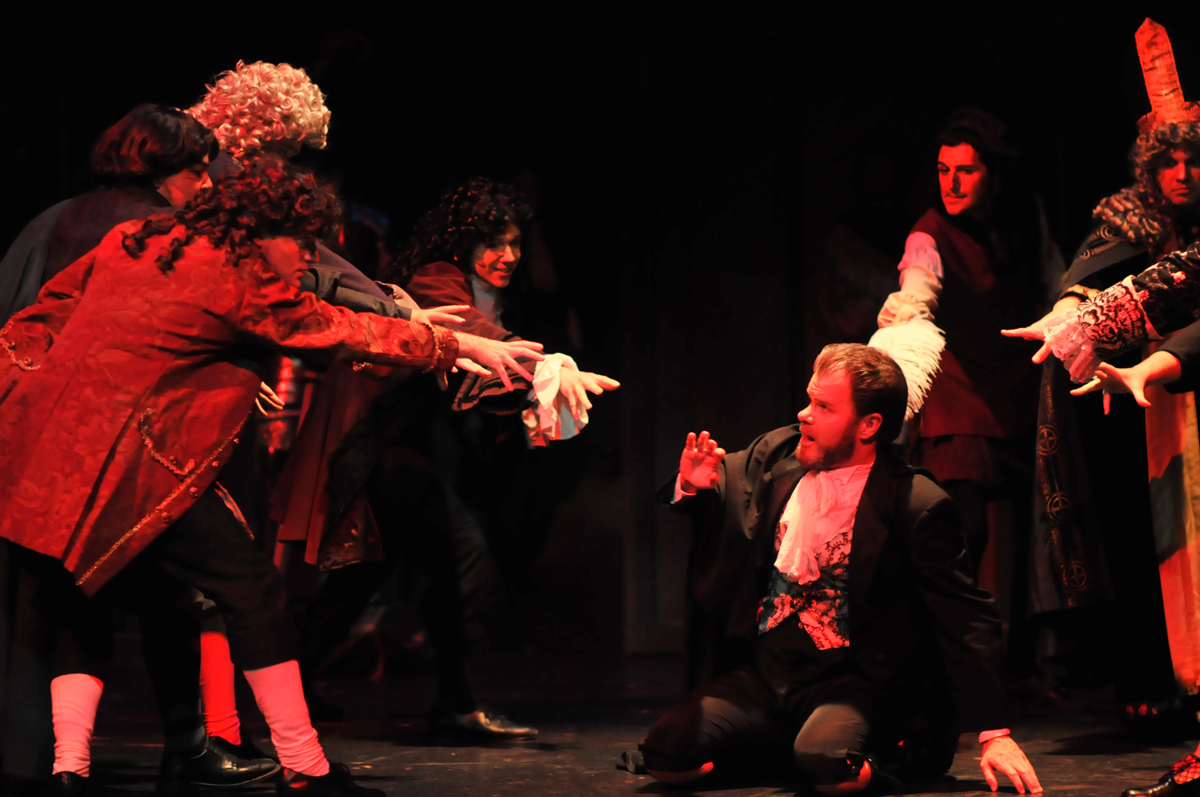
Ruddigore
(1887)
Music by Arthur Sullivan
Book & Lyrics by W. S. Gilbert
An early Baronet of Ruddigore had a witch burned at the stake — she cursed him and all his line, dooming them to commit at least one crime a day, under penalty of an agonizing death. Dame Hannah narrates this legend to professional bridesmaids, gathered around the cottage of Rose Maybud, an attractive young damsel who has not yet found a husband. Robin Oakapple, a young farmer, is in love with Rose, but too bashful to declare his passion. We learn through Adam, an old retainer, that Robin is really Sir Ruthven Murgatroyd, the true Baronet of Ruddigore, who had fled the curse, leaving it, with the title and estates, to his younger brother, Despard. His foster-brother, Richard Dauntless, just returned from sea, also knows Robin’s true identity. Learning of the deadlock in Robin’s love-affair, Richard volunteers to see Rose and clear up the situation. Instead, he too falls in love with her — a love that she readily accepts. But when Rose learns of Robin’s love for her, she promptly transfers her affections to him, remarking that while Richard is a penniless sailor, Robin is a prosperous farmer. Mad Margaret enters and reveals that she had once been in love with Despard, who laments his infamy, but notes that he atones for every bad action with a good one. Richard reveals to him that Ruthven is alive and masquerading as Robin Oakapple. Robin enters with his promised bride, but the wedding is rudely interrupted by the revelation that Robin is really the baronet. Rose promptly offers herself to Despard, who declares that he, being no longer the bad baronet but a virtuous person, will be true to Mad Margaret. Rose, not at all abashed, once more falls back on Richard. In the picture gallery of Ruddigore Castle, portraits of his ancestors look grimly down upon a sadly changed Robin/Ruthven. Richard and Rose obtain consent to their marriage from Ruthven, who makes an impassioned appeal that his ancestors relieve him of the necessity of a daily crime. Stepping down from their frames, and led by his uncle Roderic, they accuse him of evading the terms of the curse, and order him to do something really wicked — carry off a maiden that very day. When he refuses, they give him a sample of the “agonies” that they can inflict — Ruthven is compelled to yield, and orders Adam to go at once and bring him a maiden — any maiden! A reformed Despard and Margaret now appear, soberly attired, and describe themselves as district visitors engaged in charitable activities. They have come to implore Ruthven to forswear his wicked ways — he agrees to do so. Adam enters with the “maiden” he was sent to abduct, who turns out to be none other than the mature Dame Hannah, who proves so well able to protect herself that Ruthven has to call upon his Uncle Roderic for help. Roderic steps down from his frame, and we learn that he and Hannah were once lovers. Their reunion is interrupted by the excited entrance of Ruthven — he has the solution to his dilemma. Pointing out that his refusal to fulfill the terms of the curse amounts to suicide…and as suicide is itself a crime…it follows that the curse in inoperative! Roderic declares himself still alive, Rose at once becomes the bride of the reformed Ruthven, Richard appropriates the chief bridesmaid, and all ends in general rejoicing.
Conductor: Michael Borowitz
Stage Director: Julie Wright
Choreography: Carol Hageman
Costume Design: Eric Hall
Scenic Design: Richard Traubner
Lighting Design: Paul R. Bourne
Assistant Director: Jacob Allen
Sir Ruthven Murgatroyd,Disguised as Robin Oakapple, A Young Farmer Ted Christopher
Richard Dauntless, His Foster Brother, A Man-o’-wars Man Anthony Buck
Sir Despard Murgatroyd Of Ruddigore, A Wicked Baronet Frederick Reeder
Old Adam Goodheart, Robin’s Faithful Servant Cory Clines
Rose Maybud, A Village Maiden Cecily Ellis
Mad Margaret Sahara Glasener-Boles
Dame Hannah, Rose’s Aunt Jessie Wright Martin
Zorah, A Professional Bridesmaid Karla Hughes
Ruth, A Professional Bridesmaid Courtney Miller
Sir Roderic Murgatroyd, The Twenty-first Baronet Dennis Jesse
Ensemble: Jacob Allen, Chelsea Basler, Ashly Evans, Karla Hughes, Dennis Jesse, David Kelleher-Flight, Kyle Knapp, Jacqueline Komos, Tania Mandzy, Philip McLeod, Courtney Miller, Sara Ann Mitchell, Gary Moss, Zack Rabin, Galeano Salas, Todd Strange, Nina Takács, Raina Thorne, Allison Toth
2008 Season
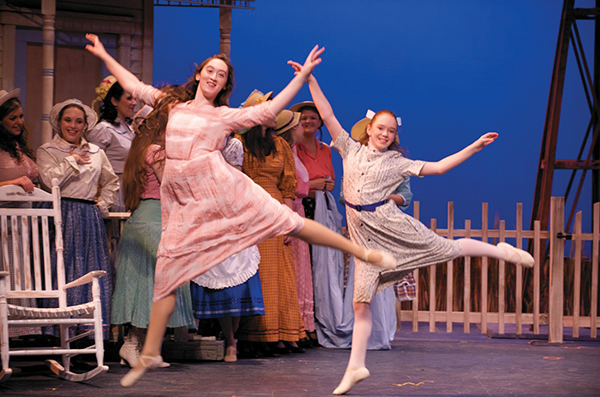
Oklahoma!
(1943)
Music by RICHARD RODGERS
Lyrics by OSCAR HAMMERSTEIN II
Cowhand Curly arrives at Aunt Eller’s farmhouse to invite her niece, Laurey, to the box-social. After confessing that his promise of a fringed surrey is but a figment of his imagination, Laurey’s stubborn pride gets the better of her fondness for Curly; she decides to go instead with the surly hired hand, Jud. Meanwhile, Will Parker has returned from Kansas City with a roping prize of $50, just what Ado Annie’s father requires of Will before he can marry his daughter, who, in Will’s absence, has succumbed to the “charms” of the quick-talking peddler, Ali Hakim. Curly visits Jud in the smokehouse and tries to convince him to hang himself; he would then get all the sympathy and respect that have been denied him. Deciding, after all, to attend the social with Curly, Laurey has another change of heart after a dream in which Jud, in a fit of jealousy, beats up her lover. When Curly outbids Jud for Laurey’s picnic hamper, she becomes frightened by Jud’s aggressive attempt at courtship and fires him. After squandering his $50 more than once, Will finally succeeds in regaining it; Ado Annie is finally his, although the flighty girl’s goodbye to Ali Hakim is a little more spirited than suits Will. Three weeks later, as citizens celebrate the approaching statehood of Oklahoma, Curly and Laurey are married, but their wedding night is interrupted by a drunken, knife-wielding Jud. In the ensuing fight, Jud is killed and Curly faces arrest and trial…
Curly Nathan Brian* Jeff MacMullen**
Laurey Diana Becker* Lindsay O’Neil**
Ado Annie Amanda Opuszynski* Rebecca Spence**
Will Parker Ben Robinson* Paul Hopper**
Jud Gary Moss* Paul Hindemith**
Aunt Eller Carissa Kett* Holly White**
Ali Hakim Jon Gerhard
Cord Elam Mark Snyder
Kate Erica Post
Andrew Carnes Anthony Buck
Skidmore Kyle Knapp
Ellen Amanda Dahlin
Vivian Kelly Dainton
Gertie Natalie Easter
Virginia Ashly Evans
Slim Shane Kingston Magargal
Fred Marten Dollinger
Ike Stefan Gordon
Mike Jarvis Wyche
Joe Joe Lenehan
*June 20, 29, July 8, 17, 20, 30, August 5
**June 27, July 3, 10, 19, 24, 31, August 6
Women of the Ensemble: Chelsea Basler, Diana Becker, Amanda Dahlin, Kelly Dainton, Natalie Easter, Ashly Evans, Sahara Glasener-Boles, Karla Hughes, Carissa Kett, Tania Mandzy, Rhea Miller, Lindsay O’Neil, Amanda Opuszynski, Erica Post, Rebecca Spence, Allison Toth, and Holly White
Men of the Ensemble: Nathan Brian, Anthony Buck, Marten Dollinger, Jon Gerhard, Stefan Gordon, Paul Hindemith, Paul Hopper, Kyle Knapp, Joe Lenehan, Jeff MacMullen, Shane Kingston Magargal, Philip McLeod, Gary Moss, Ben Robinson, Mark Snyder, and Jarvis Wyche.
Dancers: Sarah Huttie, Danielle Morris, Emily Neill, and Monica Wacker.

The Desert Song
(1926)
Music by Sigmund Romberg
Lyrics by Otto Harbach, Oscar Hammerstein II, and Frank Mandel
Adamantly opposed to the French occupation of their North African homeland, the Riffs are led in their rebellion by the mysterious Red Shadow, who appears, guides them in battle, and then disappears. Their successes have been fewer since Captain Paul Fontaine has assumed command of the French forces. Fontaine is engaged to Margot Bonvalet and has promised, as a wedding present, to eliminate the Red Shadow as a threat. The Red Shadow is actually Pierre, the son of General Birabeau, the French provincial governor. Eight years before, to impress Margot, Pierre had left Paris and joined the French army in North Africa. When he refused an order to carry out a pointless raid on a local village, he was slapped by the governor, Fontaine’s father, and forced to resign in disgrace. To avenge this insult and stamp out French cruelty, he began his masquerade as the Red Shadow, all the while living day-to-day as the milksop son of General Birabeau. Society columnist turned bungling war correspondent Benjamin Kidd is captured by the Riffs and, in return for his freedom, ordered to spy on the French. He has little time for his clinging secretary, Susan, who just doesn’t have “It.” Seeing little chance of winning Margot’s hand as Pierre, the Red Shadow dons his costume and carries her off to a desert hideout. When the jealous dancing girl, Azuri — once Fontaine’s love interest — leads Birabeau to the hideout, Pierre is unable to draw his sword against his own father. The betrayed Riffs turn him out to the desert to die…
Pierre Birabeau/Red Shadow Dennis Jesse* Nathan Brian**
Margot Bonvalet Amanda Kingston* Chelsea Basler**
Susan Amanda Opuszynski* Sahara Glasener-Boles**
Benjamin Kidd (Bennie Jacob Allen* Anthony Buck**
Captain Paul Fontaine Paul Hindemith
General Birabeau Mark Snyder
Azuri Ashly Evans
Sid El Kar Kyle Knapp* Todd Strange**
Hassi Philip McLeod
Mindar Jarvis Wyche
Ali Ben Ali Gary Moss
Clementina Karla Hughes
Old Man Jon Gerhard
Edith Tania Mandzy
Neri Paul Hopper
Lieutenant La Vergne Marten Dollinger
Sergeant Du Bassac Stefan Gordon
A Soldier David Kelleher-Flight
A Guard Jeff MacMullen
*June 21, July 6, 12, 24, 30
**June 27, July 10, 18, 26, August 9
Women of the Ensemble: Chelsea Basler, Diana Becker, Amanda Dahlin, Kelly Dainton, Natalie Easter, Ashly Evans, Robin Farnsley, Sahara Glasener-Boles, Karla Hughes, Amanda Kingston, Tania Mandzy, Jessie Wright Martin, Rhea Miller, Lindsay O’Neil, Amanda Opuszynski, Erica Post, Rebecca Spence, and Allison Toth
Men of the Ensemble: Jacob Allen, Nathan Brian, Anthony Buck, Marten Dollinger, Jon Gerhard, Stefan Gordon, Paul Hindemith, Paul Hopper, Dennis Jesse, David Kelleher-Flight, Kyle Knapp, Joey Lenehan, Boyd Mackus, Jeff MacMullen, Philip McLeod, Gary Moss, Ben Robinson, Todd Strange, Mark Snyder, and Jarvis Wyche

The Mikado
(1885)
Words by William S. Gilbert
Music by Arthur S. Sullivan
The noble lord Pish-Tush relates that, under theMikado’s law, the tailor Ko-Ko has been condemned to death for flirting, but has been reprieved at the last moment and appointed Lord High Executioner of Titipu. All other duties will be assumed by Pooh-Bah, the Lord High Everything Else. Ko-Ko is betrothed to his ward Yum-Yum, but she has fallen in love with the strolling musician Nanki-Poo. She and her sisters, Peep-Bo and Pitti-Sing, have recently left the confines of the ladies’ seminary, see life as a source of fun, and wonder what the world has in store for them. Nanki-Poo reveals to Yum-Yum that he is, in fact, the Mikado’s son and has fled from court to escape the marital ambitions of the elderly Katisha. The Mikado sends word of his displeasure that no executions have yet taken place in Titipu, and orders that the situation be rectified soon. Nanki-Poo, in despair and on the verge of suicide because he cannot marry Yum-Yum, agrees to be executed in a month, provided that he can marry her in the meantime. Ko-Ko cannot bring himself to kill anyone; he falsifies an affidavit of execution. TheMikado, accompanied by Katisha, arrives in Titipu in search of his son. When Katisha sees Nanki-Poo’s name on the affidavit, the Mikado condemns Ko-Ko to death for compassing the death of the heir-apparent. It is only after Ko-Ko persuades Katisha to love him, she pleads for mercy with the Mikado, and emperor and son are reunited that all ends happily in Titipu
Conductor: J. Lynn Thompson
Stage Director/Performer: Frederick Reeder
Choreographer: Carol Hageman
Set Designer: Kirk Domer
Costume Designer: Charlene Gross
Lighting Designer: Krystal Kennel
Assistant Director: Stephen Carr
Accompanist and Coach: Wilson Southerland
The Mikado of Japan David Kelleher-Flight* Jacob Allen**
Nanki-Poo, His Son, disguised as a wandering minstrel, and in love with Yum-Yum Kyle Knapp* Ben Robinson**
Ko-Ko, Lord High Executioner of Titipu Frederick Reeder
Pooh-Bah, Lord High Everything Else Dennis Jesse* Gary Moss**
Pish-Tush, A Noble Lord Boyd Mackus* Jeff MacMullen**
Three Sisters, Wards of Ko-Ko
Yum-Yum, engaged to Ko-Ko Karla Hughes* Rhea Miller**
Pitti-Sing, A Ward of Ko-Ko Jessie Wright Martin* Tania Mandzy**
Peep-Bo, A Ward of Ko-Ko Erica Post
Katisha, An Elderly Lady, in love with Nanki-Poo Julie Wright* Holly White**
*June 24, July 3, 13, August 1
**June 28, July 5, 18, August 7
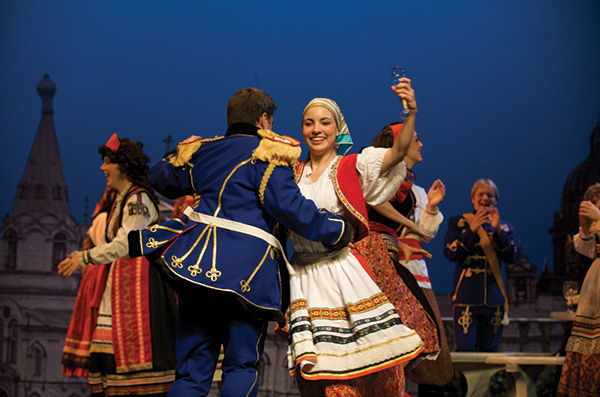
The Czarevitch
(1927)
Music by Franz Lehár
Lyrics by Béla Jenbach and Heinz Reichert
English Version by Adam Carstairs
Aljoscha, the son of Russia’s czar, has grown up with an intense distrust of society and a dislike of women. As the curtain rises, he laments his intense loneliness and inner torment, begging for angelic intervention. Aljoscha’s valet Ivan and his wife Mascha are continually bickering, very much in love, but each with a flirtatious and wandering eye. For political reasons, the time has come for the czarevitch to marry. The Prime Minister has resorted to a subterfuge in order to heighten his interest in the female sex — the male dancers called in to entertain Aljoscha are really women in disguise. When his eyes alight on one in particular, arrangements are made for the disguised dancer, Sonia, to meet privately with the czarevitch. She contemplates her destiny, wondering whether the young prince might unlock the passion within her. Upon discovering her identity, Aljoscha is furious, but agrees with her plan to play along with the ruse. By the time they finish a champagne dinner, he senses that his request for an angel has been granted and that he has now a new companion, different from any in the past. These feelings of friendship eventually turn to real love — a love that is threatened when his uncle convinces him that he is but one in a long string of lovers for Sonia. When she convinces him otherwise, the couple flees to Naples. Their idyllic life away from the Russian court is challenged when his uncle, the Grand Duke, appears and announces that the czar is dead and that duty calls…
Conductor: Michael Borowitz
Stage Director: Steven A. Daigle
Choreographer: Carol Hageman
Set Designer: Justin A. Miller
Costume Designer: Eric Hall
Lighting Designer: Shannon Schweitzer
Assistant Director: Jacob Allen and Stephen Carr
Accompanist and Coach: Wilson Southerland and Eric Andries
The Czarevitch, Aljoscha Todd Strange
Understudy for The Czarevitch, Aljoscha Kyle Knapp
Sonia, a young dancer Robin Farnsley
Ivan, the Czarevitch’s personal valet Jon Gerhard
Mascha, his wife Jessie Wright Martin
The Grand Duke Anthony Buck
The Prime Minister Jack Beetle
The Colonel-Adjutant David Kelleher-Flight
A Groom Jeff MacMullen
A Princess Rebecca Spence
A Countess Carissa Kett
An Officer Marten Dollinger
Olga Erica Post
Lina Lindsay O’Neil
Vera Rhea Miller
Bordolo Shane Kingston Magargal
1st Footman Philip McLeod
2nd Footman Jarvis Wyche
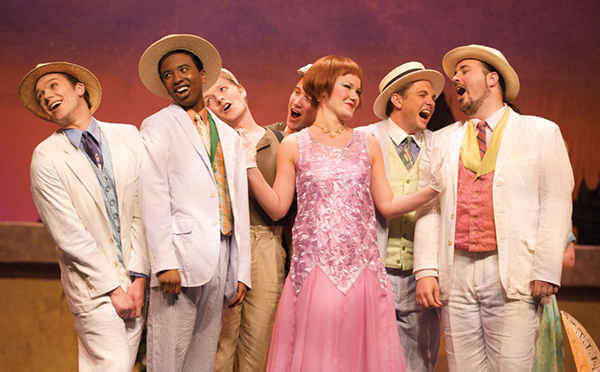
The Cabaret Girl
(1922)
Music by Jerome Kern
Lyrics by P. G. Wodehouse and George Grossmith
Jim Paradene arrives at the shop of London song publishers Gripps and Gravvins in search of a song to sing at the village concert. He stands to inherit a fortune from his father when he marries, but only if his choice of bride meets the approval of his doltish cousin, The Marquis of Harrogate, who is under the total control of his mother, the Marchioness of Harrogate. As Jim has his heart set on the chorus girl Marilynn Morgan, approval seems out of the question. Marilynn arrives at the shop to audition for the cabaret that the firm is staging. Jim suggests that she give up her unpromising career, marry him, and move to the country, even if it means that he forgo his inheritance. Marilynn wants to make it on her own — maybe they should part. Jim, however, has an idea — they can pretend to be married, disappear for a week, and then invite the Harrogates to a post-honeymoon party. In the celebratory atmosphere, with all the neighboring elite in attendance, theMarchioness will certainly be impressed and grant her approval, at which time they will go off and get married for real. Gravvins offers the use of his estate, but when it is discovered that all the neighbors are out of town, he rushes to enlist his cabaret troupe to impersonate the local notables. Gripps himself impersonates the vicar; the entire hoax is exposed only when the real vicar appears. By the time Marilynn and her troupe perform their mock-Hawaiian routine at the cabaret, both the Marchioness and her son are convinced that Marilynn and Jim are indeed meant for one another.
Conductor: Michael Borowitz
Stage Director: Steven A. Daigle
Choreographer: Carol Hageman
Set Designer: Tymberley Wittrig
Costume Designer: Charlene Gross
Lighting Designer: Krystal Kennel
Assistant Director: Stephen Carr
Accompanist & Vocal Coach: Wilson Southerland and Eric Andries
James Paradene Stefan Gordon
Marilynn Morgan Lindsay O’Neil
Partners in the Firm of Messrs. Gripps & Gravvins, Music Publishers
Mr. Gripps Jacob Allen
Mr. Gravvins Anthony Buck
Effie Dix Ashly Evans
Marchioness of Harrogate Julie Wright
Marquis of Harrogate, Her Son Ben Robinson
Members of the All Night Follies Cabaret Troupe
Harry Zona Jon Gerhard
March Kelly Dainton
April Natalie Easter
Little Ada Sahara Glasener-Boles
Lily de Jigger Karla Hughes
Feloosi, An Agent Gary Moss
Quipp, A Piano Tuner Paul Hopper
The Vicar of Woollam Chersey Jarvis Wyche
Mrs. Drawbridge, Housekeeper at The Pergola Holly White
Assistants at Gripps & Gravvins
Miss Simmons Tania Mandzy
Miss Field Holly White
Miss Witmore Amanda Dahlin
Miss Brownlow Rhea Miller
Miss Macbeth, also a piano player Robin Farnsley
Bernard Frankfurt Shane Kingston Magargal
Sir Claude Shane Kingston Magargal
Barnes Jarvis Wyche
Young Man Todd Strange
Kirkwood Todd Strange
Noyes Rhea Miller
Businessman Philip McLeod
Horton Philip McLeod
1st Girl Amanda Kingston
2nd Girl Chelsea Basler
3rd Girl Rhea Miller
4th Girl Tania Mandzy
5th Girl Allison Toth
Women of the Ensemble: Chelsea Basler, Amanda Dahlin, Kelly Dainton, Natalie Easter, Ashly Evans, Robin Farnsley, Sahara Glasener-Boles, Karla Hughes, Carissa Kett, Amanda Kingston, Tania Mandzy, Rhea Miller, Lindsay O’Neil, Erica Post, Rebecca Spence, Allison Toth, Holly White, and Julie Wright.
Men of the Ensemble: Jacob Allen, Anthony Buck, Marten Dollinger, Jon Gerhard, Stefan Gordon, Paul Hopper, Joey Lenehan, Shane Kingston Magargal, Philip McLeod, Gary Moss, Ben Robinson, Todd Strange, and Jarvis Wyche.
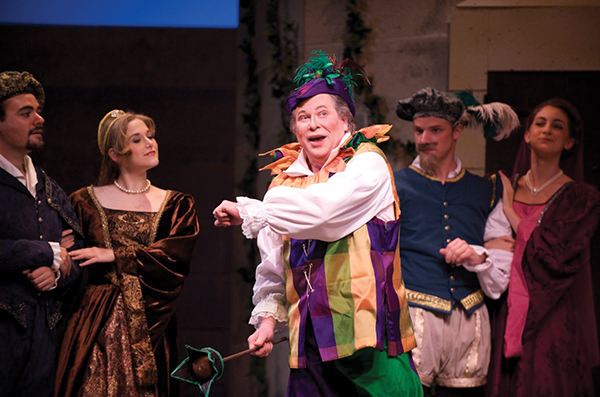
The Yeomen of the Guard
(1888)
Book by William S. Gilbert
Music by Arthur S. Sullivan
Phoebe, the daughter of Sergeant Meryll of the Yeomen of The Guard, irritates the jailer Wilfred when she ignores him and expresses pity for the jailed Captain Fairfax who, through an inheritance scam by a scheming relative, has been condemned to death for sorcery and is to be executed this very day at the Tower of London. Meryll concocts a plan whereby his son, Leonard, arriving to join the Yeomen, will go into hiding and be impersonated by a newly-shaven, beardless, unrecognizable Fairfax, thus providing time to seek a pardon. In order to thwart his unscrupulous kinsman, Fairfax begs Tower Lieutenant Cholmondely to find him a wife. Jester Jack Point and his intended bride, the strolling singer Elsie Maynard, arrive in town; the lieutenant confronts Elsie and, with the promise of 100 crowns and an assurance to Jack that her new husband will shortly be dead, Elsie is blindfolded, whisked away, and married to Fairfax. The plan goes awry when the condemned prisoner is discovered missing from his cell. Tower housekeeper Dame Carruthers, always with a matrimonial eye on Sergeant Meryll, reveals to Fairfax the identity of his wife. Point, desperate for Elsie’s affections, announces that Fairfax has been killed in an escape attempt. The “widow” Elsie is immediately wooed by both Point and Fairfax, the latter still posing as Leonard. When the real Leonard arrives with a pardon for Fairfax, Elsie discovers that her “Leonard” is really Fairfax and that she is already married to the man she loves. Jack Point falls insensible at their feet.
Conductor: J. Lynn Thompson
Stage Director: Julie Wright
Choreographer: Karla Hughes
Set Designer: Justin A. Miller
Costume Designer: Kristina Smith
Lighting Designer: Shannon Schweitzer
Assistant Director: Anthony Buck
Accompanist and Coach: Wilson Southerland
Sir Richard Cholmondely, Lieutenant of the Tower David Kelleher-Flight
Colonel Fairfax, under sentence of death Jack Beetle
Sergeant Meryll, of the Yeomen of the Guard Paul Hindemith
Leonard Meryll, his Son Kyle Knapp
Jack Point, a Strolling Jester Fred Reeder
Wilfred Shadbolt, Head Jailer and Assistant Tormenter Gary Moss
The Headsman Nathan Brian
First Yeoman Shane Kingston Magargal
Second Yeoman Stefan Gordon
First Citizen Jeff MacMullen
Second Citizen Philip McLeod
Elsie Maynard, a Strolling Singer Robin Farnsley
Phoebe Meryll, Sergeant Meryll’s Daughter Sahara Glasener-Boles
Dame Carruthers, Housekeeper to the Tower Carissa Kett
Kate, her Niece Natalie Easter
Women of the Ensemble: Chelsea Basler, Diana Becker, Amanda Dahlin, Natalie Easter, Ashly Evans, Carissa Kett, Amanda Kingston, Tania Mandzy, Rhea Miller, Amanda Opuszynski, Erica Post, and Allison Toth.
Men of the Ensemble: Nathan Brian, Marten Dollinger, Stefan Gordon, Paul Hopper, Joey Lenehan, Jeff MacMullen, Shane Kingston Magargal, Philip McLeod, Ben Robinson, and Jarvis Wyche.
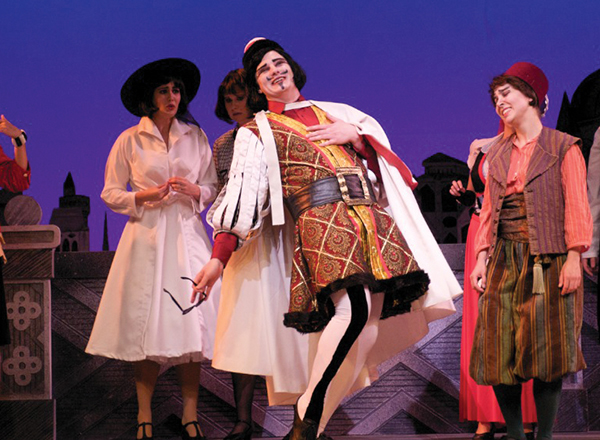
L’étoile
(1877)
Music by Emmanuel Chabrier
Libretto by Eugène Leterrier and Albert Vanloo
English version by Robert Ackart and Gene Boucher
For the public execution that traditionally is the high point of his birthday celebration, the disguised King Ouf tries, but fails, to elicit anti-government remarks from his citizens. To satisfy a constitutional requirement that he marry, Ouf has selected as his bride the neighboring Princess Laoula, who arrives accompanied by Ambassador Hérisson, his wife Aloès, and his secretary Tapioca. Enroute, Laoula has caught the eye of the young peddler, Lazuli, who sinks into despair when Hérisson, to provide diplomatic confusion, refers to Laoula as his wife. Lazuli vents his dissatisfaction with the government to a passing stranger, the incognito King, who now has found his victim. As Lazuli is about to be tortured, Ouf’s astrologer, Siroco, rushes in to inform the King that one day after Lazuli dies, so too will the King, and — according to the clever King’s will — 15 minutes later, Siroco himself must die. Ouf cancels the execution and leads Lazuli in full splendor to his palace. The thoroughly pampered Lazuli wants only to escape and win the hand of Laoula. Toward this end, he challenges Hérisson to a dual. When the pompous ambassador arrives, Ouf has him arrested and inadvertently helps Laoula and Lazuli to elope. When Lazuli is presumed drowned, and thus their own lives are jeopardized, Ouf and Siroco try to allay their anxiety by turning back the hands of the clock and imbibing a little chartreuse. With Ouf’s heart still set on Laoula, Lazuli threatens suicide. The King, recalling Siroco’s deadly forecast, decides to forgo his own matrimonial happiness. He names Lazuli his heir, happy in the knowledge that the young boy is destined to predecease him by 24 hours.
Conductor: Michael Borowitz
Stage Director: Julie Wright
Choreographer: Carol Hageman
Set Designer: Kimberly V. Cox
Costume Designer: Eric Hall
Lighting Designer: Krystal Kennel
Assistant Director: Jacob Allen
Accompanist and Coach: Wilson Southerland
King Ouf the First Jack Beetle
Siroco, Astrologer David Kelleher-Flight
Prince Hérisson de Porc Épic, Ambassador Anthony Buck
Princess Laoula, His ward Chelsea Basler
Aloès, His wife Jessie Wright Martin
Tapioca, His secretary Jon Gerhard
Lazuli, A peddler Tania Mandzy
The Chief of Police Spiro Matsos
Women of the Ensemble: Diana Becker, Amanda Dahlin, Kelly Dainton, Natalie Easter, Sahara Glasener-Boles, Carissa Kett, Amanda Kingston, Lindsay O’Neil, Amanda Opuszynski, Erica Post, Rebecca Spence, Allison Toth, and Holly White.
Men of the Ensemble: Nathan Brian, Marten Dollinger, Paul Hindemith, Paul Hopper, Kyle Knapp, Jeff MacMullen, Shane Kingston Magargal, Spiro Matsos, Todd Strange, and Jarvis Wyche.
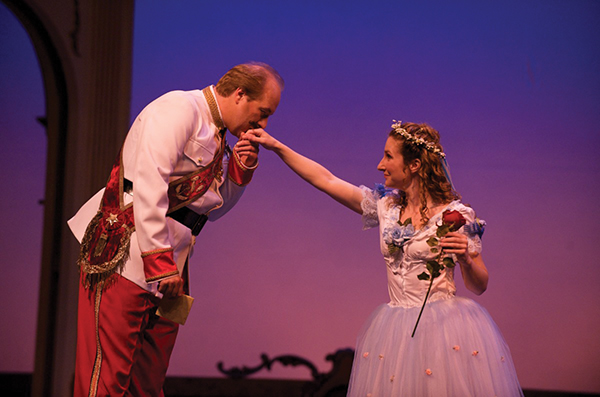
Marinka: The Mayerling Story
(1945)
Music by Emmerich Kálmán
Lyrics by George Marion, Jr. and Karl Farkas
New Adaptation by Steven A. Daigle
New orchestrations reconstructed from the 1945 composer manuscript /vocal score by Edward Schweibacher
Tourists at Vienna’s Schönbrunn Palace in the 1930’s inquire about the love affair, half a century earlier, between Crown Prince Rudolph and the teenaged Marie Vetsera. An old woman, with uncanny knowledge of the affair, begins to reminisce as the scene slowly dissolves to reveal the Vienna of 1888. Rudolph, the son of Emperor Franz Josef, pleads with his father for greater involvement in the affairs of state. Franz Josef chastises his son for his sordid affairs that have taken him away from his duty as a husband and father. Rudolph, informed that his former paramour, Countess Landowska, has written a politically damaging book, is determined to stop its publication. At the debutante presentation ceremony, Rudolph meets the young countess, Marie Vetsera (nicknamed Marinka), and invites her for a private meeting at his hunting lodge at Mayerling. His increasing feelings for Marie are tempered when he receives a visit from Lieutenant Baltatzy, who claims to be Marie’s fiancé. She convinces Rudolph otherwise as they fall into each other’s arms, watched all the time by the scheming lieutenant. Marie is summoned before the Emperor, whose spies have informed him of the budding relationship. He convinces Marie that she must leave Rudolph forever; otherwise, the Prince would be forced to abdicate, an option that the Empire will not tolerate. Rudolph’s appeal to the Pope for annulment of his current marriage and his alignment with Hungary in defying his father’s outdated policies serve only to heighten the tension between father and son and the romance between the two lovers. What choice do they have?
Conductor: Michael Borowitz
Stage Director: Steven A. Daigle
Choreographer: Carol Hageman
Set Designer: Kimberly V. Cox
Costume Designer: Charlene Gross
Lighting Designer: Shannon Schweitzer
Assistant Director: Robin Farnsley
Accompanist and Coach: Wilson Southerland
Marie “Marinka” Alexandrine Freiin von Vetsera, seventeen years old Amanda Kingston
Crown Prince Rudolph Dennis Jesse
Tilly, prima ballerina – daughter of Bratfisch Karla Hughes
Francis Joseph Lobkowitz, nephew of Count Lobkowitz, from San Francisco Jeff MacMullen
Countess Landowska, former mistress of Prince Rudolph Julie Wright
Bratfisch, Rudolph’s cab driver, Vienna celebrity Todd Strange
Emperor Franz Josef Fred Reeder
Count Lobkowitz, Court chamberlain Jacob Allen
Count Hoyos, leader of the Hungarian resistance Nathan Brian
Tour Director Holly White
Tourist 1 Lindsay O’Neil
Tourist 2 David Kelleher-Flight
Tourist 3 Natalie Easter
Tourist 4 Shane Kingston Magargal
Tourist 5 Diana Becker
Old Woman Karla Hughes
Servant Jack Beetle
Lieutenant Stefan Baltatzy, engaged to Maria Stefan Gordon
Madame Sacher Jessie Wright Martin
Waitress Natalie Easter
Doorman Mark Snyder
Head Waiter Spiro Matsos
Old Francis Jeff MacMullen
Bratfisch Jr Michael Lucas
Helena Margareta Ringhoffer Rhea Miller
Hedwige von Maedchensprung von Diefendorfer Sahara Glasener-Boles
Katharina Cecilia Berta von Obergurgl Chelsea Basler
Clara Annunziata Trautmannsdorf Kelly Dainton
Anna Thun-Salm Rebecca Spence
Veronica Leotine von Bopp Diana Becker
Franziska Sophia von Windischgraetz Lindsay O’Neil
Women of the Ensemble: Chelsea Basler, Diana Becker, Kelly Dainton, Natalie Easter, Sahara Glasener-Boles, Karla Hughes, Amanda Kingston, Jessie Wright Martin, Rhea Miller, Lindsay O’Neil, Amanda Opuszynski, Rebecca Spence, Holly White, and Julie Wright.
Men of the Ensemble: Jacob Allen, Jack Beetle, Nathan Brian, Jon Gerhard, Stefan Gordon, Paul Hopper, Dennis Jesse, David Kelleher- Flight, Jeff MacMullen, Shane Kingston Magargal, Philip McLeod, Fred Reeder, Ben Robinson, Mark Snyder, and Todd Strange.
2007 Season
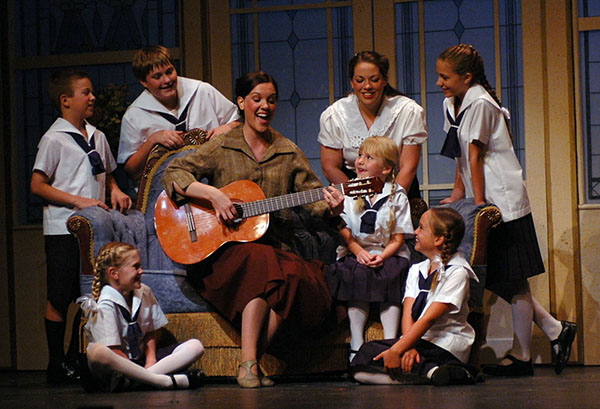
The Sound of Music
(1959)
Music by RICHARD RODGERS
Lyrics by OSCAR HAMMERSTEIN II
Book by HOWARD LINDSAY and RUSSEL CROUSE
Suggested by “The Story of the Trapp Family Singers”
Maria is a nun at an abbey in 1938 Austria, but her personality doesn’t fit the lifestyle practiced within its walls. The Mother Abbess sends her to be governess for the recently widowed Captain von Trapp. Although she quickly wins over his seven children, awakens romantic feelings in him, and strange new feelings in herself, she is confused by these emotions and flees back to the convent. The children are very distraught, especially as their father is to wed the wealthy, not very kind Elsa Schrader. The Abbess decides that Maria should not use the convent as an escape from the world and orders that she return as governess. Elsa, meanwhile, breaks off her engagement to von Trapp because of his refusal to accept the encroaching German position. Maria and von Trapp are married, but when offered a commission in the German navy, he realizes that he and his family can no longer remain in Austria. Under the pretense of an entertainment at a local festival, the family manages to escape the clutches of Nazi soldiers and, with the help of nuns in the abbey and the conscience-stricken former boyfriend of the oldest von Trapp daughter, to find its way to safety through the mountains into Switzerland.
Conductor: Michael Borowitz
Director: Julie Wright
Choreographer: Carol Hageman
Set Designer: Tymberley Wittrig
Costume Designers: Charlene Gross and Myron Elliott
Lighting Designer: Shannon Schweitzer
Assistant Conductor: Nathaniel Motta
Assistant Director: Sandra Ross
Maria Rainer, a Postulant at Nonnberg Abbey Kemper LeCroy-Florin* Analisa Leaming**
Sister Berthe, Mistress of Novices Sahara Glasener-Boles
Sister Margaretta, Mistress of Postulants Stina Eberhardt
The Mother Abbess Carissa Kett
Sister Sophia Kathryn McCreary
Captain Georg von Trapp Ted Christopher
Franz, the butler Brian Tanner
Frau Schmidt, the housekeeper Jessie Wright Martin
The Children of Captain von Trapp:
Liesl, age 16 Karla Hughes*Amanda Opuszynski**
Friedrich, age 14 Thomas Fitz Gibbon, Michael Lucas
Louisa, age 13 Jennica Dotson, Ali Jaeb
Kurt, age 10 Harper Baddley, Scott Perkins
Brigitta, age 9 Anna Kitzmiller, Amanda Vogel
Marta, age 7 Ella Hayward-Lara, Rachel Lynn
Gretl, the youngest Taylor Mills, Jennifer Vicknair, Jillian Vicknair
Rolf Gruber, age 17 Benjamin Robinson
Elsa Schraeder Robin Farnsley* Julie Wright**
Ursula Diana Becker
Max Detweiler Mark Snyder
Herr Zeller Paul Hindemith
Baron Elberfeld Seth Kershisnik
Baroness Elberfeld Amanda Kingston
A Postulant Laura Riggs
Admiral von Schreiber Nicholas Hartley
Festival Performers Brian Tanner, Jessie Wright Martin, Seth Kershisnik
*June 22, 30, July 7, 13, 20, August 1, 8, 11
**June 28, July 5, 10, 15, 25, 29, August 3
Women of the Ensemble: Sarah Asmar, Diana Becker, Stina Eberhardt, Cecily Ellis, Sahara Glasener-Boles, Amanda Kingston, Jessie Wright Martin, Kathryn McCreary, Laura Riggs and Sarah Warrick.
Men of the Ensemble: Jack Beetle, Michael Denos, Nicholas Hartley, Paul Hindemith, Seth Kershisnik and Brian Tanner.
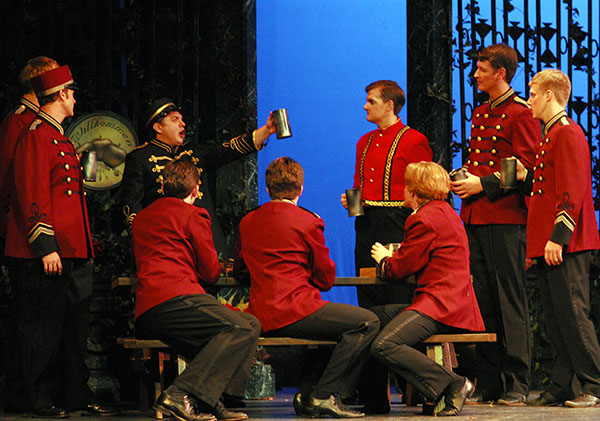
The Student Prince
(1924)
Music by Sigmund Romberg
Book and Lyrics by Dorothy Donnelly
Prince Karl Franz, grandson of the King of Karlsberg, has left his restricted life and, accompanied by his tutor Dr. Engel and pompous valet Lutz, begins a year of study, incognito, at Heidelberg University. Upon his arrival, he is charmed by the sights and sounds of student revelry and by the waitress Kathie, the niece of the proprietor of the Inn of the Three Golden Apples. A visit from Karlsberg’s Princess Margaret, to whom he is betrothed by the wish of his dynastically minded grandfather, convinces Karl Franz that he and Kathie, now deeply in love, must escape together to Paris. News arrives, however, that the King is dying and that Karl Franz must return to Karlsberg. He promises Kathie that he will return, but she knows better. Two years pass, and Karl Franz is now King, although he has managed to delay his marriage to Margaret. Word reaches him that Kathie spends all her time weeping in her room. The king must return to Heidelberg. His arrival is preceded by that of Princess Margaret, who convinces Kathie of the sacrifice that she must make for the royal cause. When she confronts the arriving King, Kathie tells him, holding back the tears, that although she will always remember him, she is going back to her hometown to wed the fiancé of her younger days.
Conductor: J. Lynn Thompson
Director: Ted Christopher
Choreographer: Carol Hageman
Scene Design: Kirk Domer
Costume Designer: Myron Elliott
Lighting Designer: Krystal Kennel
Assistant Conductor: Nathaniel Motta
Assistant Director: Stephen Carr
Original Concept: Billy Wilburn
Doctor Engel Boyd Mackus
Prince Karl Franz Grant Knox* Josh Kohl**
Gretchen Sahara Glasener-Boles
Ruder Gary Moss
Count Hugo Detlef Todd Strange
Von Asterberg Peter Foltz
Lucas David Kelleher-Flight
Kathie Robin Farnsley* Sarah Asmar**
Princess Margaret Kemper LeCroy-Florin* Diana Becker**
Captain Tarnitz Patrick Howle
Prime Minister Von Mark Mark Snyder
Toni Spiro Matsos
Lutz Frederick Reeder
Hubert Brian Tanner
Grand Duchess Anastasia Sandra Ross* Carissa Kett**
Baron Arnheim Seth Kershisnik
Countess Leyden Analisa Leaming
Lackeys Ben Robinson, Anthony Buck, Michael Denos and Brian Tanner
*June 23, July 1, 7, 17, 22, August 1, 10
**June 29, July 5, 11, 19, 26, August 2
Women of the Ensemble: Cecily Ellis, Sahara Glasener-Boles, Karla Hughes, Analisa Leaming, Kathryn McCreary, Amanda Opuszynski and Laura Riggs.
Men of the Ensemble: Jacob Allen, Anthony Buck, Michael Denos, Peter Foltz, Nicholas Hartley, David Kelleher-Flight, Seth Kershisnik, Spiro Matsos, Gary Moss, Benjamin Robinson, Mark Snyder, Todd Strange and Brian Tanner
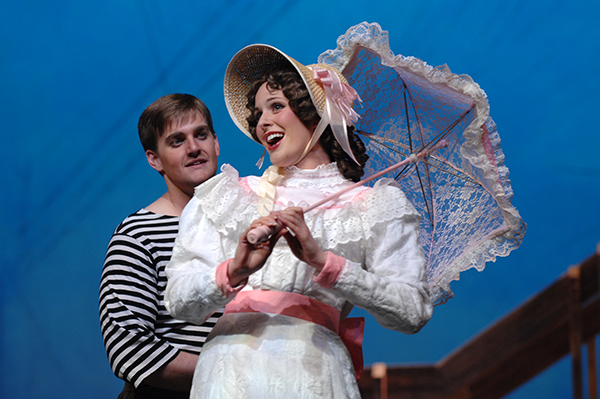
The Pirates of Penzance
(1879)
Music by Sir Arthur Sullivan
Words by William S. Gilbert
Because his hard-of-hearing nursemaid Ruth misunderstood his father’s request that his son become an apprentice to a pilot, Frederic has spent his childhood years as apprentice to a pirate. He will soon come of age and, although he dearly loves his shipmates, finds their profession atrocious and will devote his adult life to their extermination. Although he has never seen a woman other than Ruth, he has a hard time believing that he couldn’t do better with someone 30 years younger. He finds that someone in Mabel, the daughter of Major-General Stanley. Just as Frederic is about to lead a mission to bring down the pirates, it is revealed that, because he was born on February 29, he is really only five years old and must remain loyal to the pirates, much to the dismay of Mabel, whose father is under siege by the pirate crew. The pirates defeat the policemen, but submit when called upon to do so in Queen Victoria’s name. Ruth reveals that the pirates are all noblemen who have “gone wrong,” and General Stanley orders them to be released to resume their former positions. The pirates marry the General’s daughters and Mabel and Frederic are united.
Conductor: J. Lynn Thompson
Director: Frederick Reeder
Choreographer: Carol Hageman
Set Designer: Kirk Domer
Costume Designer: Charlene Gross
Lighting Designer: Shannon Schweitzer
Assistant Conductor: Nathaniel Motta
Major-General Stanley Frederick Reeder
The Pirate King Boyd Mackus* Gary Moss**
Samuel, His Lieutenant David Kelleher-Flight
Frederic, The Pirate Apprentice Todd Strange* Josh Kohl**
Sergeant of Police Paul Hindemith
Major-General Stanley’s Daughters
Mabel Sarah Asmar* Amanda Kingston**
Edith Cecily Ellis
Kate Laura Riggs
Isabel Kathryn McCreary
Ruth, Pirate Maid-of-all-work Stina Eberhardt* Carissa Kett**
*June 26, July 6, 12, 18, August 4
**June 30, July 8, 14, 27, August 9
Women of the Ensemble: Diana Becker, Cecily Ellis, Sahara Glasener-Boles, Karla Hughes, Danielle Knox, Kemper LeCroy-Florin, Kathryn McCreary, Amanda Opuszynski, Laura Riggs and Suzanne Woods.
Men of the Ensemble: Jacob Allen, Jack Beetle, Anthony Buck, Michael Denos, Peter Foltz, Nicholas Hartley, Paul Hindemith, Patrick Howle, David Kelleher-Flight, Grant Knox and Seth Kershisnik.
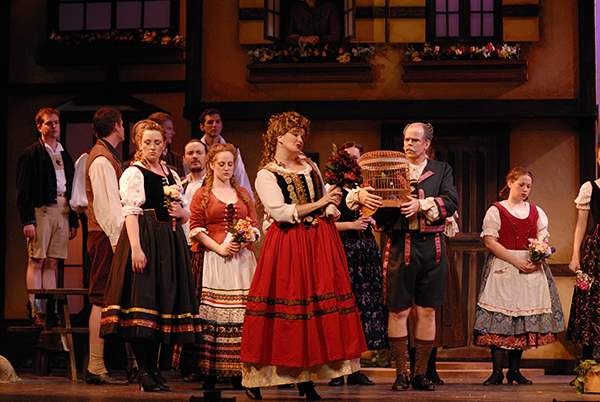
Der Vogelhändler
(1891)
Music by Carl Zeller
Lyrics by M. West and L. Held
English Translation by Harold S. Pepper with Additional Lyrics by James Stuart
Der Vogelhändler is the story of a boyish Tyrolean birdseller, Adam, who is anxious to marry Christel, the village postmistress. She goes to the Prince to secure for him the post of Royal Menagerie Keeper, but does not know that His Royal Highness is being impersonated by the swindler and ladies’ man, Stanislaus, who has concocted a complex plan to pay off his heavy debt. Adam, unaware of Christel’s good intentions, becomes furious when he sees her in the pavilion with the supposed Prince and, even more so, when Christel gives the Prince the bouquet that Adam had just presented to her. The actual Princess, disguised as a peasant girl Marie, offers to Adam her bouquet, which in the Tyrol, he reminds her, means that she has given him her heart as well. After an examination by two eccentric and admittedly unscrupulous professors, Adam is offered the menagerie position. Despite Christel’s pleas that she has not been unfaithful, Adam decides that she should marry Stanislaus, an option that she resists. Only after the Princess assures Christel that she, Marie, is no threat to her does the mail girl finally reunite with Adam.
Conductor: Nathaniel Motta
Director: Ted Christopher
Choreographer: Carol Hageman
Set Designer: Shelly Barish
Costume Designer: Charlene Gross
Lighting Designer: Dave Stoughton
Assistant Director: Stephen Carr
The Princess Marie Julie Wright* Suzanne Woods**
Countess Adelaide Sandra Ross
Countess Mimi, a Lady in Waiting Stina Eberhardt
Christel, the Postmistress Robin Farnsley* Karla Hughes**
Adam, the Birdseller Josh Kohl* Peter Foltz**
Baron Weps Paul Hindemith
Count Stanislaus Jack Beetle* Todd Strange**
Schneck Mark Snyder
The Prince Karl Ludwig Boyd Mackus
Baron Sylvester, his Aide-de-Camp David Kelleher-Flight
Süffle, Professor of Zoology Brian Tanner
Würmchen, Professor of Ornithology Nicholas Hartley
Mother Nebel, Landlady at the Village Inn Jessie Wright Martin
Heidi, Waitress Amanda Opuszynski
Emmerenz Diana Becker
Willing Michael Denos
Weinleber Benjamin Robinson
Magerl Jacob Allen
Gundel, Court Usher Joey Lenehan
Hofer Seth Kershisnik
*June 27, July 6, 19, 26
**July 13, 21, August 3, 7
Women of the Ensemble: Sarah Asmar, Diana Becker, Stina Eberhardt, Cecily Ellis, Sahara Glasener-Boles, Carissa Kett, Amanda Kingston, Analisa Leaming, Jessie Wright Martin, Amanda Opuszynski, Laura Riggs and Sarah Warrick.
Men of the Ensemble: Jacob Allen, Anthony Buck, Michael Denos, Nicholas Hartley, Patrick Howle, Joey Lenehan, Gary Moss, Benjamin Robinson, Mark Snyder and Brian Tanner.
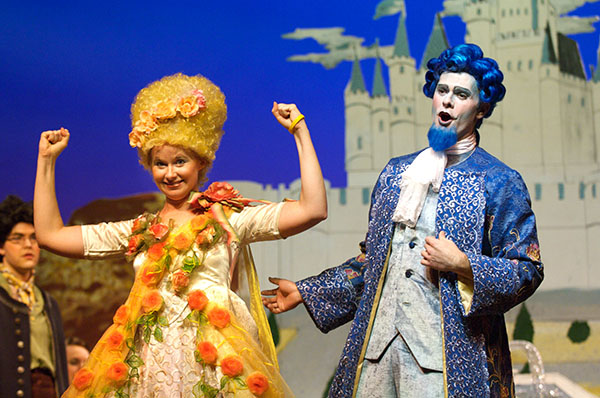
Bluebeard
(1866)
Music by Jacques Offenbach
Libretto by Henri Meilhac and Ludovic Halévy
English Version by Richard Traubner
The nobleman Bluebeard has chosen the charming country girl Boulotte as his wife, although, unbeknownst to her, he had ordered his alchemist Popolani to dispose of five previous wives. After meeting the long-lost Princess Hermia, who has just become engaged to her admirer, Prince Saphir, Bluebeard decides that he no longer has use for Boulotte and seeks Hermia as his spouse. He requests that Popolani dispose of his current wife in the same manner as the previous ones. In his cave, the alchemist administers to her a vial of poison, whose quick effect convinces Bluebeard that he is once again a bachelor. Popolani, in fact, has murdered no one; with the help of a mechanical device, he awakens all the wives. Bluebeard, meanwhile, has put a stop to the wedding of Saphir and Hermia, and taken her as his seventh wife. The revived six wives, disguised as gypsies to get his attention, expose the evils of Bluebeard, who, although repentant, is dragged home by Boulotte to live unhappily ever after.
Conductor: Michael Borowitz
Director: Stephen Carr
Choreographer: Carol Hageman
Set Designer: Richard Traubner
Costume Designer: Myron Elliot
Lighting Designer: Krystal Kennel
Boulotte Jessie Wright Martin
Queen Clementine Sahara Glasener-Boles
Princess Hermia/Fleurette Betha Christopher
Previous Wives of Bluebeard
Héloïse Kathryn McCreary
Éléonore Amanda Kingston
Isaure Kemper LeCroy-Florin
Rosalinde Amanda Opuszynski
Blanche Laura Riggs
Bluebeard Peter Foltz
King Bobèche Gary Moss
Count Oscar Patrick Howle
Popolani Jacob Allen
Prince Saphir Michael Denos
Alvarez Anthony Buck
Notary Spiro Matsos
Pages
Diana Becker
Danielle Knox
Child Karla Hughes
Soldiers
Anthony Buck
Todd Strange
Brian Tanner
David Kelleher-Flight
Porteurs
Jack Beetle
Josh Kohl
Joey Lenehan
Paul Hindemith
Women of the Ensemble: Diana Becker, Stina Eberhardt, Karla Hughes, Amanda Kingston, Danielle Knox, Analisa Leaming, Kemper LeCroy-Florin, Kathryn McCreary, Amanda Opuszynski, Laura Riggs and Sarah Warrick.
Men of the Ensemble: Jack Beetle, Anthony Buck, Paul Hindemith, Patrick Howle, David Kelleher-Flight, Josh Kohl, Joey Lenehan, Todd Strange and Brian Tanner.
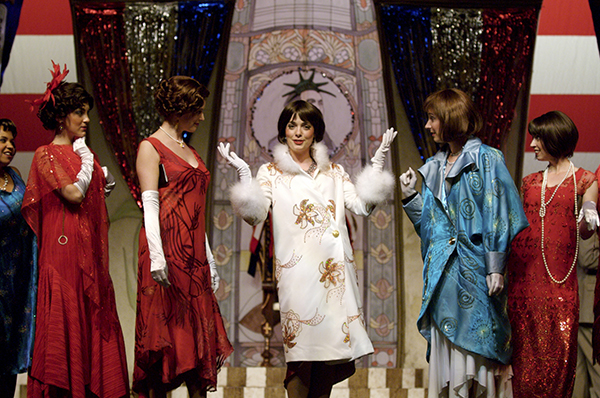
The Duchess of Chicago
(1928)
Music by Emmerich Kálmán
Original German Book and Lyrics by Julius Brammer and Alfred Grünwald
English Version by Philip Kraus and Gregory Opelka
Mary Lloyd, the very beautiful, very rich and very spoiled daughter of Chicago’s hot dog king, travels to Europe with her society girlfriends to see who can succeed in buying the most unobtainable item, with the winner receiving one million dollars. In a Budapest dance hall, she becomes intrigued with the visiting Crown Prince of Sylvaria, but throws a tantrum when he refuses her request that they dance a Charleston or fox trot, insisting rather that a waltz or polka would be more appropriate. Mary buys the royal palace, cables her father that soon she will buy the Prince that goes with it and promises all that before long he will be dancing to her tune. By prearranged plan, the Prince, however, is to soon marry his cousin, Princess Rosemarie, who confesses that she has no interest in a royal husband; her attention becomes increasingly fixed on Mary’s private secretary, Mr. Bondy. The growing affection between Mary and the Prince is undermined when he learns from her girlfriends that, apparently, he is nothing but the means to her million-dollar prize. We won’t give away the ending, but let it be said that the final curtain falls as the Prince insists on “a tender fox trot with Mary.”
Conductor: Michael Borowitz
Director: Julie Wright
Choreographer: Carol Hageman
Assistant Choreographer: Tricia Jenkins Meyer
Set Designer: Kirk Domer
Costume Designer: Charlene Gross
Lighting Designer: Krystal Kennel
Assistant Director: Stephen Carr
King Pankraz XXVII/Benjamin Lloyd Gary Moss
Sandor Boris Grant Knox
Princess Rosemarie Sonjuschka Jessie Wright Martin
Count Bojassowitsch Anthony Buck
Marquis Perolin Brian Tanner
Count Negresco Jack Beetle
Prince Maxi Alisha Hocking
Prince Stani Jack Neill
Princess Alexis Polly Dexter
Princess Maritza Annie Jaeb
Baron Palffy Todd Strange
Baron von Vöröshazy Benjamin Robinson
Valadamir Seth Kershisnik
Mary Lloyd Danielle Knox
Jimmy Jack John Bondy / Mysterious Stranger Jacob Allen
Edith Rockefeller Amanda Kingston
Maud Carnegie Carissa Kett
Daisy Vanderbilt Betha Christopher
Dolly Astor Diana Becker
Lilian Ford Robin Farnsley
Baby Steel Kathryn McCreary
Gladys Morgan Stina Eberhardt
Elis Fahnestock Analisa Leaming
Tihanyi Nicholas Hartley
Kuppi Mihaly Patrick Howle
Kompoty Peter Foltz
Valet David Kelleher-Flight
Bobby Michael Denos
Joujou Cecily Ellis
Loulou Kathryn McCreary
Women of the Ensemble: Sarah Asmar, Diana Becker, Betha Christopher, Robin Farnsley, Stina Eberhardt, Cecily Ellis, Karla Hughes, Carissa Kett, Amanda Kingston, Analisa Leaming, Kemper LeCroy-Florin, Kathryn McCreary and Suzanne Woods.
Men of the Ensemble: Jack Beetle, Michael Denos, Peter Foltz, Nicholas Hartley, Paul Hindemith, Patrick Howle, David Kelleher-Flight, Seth Kershisnik, Josh Kohl, Gary Moss, Benjamin Robinson and Todd Strange.

Princess Ida
(1884)
Music by Sir Arthur Sullivan
Words by William S. Gilbert
Princess Ida, daughter of the crusty King Gama, has been betrothed since childhood to Prince Hilarion, son of King Hildebrand. Gama, however, is unable to deliver his daughter to Hilarion because she is occupied as founder and ruler of an all-girls university, which educates young women on the realities of men. The school excludes everything male; even “hymns” are referred to as “hers.” Hildebrand orders the arrest of Gama, as Hilarion decides that he still wants to win Ida’s heart. He and his friends, Cyril and Florian, enter the college in female disguise. When they cross paths with Lady Psyche, Professor of Humanities, who happens to be Florian’s sister, they are forced to confess their identities and are imprisoned by Ida. Hildebrand and his men threaten to execute Ida’s three brothers if Hilarion is not released and allowed to wed Ida. The Princess defies his challenge and readies for combat. Gama arrives, a crushed man, as Hildebrand has provided him so many luxuries in prison that he has nothing to complain about. His tears move Ida to order the gates opened and the masculine hordes admitted. She confesses that perhaps her thinking has been misguided and offers her hand to Hilarion.
Conductor: J. Lynn Thompson
Director: Julie Wright
Choreographer: Carol Hageman
Set Designer: Tymberley Wittrig
Costume Designer: Lee Martin
Lighting Designer: Shannon Schweitzer
Assistant Director: Stephen Carr
Assistant Choreographer: Tricia Jenkins Meyer
King Hildebrand Nicholas Hartley
Hilarion, his Son Jack Beetle
Cyril, Hilarion’s Friend Anthony Buck
Florian, Hilarion’s Friend Patrick Howle
King Gama Ted Christopher
Arac, his Son Paul Hindemith
Guron, his Son Seth Kershisnik
Scynthius, his Son David Kelleher-Flight
Princess Ida, Gama’s Daughter Suzanne Woods
Lady Blanche, Professor of Abstract Science Stina Eberhardt
Lady Psyche, Professor of Humanities Betha Christopher
Melissa, Lady Blanche’s Daughter Sahara Glasener-Boles
Sacharissa, Girl Graduate Cecily Ellis
Chloe, Girl Graduate Kathryn McCreary
Ada, Girl Graduate Amanda Opuszynski
Women of the Ensemble: Sarah Asmar, Betha Christopher, Robin Farnsley, Stina Eberhardt, Cecily Ellis, Sahara Glasener-Boles, Carissa Kett, Amanda Kingston, Danielle Knox, Analisa Leaming, Kemper LeCroy-Florin, Kathryn McCreary, Emily Neill, Amanda Opuszynski and Laura Riggs.
Men of the Ensemble: Jacob Allen, Peter Foltz, Paul Hindemith, David Kelleher-Flight, Seth Kershisnik, Grant Knox, Josh Kohl, Joey Lenehan, Gary Moss, Benjamin Robinson, Todd Strange and Brian Tanner.
2006 Season
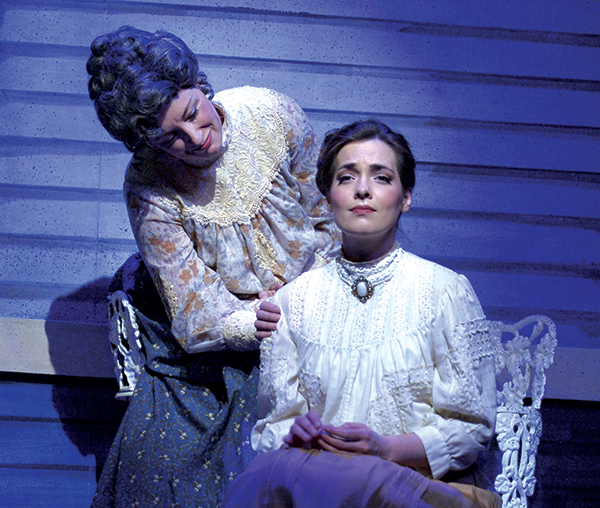
The Music Man
(1957)
Music by Meredith Willson
Lyrics by Meredith Willson
Book by Meredith Willson & Franklin Lacey
“Professor” Harold Hill is a conman who mesmerizes the small town of River City, Iowa by selling musical instruments and uniforms with the promise to form a local student band and teach them to play using his “think method”. His plan to carry out the scam is thwarted when he falls for the local librarian, Marian Paroo, and his conscience takes over. To focus attention on the need for a boys’ band, Harold attacks the town’s new pool hall, and his argument is convincing, but the pool hall’s owner turns out to be Mayor Shinn, who orders the school board to check out Harold’s credentials. As the city officials become suspicious of him, Harold forms the men into a barbershop quartet and distracts the ladies of the town by encouraging them to study classical dance. Marian withholds evidence against Harold when she discovers he is helping her shy, withdrawn brother, Winthrop, to overcome his speech impediment. With the exception of the Mayor, the town is now under Harold’s spell. Although Marian recognizes his scheme, she falls in love with him and speaks out in his defense. Harold has the chance to skip town but decides to stay and face the music. As the band arrives in assorted, unaltered uniforms, Harold is handed a baton. “Think, men, think” is his command. At the drop of his arm comes the “Minuet in G” as it has never been “played” before. Every struggling note is music to each parent’s ears. The townspeople realize that even though Harold is a thief, he changed their lives for the better, and they forgive him. Come enjoy the delightful melodies of this American classic: Ya Got Trouble, Goodnight My Someone, Seventy-Six Trombones, Pack-A-Little / Goodnight Ladies, Marian the Librarian, My White Knight, The Wells Fargo Wagon, It’s You, Shipoopi, Lida Rose / Will I Ever Tell You, Gary, Indiana, and ‘Til There Was You.
Conductor J.Lynn Thompson/Robert Katkov-Treviño
Director Steven Daigle
Choreographer Carol Hageman
Assitant Director Stephen Carr
Set Designer Tymberley A. Wittrig
Costume Designer Charlene Gross
Lighting Designer Shannon Schweitzer
Harold Hill Ted Christopher
Marian Paroo Danielle McCormick/Kemper LeCroy Florin
Winthrop Paroo Briar Arn/Harper Baddley
Amaryllis Emily Neill/Ali Jaeb
Mrs. Paroo Stina Marie Eberhardt
Marcellus Washburn Anthony Buck/Tyler Nelson
Quartet
Jacey Squires Ben Robinson
Ewart Dunlop Patrick Howle
Oliver Hix Peter Bush
Olin Brit Cory Clines
Mayor Shinn Mark Snyder
Eulalie Machecknie Shinn Valerie Hart Nelson/Elizabeth Mitchell
Zaneeta Shinn Karla Hughes/Erin Jackson-Legris
Gracie Shinn Nicole Wellington/Annie Jaeb
Tommy Djilas Michael Denos
Alma Hix Maren Tenney
Ethel Toffelmier Claire Maloney
Maud Dunlop Sara Gartland
Mrs. Squires Ashly Evans
Conductor Gary Moss
Charlie Cowell Brian Tanner
Constable Locke David Krohn
Children of River City: Brian Arn, Harper Bradley, Skylar Breiner, Emily Crawford, Thomas Fitz Gibbon, Alisha Hocking, Ali Jaeb, Annie Jaeb, Joey Lenehan, Han Mahle, Emily Neill, Jennifer Vicknair, Jillian Vicknair, Nicole Wellington
Women of the Ensemble: Donata Cucinotta, Stina Marie Eberhardt, Ashly Evans, Kemper LeCroy Florin, Anne Marie Frohmayer, Sara Gartland, Karla Hughes, Erin Jackson-Legris, Amanda Kingston, Claire Maloney, Danielle McCormick, Elizabeth Mitchell, Valerie Hart Nelson, Maren Tenney
Men of the Ensemble: Jacob Allen, Jack Beetle, Kevin Blickfeldt, Anthony Buck, Peter Bush, Ted Christopher, Cory Clines, Michael Denos, Patrick Howle, David Krohn, Gary Moss, Tyler Nelson, Bejamin Robinson, Mary Snyder, Brian Tanner, Joseph Valone
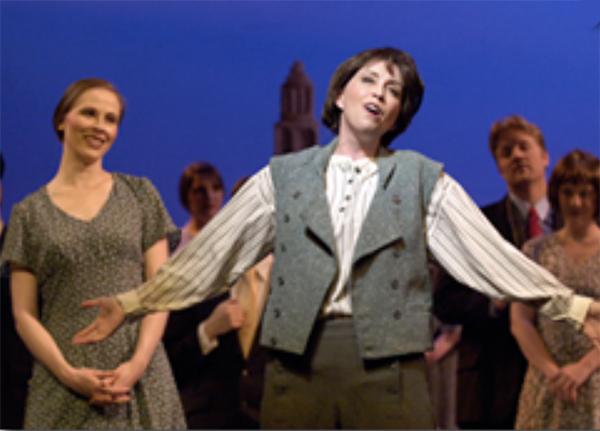
The Firefly
(1912)
Music & Lyrics by Rudolf Friml
The story begins with Little Street-Singing Nina escaping a cruel master by disguising herself as a cabin boy on the Bermuda-going yacht of the wealthy socialite Mrs. Van Dare. Professor Franz thinks he has found a wonderful choirboy, but, if he is disappointed when the truth of Nina’s sex come out, Mrs. Van Dare’s intended son-in-law, Jack Travers, is not. After some enjoyable misadventures on the Caribbean cruise, including false accusations and a misdirected letter, and with the passing of time, the jilted Geraldine Van Dare gets a suitable husband in the comfortable “uncle” John Thurston. Nina, now a famous Prima Donna, becomes Mrs. Travers. The comedy is played fully through the secondary couple: Geraldine’s maid, Suzette, and Thurston’s valet, Pietro. Don’t miss the opportunity to see this nostalgic, early American work. Other successful works by Friml include Rose Marie and the musical comedies: The Vagabond King and The Three Musketeers.
Conductor Jason Alfieri
Stage Director Steven Daigle
Choreographer Carol Hageman
Assistant Director Stephen Carr
Set Designer Tymberley Wittrig
Costume Designer Charlene Gross
Lighting Designer Krystal Kennel
Sybil Van Dare Karla Hughes
Suzette, Maid to Geraldine Jill Anna Ponasik/Jessie Wright Martin
Pietro, Valet to Mr. Thurston Patrick Howle/Tyler Nelson
Mrs. Oglesby Van Dare, Sybil’s Mother Elizabeth Mitchell
Jenkins, Confidential Secretary Jacob Allen
Geraldine Van Dare, Mrs. Van Dare’s Niece Sarah Asmar/Danielle McCormick
Jack Travers, her Sweetheart Grant Knox/Jack Beetle
John Thurston, his Uncle Boyd Mackus
Herr Franz, a Choirmaster Joseph Valone
Nina, a Street Singer Robin DeLeon/Donata Cucinotta
Captain Nicholas Hartley
Antonio Columbo, a Pickpocket Erin Jackson-Legris
Corelli, Nina’s Guardian Kevin Blickfeldt
Women of the Ensemble: Sarah Asmar, Donata Cucinotta, Stina Marie Eberhardt, Ashly Evans, Sahara Glasener-Boles, Karla Hughes, Robin DeLeon, Anne Marie Frohnmayer, Sara Gartland, Erin Jackson-Legris, Amanda Kingston, Claire Maloney, Jessie Wright Martin, Danielle McCormick, Elizabeth Mitchell, Jill Anna Ponasik and Maren Tenney.
Men of the Ensemble: Jacob Allen, Jack Beetle, Kevin Blickfeldt, Anthony Buck, Peter Bush, Cory Clines, Michael Denos, Nicholas Hartley, Patrick Howle, Grant Knox, Adam Lloyd, Boyd Mackus, Tyler Nelson, Tyler Oliphant, Benjamin Robinson and Joseph Valone.
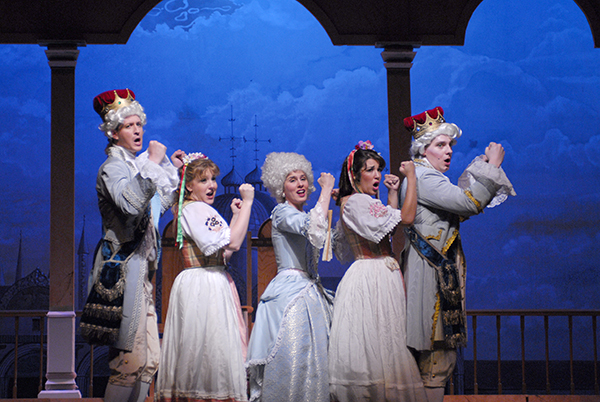
The Gondoliers
(1889)
Music by Sir Arthur Sullivan
Words by William S. Gilbert
Casilda, the 21-year-old daughter of the Duke and Duchess of Plaza-Toro, was married at birth by proxy to the infant son and heir of the exceedingly wealthy King of Barataria. Unfortunately, the King became a rather bigoted Wesleyan Methodist, and the Grand Inquisitor, determined that such a trend should not continue, arranged for the heir to be kidnapped and taken to Venice. There he was placed in the care of a respectable gondolier who raised him alongside his own son. Now gondoliers themselves, his “sons”, Marco and Giuseppe, have recently selected a bride each, Gianetta and Tessa, from their large female following and are, therefore, upset to learn that, as heir apparent to the throne, one of them may have to sacrifice his bride in order to marry Casilda. She is not happy with the situation either as she is in love with Luiz. As Marco and Giuseppe’s “father” has since died, the only person that can truly identify the Prince is Inez, who was his childhood nurse. When called upon to make her judgement she reveals that neither is in fact the King’s son, because when the baby was kidnapped she substituted her own child in his place. Therefore, the true heir to the throne of Barataria is Luiz. This proves satisfactory to all parties, as the gondoliers can keep their brides, and Casilda can both fulfill the proxy and marry the one she loves. Children of all ages will be captivated by the charisma of The Gondoliers.
Conductor J. Lynn Thompson
Stage Director Steven Daigle
Choreographer Carol Hageman
Assistant Director Stephen Carr
Set Designer Kirk Domer
Costume Designer Charlene Gross
Lighting Designer Shannon Schweitzer
The Duke of Plaza-Toro, a Grandee of Spain Ted Christopher
Luiz, His Attendant Adam Lloyd/Michael Denos
The Duchess of Plaza-Toro Sandra Ross/Valerie Hart Nelson
Casilda, Her Daughter Anne Marie Frohnmayer/Maren Tenney
Don Alhambra Del Bolero, The Grand Inquisitor Gary Moss
Gianetta, Contadine Erin Jackson-Legris/Kemper LeCroy Florin
Tessa, Contadine Sahara Glasener-Boles/Jill Anna Ponasik
Giuseppe Palmieri, Gondolier Nicholas Hartley/Peter Bush
Marco Palmieri, Gondolier Benjamin Robinson/Jack Beetle
Fiametta, Contadine Donata Cucinotta
Antonio, Gondolier Joseph Valone
Inez, The King’s Foster-Mother Jessie Wright Martin
Women of the Ensemble: Donata Cucinotta, Ashly Evans, Kemper LeCroy Florin, Anne Marie Frohnmayer, Sahara GlasenerBoles, Karla Hughes, Erin Jackson-Legris, Amanda Kingston, Claire Maloney, Jessie Wright Martin, Danielle McCormick, Elizabeth Mitchell, Valerie Hart Nelson, Jill Anna Ponasik, Sandra Ross and Maren Tenney.
Men of the Ensemble: Jacob Allen, Jack Beetle, Anthony Buck, Peter Bush, Ted Christopher, Michael Denos, Nicholas Hartley, Grant Knox, David Krohn, Adam Lloyd, Gary Moss, Tyler Oliphant, Benjamin Robinson, Brian Tanner and Joseph Valone.
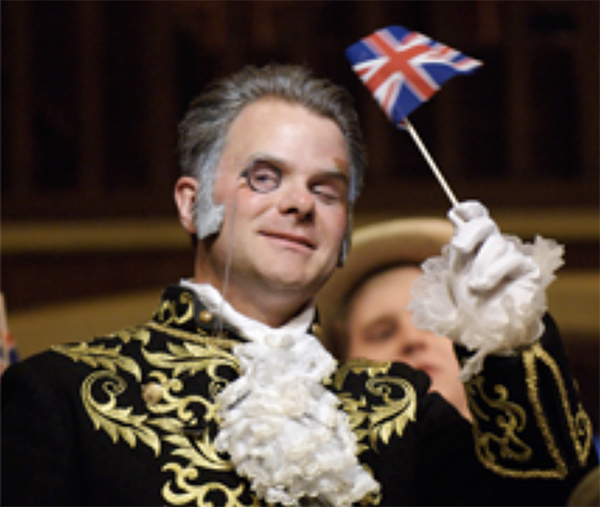
H.M.S. Pinafore
(1878)
Music by Sir Arthur Sullivan
Words by William S. Gilbert
High spirits prevail aboard the H.M.S. Pinafore as Little Buttercup distributes sweets and tobacco to the crew. Ralph Rackstraw’s mind, however, is on Josephine, Captain Corcoran’s daughter. He is in love with her even though she is socially unattainable. Unaware of his affection for her, Josephine is in love with Ralph, but pride prevents her from revealing this because of his low station. Josephine is sought in marriage by Sir Joseph Porter but chooses not to acknowledge his advances. Sir Joseph holds strong views about the treatment of sailors. He maintains that a British sailor is any man’s equal (excepting his own) and should always be treated with politeness without recourse to bad language or abuse. This inspires Ralph to declare his love for Josephine, who soon forgets her pride and confesses her true feelings to him. Plans are quickly made to smuggle the couple ashore that night to be married. Dick Deadeye tries to foil the union of the couple by betraying their intentions to the Captain; as a result, they are caught before they can leave the ship. Confusion ensues, and Little Buttercup saves the situation when she confesses how, in her youth, she had fostered two babies from opposite ends of the social ladder. In the course of caring for them, she had mixed them up. The baby from the poor background was Captain Corcoran, and the other was Ralph. Upon hearing this, Sir Joseph immediately loses all interest in Josephine and gladly resigns her to Ralph, now Captain Rackstraw.
Conductor Jason Altieri
Stage Director Ted Christopher
Choreographer Carol Hageman
Assistant Director Stephen Carr
Set Designer Shelley Barish
Costume Designer Daniel Jones
Lighting Designer Shannon Schweitzer
Josephine, The Captain’s Daughter Sarah Asmar Anne Marie Frohnmayer
Ralph Rackstraw, Able Seaman Grant Knox Adam Lloyd
Sir Joseph Porter, K. C. B., First Lord of the Admiralty Ted Christopher
Captain Corcoran, Commander of the H. M. S. Pinafore Patrick Howle Gary Moss
Cousin Hebe, Sir Joseph’s First Cousin Stina Marie Eberhardt
Dick Deadeye, Able Seaman Cory Clines Tyler Oliphant
Bill Bobstay, Boatswain’s Mate Kevin Blickfeldt
Bob Becket, Carpenter’s Mate David Krohn
Little Buttercup, A Portsmouth Bumboat Woman Ashly Evans Elizabeth Mitchell
Mid-Ship mite Jack Neill
Women of the Ensemble: Sarah Asmar, Donata Cucinotta, Robin DeLeon, Stina Marie Eberhardt, Ashly Evans, Kemper LeCroy Florin, Anne Marie Frohnmayer, Sahara Glasener-Boles, Amanda Kingston, Danielle McCormick, Elizabeth Mitchell, Valerie Hart Nelson and Jill Anna Ponasik.
Men of the Ensemble: Jacob Allen, Jack Beetle, Kevin Blickfeldt, Anthony Buck, Peter Bush, Ted Christopher, Cory Clines, Nicholas Hartley, Patrick Howle, Grant Knox, David Krohn, Adam Lloyd, Gary Moss, Jack Neill, Tyler Nelson, Tyler Oliphant and Brian Tanner.
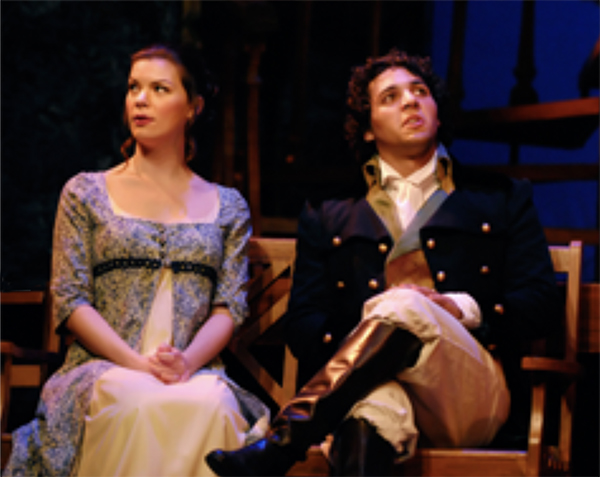
Jane Austen’s Pride and Prejudice
(2006) World Premiere
Music & Lyrics by Amanda Jacobs & Lindsay Baker
As she puts ink to paper, Jane Austen narrates her tale of Pride and Prejudice. She introduces Mr. and Mrs. Bennet, an upper-class couple in rural England, and their five eligible daughters. Mrs. Bennet is determined to marry them off, but the girls have no dowry. Jane solves the Bennets’ dilemma by bringing Mr. Bingley, a wealthy young man, to the nearby estate of Netherfield Park. Mr. Bingley is enamored with the Bennets’ eldest daughter, Jane, and is hopeful of soon seeing her happily married. As the story unfolds, we meet the snobby Mr. Darcy and the charming officer, Mr. Wickham.
Conductor J. Lynn Thompson
Stage Director Steven Daigle
Choreographer Carol Hageman
Assistant Director Sandra Ross
Set Designer Kirk Domer
Costume Designer Charlene Gross
Lighting Designer Krystal Kennel
Jane Austen Jill Anna Ponasik
Mr. Bennet Ted Christopher
Mrs. Bennet Julie Wright
Jane Bennet Sarah Asmar
Elizabeth Bennet Sara Gartland
Mary Bennet Sahara Glasener-Boles
Kitty Bennet Danielle McCormick
Lydia Bennet Karla Hughes
Mr. William Collins Tyler Nelson
Charlotte Lucas Elizabeth Mitchell
Mr. Charles Bingley Adam Lloyd
Caroline Bingley Kemper LeCroy Florin
Louisa Hurst Ashly Evans
Mr. Fitzwilliam Darcy Joseph Valone
Mr. George Wickham Patrick Howle
Lady Catherine De Bourgh Sandra Ross
Mrs. Gardiner Robin DeLeon
Mr. Gardiner Steven Daigle
Mrs. Reynolds Claire Maloney
Lady Lucas Valerie Hart Nelson
Colonel Fitzwilliam Tyler Oliphant
Georgiana Darcy Anne Marie Frohnmayer
Captain Denny Benjamin Robinson
Sir William Lucas Cory Clines
Anne De Bourgh Donata Cucinotta
Colonel Forster Nicholas Hartley
Mrs. Forster Stina Marie Eberhardt
Captain Carter Michael Denos
Women of the Ensemble: Sarah Asmar, Donata Cucinotta, Robin DeLeon, Stina Marie Eberhardt, Ashly Evans, Sahara Glasener-Boles, Karla Hughes, Kemper LeCroy Florin, Anne Marie Frohnmayer, Sara Gartland, Claire Maloney, Danielle McCormick, Elizabeth Mitchell, Valerie Hart Nelson, Jill Anna Ponasik, Sandra Ross and Julie Wright.
Men of the Ensemble: Ted Christopher, Cory Clines, Michael Denos, Nicholas Hartley, Patrick Howle, Adam Lloyd, Tyler Nelson, Tyler Oliphant, Benjamin Robinson, Mark Snyder, Brian Tanner and Joseph Valone
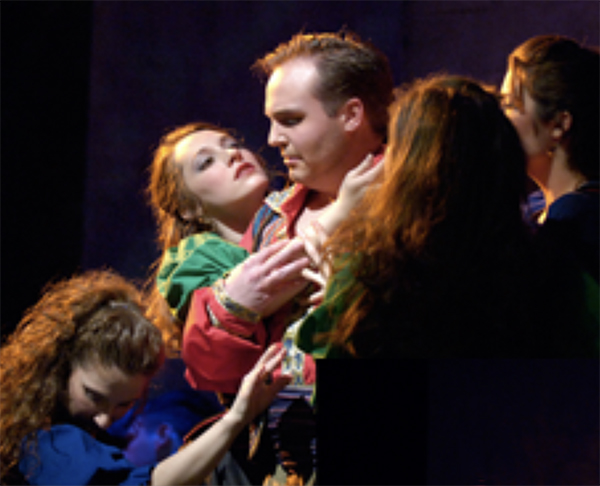
The New Moon
(1928)
Music & Lyrics by Sigmund Romberg
The operetta begins as Robert, a young French aristocratic revolutionary, is forced to flee his country. He sells himself as a bondservant to a planter and ship owner, Monsieur Beaunoir and his family in New Orleans. As the police of Paris are looking everywhere for him, Robert cannot tell Beaunoir or his beautiful daughter Marianne, with whom he has fallen in love, that he is of noble blood. He is eventually tracked down by Vicomte Ribaud, the detective villain, and put aboard The New Moon, so he can be deported back to France. Robert thinks he has been betrayed by Marianne, who has gained her father’s consent to travel on the same ship by pretending to be in love with Captain Duval. Mutiny occurs, and the bondservants come into power. Everyone goes ashore on the Isle of Pines, and a new republic is founded, which flourishes under Robert’s guidance. Vicomte Ribaud makes a final attempt to conquer the island for the king of France, but fails. Through twists and turns, a happy reunion follows for Citizen Robert and Marianne.
Conductor Robert Katkov-Treviño
Stage Director Ted Christopher
Choreographer Carol Hageman
Assistant Director Stephen Carr
Set Designer Shelley Barish
Costume Designer Daniel Jones
Lighting Designer Krystal Kennel
Robert, a Bondservant of Beaunoir’s Gary Moss David Krohn
Marianne, Beaunoir’s Daughter Sara Gartland Amanda Kingston
Philippe, a Friend of Robert’s Grant Knox Tyler Nelson
Alexander, another Bondservant Patrick Howle Jacob Allen
Monsieur Beaunoir, a Ship Owner of New Orleans Boyd Mackus
Captain Georges Duval, Commander of The New Moon Kevin Blickfeldt
Vicomte Ribaud Tyler Oliphant
Besace, Boatswain of The New Moon Peter Bush
Julie, Marianne’s Maid Jessie Wright Martin Sahara Glasener-Boles
Clotilde Lombaste, of The Bride Ship Jill Anna Ponasik Stina Marie Eberhardt
Fouchette Mark Snyder
Captain DeJean Jack Beetle
Jacques, a Sailor Ben Robinson
Women of the Ensemble: Sarah Asmar, Robin DeLeon, Stina Marie Eberhardt, Ashly Evans, Kemper LeCroy Florin, Sara Gartland Sahara Glasener-Boles, Karla Hughes, Erin Jackson-Legris, Amanda Kingston, Claire Maloney, Jessie Wright Martin, Valerie Hart Nelson, Jill Anna Ponasik and Maren Tenney
Men of the Ensemble: Jacob Allen, Jack Beetle, Kevin Blickfeldt, Anthony Buck, Peter Bush, Cory Clines, Michael Denos, Nicholas Hartley, Patrick Howie, Grant Knox, David Krohn, Adam Lloyd, Boyd Mackus, Spiro Matsos, Gary Moss, Tyler Nelson, Tyler Oliphant, Benjamin Robinson, Mark Snyder, Brian Tanner and Joseph Valone.
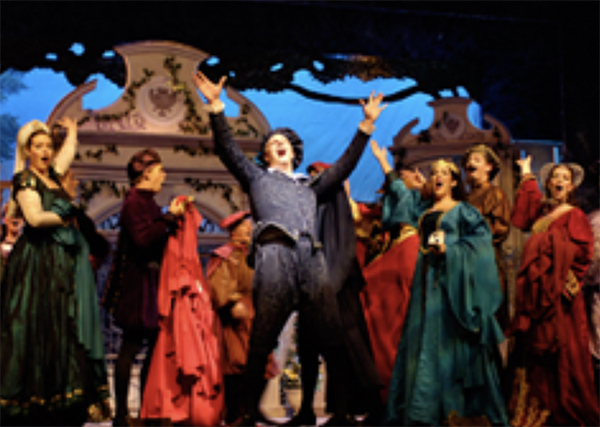
The Queen’s Lace Handkerchief
(1880)
Music & Lyrics by Johann Strauss
The story centers in a supposed adventure of the poet Cervantes. The under-aged King of Portugal is kept away from both affairs of state and from his young Queen by the regent, Villalobos, who is plotting a coup, but the poet Cervantes and his sweetheart Irene, first lady to the queen, work together to further the interest of the young rulers. Villalobos tries to stir up discord between the King and Queen, who are really too young to be very wise, for the King has seen but nineteen years and the Queen but seventeen. Through various irregularities, the King showers attention on the charming Irene, who is too true to the Queen and her loving Cervantes to accept them. Cervantes is appointed the Queen’s reader, and her neglected heart conceives a sentiment for him, which is chiefly gratitude for his genuine friendship and sympathy. As she is an impulsive young woman, she writes on her lace handkerchief: “A Queen loves you, though you are not a King,” and hands it to him in a manuscript of Don Quixote. The manuscript is seized, and Villalobos uses the innocently inscribed handkerchief in an attempt to turn the King against his wife and Cervantes, thus regaining his power. With a bit of disguise and a few opportune explanations, the act ends happily.
Conductor Jason Altieri
Stage Director Julie Wright
Choreographer Carol Hageman
Set Designer Kirk Domer
Costume Designer Daniel Jones
Lighting Designer Shannon Schweitzer
The King of Portugal Gary Moss
The Queen of Portugal Julie Wright
Donna Irene, the Queen’s Confidante and First Lady in Waiting Robin DeLeon
Marquise de Villareal, Mistress of Ceremonies Claire Maloney
Cervantes, a Poet Jack Beetle
Count Villalobos, Prime Minister and Head of the Regency Brian Tanner
Don Sancho de la Avellando, Minister of Public Instruction Grant Knox
Don Quixote de la Mancha y Villareal, Minister of War Kevin Blickfeldt
Four Ministers of the Regency
Duke of Feria, Minister of Justice Anthony Buck
Count San Gregorio, Minister of Interior Michael Denos
Count Ermos, Minister of Navy Nicholas Hartley
Don Diego de Barados, Minister of Police Peter Bush
Dance Master Jacob Allen
Cook Spiro Matsos
Antonio, a Brigand Cory Clines
Women of the Ensemble: Sarah Asmar, Donata Cucinotta, Robin DeLeon, Stina Marie Eberhardt, Kemper LeCroy Florin, Anne Marie Frohnmayer, Sara Gartland, Erin Jackson-Legris, Amanda Kingston, Claire Maloney, Jessie Wright Martin, Jill Anna Ponasik, Maren Tenney and Julie Wright.
Men of the Ensemble: Jacob Allen, Jack Beetle, Kevin Blickfeldt, Anthony Buck, Peter Bush, Cory Clines, Michael Denos, Nicholas Hartley, Grant Knox, David Krohn, Adam Lloyd, Spiro Matsos, Gary Moss, Benjamin Robinson, Brian Tanner and Joseph Valone.
2005 Season
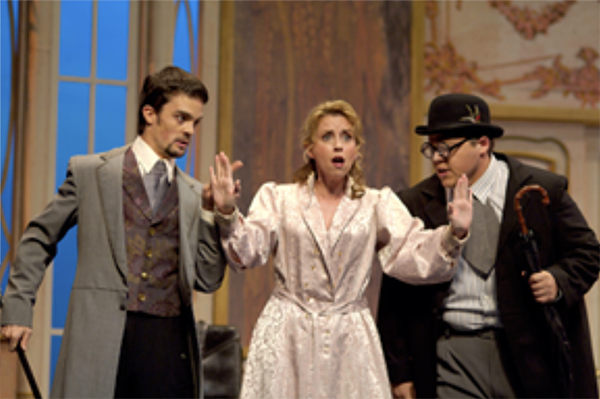
Die Fledermaus
(1874)
Music by: Johann Strauss II
Original libretto by: Richard Genée & Carl Haffner
In mid nineteenth-century Vienna, Gabriel von Eisenstein has been sentenced to jail for a minor offense, but his friend, Dr. Falke, persuades him to postpone his incarceration until after he has attended a party given by Prince Orlofsky. Falke is actually seeking revenge for a practical joke that Eisenstein once played on him and, as part of his strategy, has Eisenstein’s wife Rosalinda come to the party disguised so that she can observe her husband cavorting with the women. Rosalinda is excited that her husband will be out of the way in prison so that her admirer, Alfred, can visit. They are interrupted when the warden arrives looking for Eisenstein. Under Rosalinda’s prompting, Alfred agrees to pose as her husband and is carried off to jail. At the party, Falke promises to amuse the easily bored Orlofsky by staging a domestic comedy. After joining the celebration of champagne and love, Eisenstein departs at dawn for jail, where Alfred has spent the night. Slowly all the partygoers and participants in the domestic joke arrive at the prison. Now that the revenge has succeeded, Falke and Orlofsky clear up mistaken identities. Husband and wife are reconciled, and all sing a toast to champagne.
Conductor J. Lynn Thompson
Stage Director Ted Christopher
Choreographer Carol Hageman
Set Designer Kirk Domer
Costume Designer Charlene Gross
Lighting Designer Shannon Schweitzer
Rosalinda Robin De Leon Amy Pfrimmer
Adele, a chambermaid Sarah Asmar Catherine Greer
Gabriel von Eisenstein Oliver Henderson Gregory Brookes
Alfred, a tenor Joshua Kohl Grant Knox
Blind, a lawyer Tyler Nelson Justin Legris
Dr. Falke Michael Hix Patrick Howle
Frank, a prison warden Jeremiah Butterfield Sam Haddad
Ida, a Ballerina Valerie Hart Nelson Sarah Walker
Orlofsky, a Russian Prince Alta Boover Sandra Ross
Spirayovich Spiro Matsos
Frosch, a Jailor Kevin Blickfeldt
Women of the Ensemble: Sarah Asmar, Alta Boover, Robin De Leon, Sara Gartland, Lisa Gerstenkorn, Sahara Glasener, Catherine Greer, Erin Jackson, Claire Maloney, Danielle McCormick, Valerie Hart Nelson, Amy Pfrimmer, Kari Sorenson, Sandra Ross, Sarah Walker
Men of the Ensemble: James Barbato, Kevin Blickfeldt, Gregory Brookes, John Buffett, Jeremiah Butterfield, Vernon Di Carlo, Samuel Haddad, Oliver Henderson, Michael Hix, Patrick Howle, Grant Knox, Joshua Kohl, Justin Legris, Anthony Maida, Spiro Matsos, Jonathan Michie, Tyler Nelson, Mark Snyder, Brian Tanner
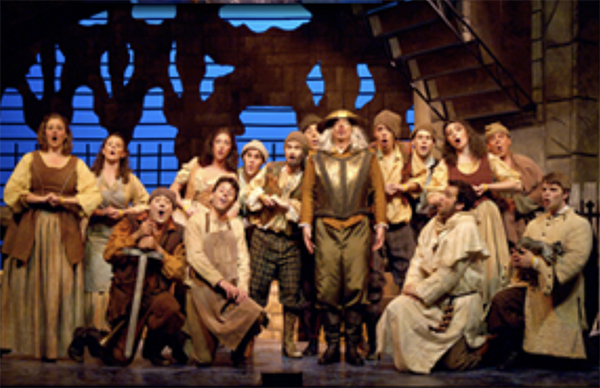
Man of La Mancha
(1965)
Music & Lyrics by Mitch Leigh
Based on The Adventures of Don Quixote by Miguel de Cervantes, Man of La Mancha is a comic tragedy of a man’s struggle to better both himself and the world in which he lives. When Cervantes started writing, he intended a satirical burlesque of the then-fashionable novels of chivalry. Gradually the author’s sympathies changed and the novel developed into a deeper, broader, and more compassionate account of the adventures of an eccentric idealist in a hostile, greedy, and cynical world, leading the reader to conclude that if Don Quixote is a fool, it is because the world does not live up to his ideals. This feeling is perfectly reflected in this beautiful musical version of the story. As with all the best allegorical tales, the oppressive mood of the fight against eternal evil is heightened by the sometimes comic, sometimes dramatic attempts of the hero to right all the wrongs of the world. Although his efforts sometimes seem puny and pathetic, the audience is left in no doubt as to the purity of intent that he instills into his self-imposed crusade. At times inspiring and thought-provoking, the story is both very entertaining and very moving, and will warm the heart of everyone whose spirit was ever raised by the prospect of a victory by the underdog against all odds.
Conductor J. Lynn Thompson
Stage Director Steven Daigle
Choreographer Carol Hageman
Set Designer Kirk Domer
Costume Designer Charlene Gross
Lighting Designer Shannon Schweitzer
Captain of the Inquisition Michael Hix
Miguel de Cervantes Boyd Mackus Gregory Brookes
Manservant, Sancho Panza Anthony Maida Tyler Nelson
Roles Taked by Prisoners:
Governor (Innkeeper) James Mismas
Duke (Dr. Carrasco) Patrick Howle
Aldonza (Dulcinea) Julie Wright Valerie Hart Nelson
Maria, Innkeeper’s wife Claire Maloney
Fermina, a serving girl and Moorish dancer Sarah Walker
Antonia, Alonso’s niece Shannon Langman
Housekeeper, for Alonso Elizabeth Mitchell
Muleteers
Pedro John Buffett
Jose Brian Tanner
Tenorio Vernon Di Carlo
Paco Kevin Blickfeldt
Juan Jonathan Michie
Anselmo Mark Snyder
Barber James Barbato
Padre Zachary Wilder
Women of the Ensemble: Shannon Langman, Claire Maloney, Elizabeth Mitchell, Valerie Hart Nelson, Sarah Walker, Julie Wright
Men of the Ensemble: James Barbato, Kevin Blickfeldt, Gregory Brookes, John Buffett, Vernon Di Carlo, Michael Hix, Patrick Howle, Boyd Mackus, Anthony Maida, Jonathan Michie, James Mismas, Tyler Nelson, Mark Snyder, Brian Tanner, Zachary Wilder
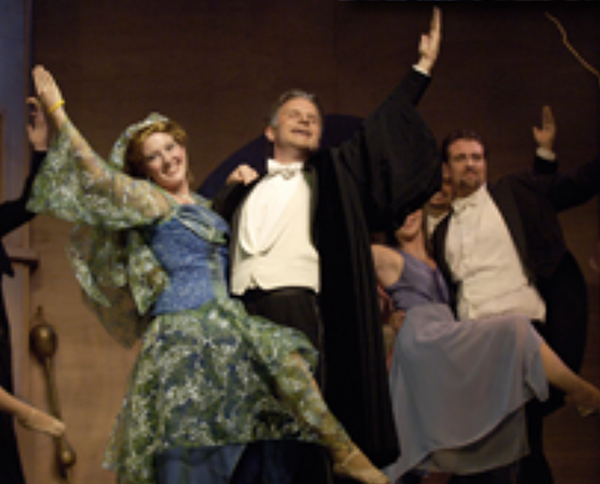
Iolanthe
(1882)
Music by Sir Arthur Sullivan
Words by William S. Gilbert
Twenty-five years after her banishment from Fairyland for marrying a mortal, a crime usually punishable by death, Iolanthe has been pardoned. She had a son by this illicit marriage, Strephon, who is therefore half mortal and half fairy. He is in love with Phyllis, whom he is determined to marry. However, to do so, he needs the consent of her guardian, the Lord Chancellor, who shows little enthusiasm for the idea of his ward marrying a mere shepherd. When Strephon turns to his mother for comfort, Phyllis misinterprets their intimacy (as a fairy, Iolanthe has not physically aged beyond seventeen years) and, believing him to be unfaithful, renounces him. Although he protests that Iolanthe is his mother, his claims are met with derision by Phyllis and the peers (who are unaware of his parentage), and even the intervention of the Queen of the Fairies cannot persuade them otherwise. Furious at their attitude, the queen declares that Strephon will enter Parliament and work to overthrow all the privileges enjoyed by the nobility, a job at which he is successful. However, he finds no substitute for Phyllis, and, with no further reason to conceal it, he reveals his fairy origins to her. This explains Iolanthe’s apparent youth, and the couple becomes re-engaged. At Strephon’s request, Iolanthe puts their case to the Lord Chancellor, but has to disguise herself before doing so, as, unbeknownst to him, he is her mortal husband, and she is forbidden to enlighten him under pain of death. Unfortunately, when he declares that he has decided to marry Phyllis himself, she is forced to reveal her true identity, although this will mean forfeiting her life. However, when it emerges that the other fairies have committed the ultimate offense and married the mortal peers, the Lord Chancellor suggests that the law be amended so that it is a crime for any fairy not to marry a mortal. The Queen happily selects a mortal for herself and invites the whole company to join her in Fairyland.
Conductor Robert Katkov-Trevino
Stage Director Steven Daigle
Choreographer Carol Hageman
Set Designer Tymberley A. Wittrig
Costume Designer Daniel Jones
Lighting Designer Danielle Baisden
Assistant Stage Director Amy Pfrimmer
Celia, a fairy Jessica Hornsten
Lelia, a fairy Shannon Langman
Queen of the Fairies Sandra Ross Elizabeth Mitchell
Iolanthe, a fairy, Strephon’s mother Sahara Glasener Betha Christopher
Fleta, a fairy Lisa Gerstenkorn
Strephon, an Arcadian servant Jonathan Michie Vernon Di Carlo
Phyllis, an Arcadian shepherdess and Ward in Chancery Danielle McCormick Rachel Rowe
Lord Chancellor Ted Christopher
Lord Tolloller Brian Tanner
Lord Mountarat Michael Hix
Private Willis, of the Grenadier Guards James Mismas
Women of the Ensemble: Sarah Asmar, Alta Boover, Betha Christopher, Robin De Leon, Sara Gartland, Lisa Gerstenkorn, Sahara Glasener, Catherine Greer, Jessica Hornsten, Shannon Langman, Claire Maloney, Danielle McCormick, Elizabeth Mitchell, Amy Pfrimmer, Sandra Ross, Rachel Rowe, Kari Sorenson, Sarah Walker
Men of the Ensemble: Kevin Blickfeltd, Jeremiah Butterfield, Ted Christopher, Vernon Di Carlo, Samuel Haddad, Michael Hix, Grant Knox, Joshua Kohl, Justin Legris, Jonathan Michie, James Mismas, Tyler Nelson, Brian Tanner, Zachary Wilder

The Sorcerer
(1877)
Music by Sir Arthur Sullivan
Words by William S. Gilbert
The engaged couple, Alexis and Aline, want everyone to be as happy as they are. The groom-to-be brings in a “family sorcerer” to administer a love potion to the entire village. As you might expect, the potion works, but everyone falls in love with the wrong partner. All is made right at the end, however, as the sorcerer breaks the spell by the expedient of giving himself up to the powers of evil in an appropriate puff of smoke.
Conductor Steven Byess
Stage Director Julie Wright
Choreographer Carol Hageman
Set Designer Tymberley A. Whitrig
Costume Designer Daniel Jones
Lighting Designer Danielle Baisden
Sir Marmaduek Pointdextre, an Elderly Baronet Boyd Mackus
Alexis, his son Grant Knox
Dr. Daly, Vicar of Ploverleigh James Mismas
Mrs. Partlet, a Pew Opener Jessie Wright Martin
Constance, her daughter Kari Sorenson
Aline, her daughter-betrothed to Alexis Danielle McCormick
Lady Sangazure, a Lady of Ancient Lineage Sandra Ross
John Welligton Wells, of J.W. Wells & Co., Family Sorcerers Ted Christopher
Notary Kevin Blickfeldt
Women of the Ensemble: Alta Boover, Julianna Byess, Robin De Leon, Sara Gartland, Lisa Gerstenkorn, Sahara Glasener, Catherine Greer, Erin Jackson, Shannon Langman, Clair Maloney, Jessie Wright Martin, Danielle McCormick, Elizabeth Mitchell, Valerie Hart Nelson, Sandra Ross, Rachel Rowe, Kari Sorenson
Men of the Ensemble: Kevin Blickfeldt, Gregory Brookes, John Buffett, Jeremiah Butterfield, Ted Christopher, Vernon Di Carlo, Samuel Haddad, Oliver Henderson, Patrick Howle, Grant Knox, Justin Legris, Boyd Mackus, Anthony Maida, James Mismas, Tyler Nelson, Brian Tanner, Zachary Wilder
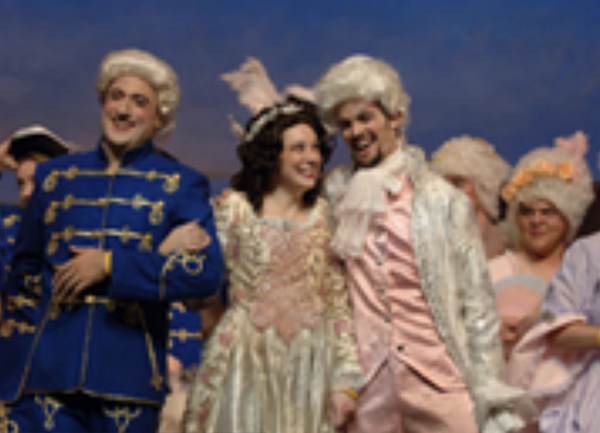
The Island of Tulipatan
(1868)
Music by Jacques Offenbach
Original libretto by Henri Chivot and Alfred Duru
Duke Cacatois is planning the wedding of his son Alexis to Hermosa, the daughter of his majordomo, Romboidal, yet he meets unexpected resistance. What the duke does not know is that his son is in fact his fourth daughter, born in his absence and brought up by his wife as crown prince. Romboidal knows of this deceit, while his wife, Theodorin, also has reasons to prevent the marriage. Her husband does not know that their daughter is in truth a son who, to avoid military service, was raised as a girl. Of course, the young people have already fallen in love, and this does not change when the cross-gender role-playing comes to an end. Now there is nothing to stop the marriage.
Conductor Steven Byess
Stage Director Julie Wright
Choreographer Carol Hageman
Set Designer Tymberley A. Whitrig
Costume Designer Daniel Jones
Lighting Designer Danielle Baisden
Cacatois XXII Oliver Henderson
Alexis, his son – but really a woman! Erin Jackson
Rombodial Brian Tanner
Theodorine, his wife Alta Boover
Hermosa, their daughter, but really a man! Anthony Maida
Women of the Ensemble: Alta Boover, Julianna Byess, Robin De Leon, Sara Gartland, Lisa Gerstenkorn, Sahara Glasener, Catherine Greer, Erin Jackson, Shannon Langman, Clair Maloney, Jessie Wright Martin, Danielle McCormick, Elizabeth Mitchell, Valerie Hart Nelson, Sandra Ross, Rachel Rowe, Kari Sorenson
Men of the Ensemble: Kevin Blickfeldt, Gregory Brookes, John Buffett, Jeremiah Butterfield, Ted Christopher, Vernon Di Carlo, Samuel Haddad, Oliver Henderson, Patrick Howle, Grant Knox, Justin Legris, Boyd Mackus, Anthony Maida, James Mismas, Tyler Nelson, Brian Tanner, Zachary Wilder
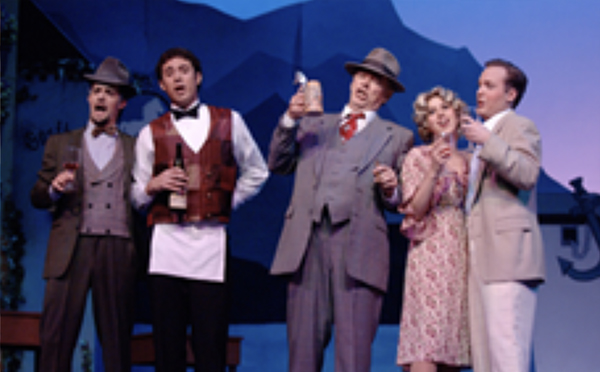
White Horse Inn
(1930)
Music by Ralph Benatzky
Original libretto by Robert Gilbert, Hans Müller, and Erik Charell
Head waiters of the White Horse Inn in Austria have found that to fall in love with the attractive young widow who owns the establishment is a swift and certain route to dismissal. Yet none have been able to resist Josepha, least of all Leopold, the present incumbent. She pines for Dr. Otto Siedler, a visiting lawyer from Berlin and regular visitor to the inn, but she is resolutely blind to all evidence that his thoughts for her are no more than warm friendship. Siedler is incensed when he arrives and finds that his usual room has been given by a spiteful Leopold to Ottilie and her father, Herr Giesecke, a manufacturer of ladies’ underwear. Siedler’s rage is somewhat mollified when he falls hard for Ottilie who, however, has been set up for a commercially viable marriage to Sigismund, the son of Giesecke’s business rival. The eventual arrival of His Imperial Majesty, Emperor Franz Joseph, serves at first only to add to the acrimonious chaos, but finally his kindly understanding and wisdom do much to bring about the statutory happy ending, with Josepha finally realizing her true love for Leopold.
Conductor Steven Byess
Stage Director Julie Wright
Choreographer Carol Hageman
Set Designer Richard Traubnerr
Costume Designer Daniel Jones
Lighting Designer Shannon Schweitzer
Assistant Stage Director Amy Pfrimmer
Kathi, postmistress Erin Jackson
Zenzi Sahara Glasener
Piccolo, a young waiter Rachel Rowe
Tour Guide Kevin Blickfeldt
Leopold Brandemeyer, headwaiter Anthony Maida
Josepha Vogelhuber, headmistress of the Inn Julie Wright
Dr. Otto Siedler, lawyer from Vienna Grant Knox
Wilhelm Giesecke, Berlin manufacturer Boyd Mackus
Ottilie, his daughter Sarah Asmar
Sigismund Sülzheimer, Berlin manufacturer Gregory Brookes
Professor Dr. Hinzelmann, a tutor from Vienna Oliver Henderson
Klärchen, his daughter Jessie Wright Martin
Kaiser Franz Josef II Jonathan Michie
Grünwald, forester Jeremiah Butterfield
Women of the Ensemble: Sarah Asmar, Julianna Byess, Sara Gartland, Lisa Gerstenkorn, Sahara Glasener, Catherine Greer, Jessica Hornsten, Erin Jackson, Shannon Langman, Claire Maloney, Jessie Wright Martin, Danielle McCormick, Valerie Hart Nelson, Amy Pfrimmer, Rachel Rowe, Kari Sorenson, Julie Wright
Men of the Ensemble: James Barbato, Kevin Blickfeldt, Gregory Brookes, John Buffett, Jeremiah Butterfield, Vernon Di Carlo, Samuel Haddad, Oliver Henderson, Patrick Howle, Grant Knox, Justin Legris, Boyd Mackus, Anthony Maida, Jonathan Michie, Zachary Wilder
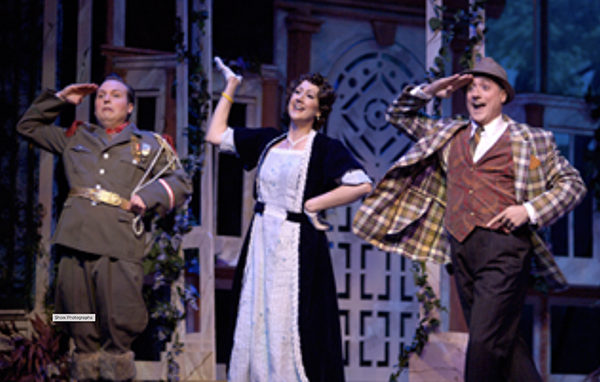
A Soldier’s Promise
(1911)
Music by Emmerich Kálmán
Original libretto by Victor Léon
Caroline, the blind proprietress of an Austrian castle, and her daughter, Marlene, await the arrival of their son and brother Franz from a long absence at war. It is not Franz who arrives, however, but rather his friend Alwin who, unable to break the news to the women that Franz has apparently been killed in action, assumes the identity of his wartime friend. Obvious complications arise when Alwin falls in love with Marlene, and she experiences non-brotherly feelings toward him. Alwin has no choice but to reveal the ruse and be welcomed into the family as a new son.
Conductor Steven Byess
Stage Director Steven Daigle
Choreographer Carol Hageman
Set Designer Kirk Domer
Costume Designer Charlene Gross
Lighting Designer Shannon Schweitzer
Assistant Stage Director Amy Pfrimmer
Caroline Von Gubendorf Julie Wright
Marlene, her daughter Sara Gartland
Martin, Baron of Schenkenbach – District Commissar Patrick Howle
Vitus Rabenlechner, mushroom farmer Anthony Maida
Walpurga, his daughter Sandra Ross
Stefan, Vitus’ half-brother Grant Knox
Alwin von Kammerer, Hussar officer Joshua Kohl
Stanzi, housekeeper Elizabeth Mitchell
Ramsauer, town magistrate Michael Hix
Imma Jungfrau Nimmerküsste, his daughter Sahara Glasener
The Parish Priest Oliver Henderson
Boni Strassmayer, estate manager Justin Legris
Laczi Bauer, a local Spiro Matsos
Wilhelm Weidiger, a local merchant John Buffett
Heidi Petko, a servant Rachel Rowe
Sari Rühmkopf, a servant Erin Jackson
Juliska Fiebeger, a cook Jessica Hornsten
Women of the Ensemble: Sara Gartland, Sahara Glasener, Jessica Hornsten, Erin Jackson, Elizabeth Mitchell, Sandra Ross, Rachel Rowe, Julie Wright
Men of the Ensemble: John Buffett, Oliver Henderson, Michael Hix, Patrick Howle, Grant Knox, Joshua Kohl, Justin Legris, Anthony Maida, Spiro Matsos

Maytime
(1917)
Music by Sigmund Romberg
Libretto by Rida Johnson Young and Cyrus Wood
The multi-generational story concerns the frustrated love affair of Richard and Ottilie, whose father compels her to marry instead the chronic gambler Claude. Left penniless at Claude’s death years later, she is also left hopeless as Richard has, in the meantime, married someone else. Many years pass; Ottilie has died, but her granddaughter, also named Ottilie, now runs a dressmaking business in her grandmother’s old house. Richard’s grandson drops by the shop, falls in love with Ottilie, and the two together achieve the happiness that was denied their grandparents.
Conductor Steven Byess
Stage Director Julie Wright
Choreographer Carol Hageman
Set Designer Tymberley A. Wittrig
Costume Designer Charlene Gross
Lighting Designer Danielle Baisden
John Wayne Sam Haddad
Richard Wayne, his son Vernon Di Carlo Joshua Kohl
Colonel Van Zandt Michael Hix
Ottilie, his daughter Amy Pfrimmer Robin De Leon
Claude Van Zandt Justin Legris
Matthew Van Zandt Tyler Nelson
Mathilda Van Zandt, Matthew’s first wife Alta Boover
Angelica, Matthew’s second wife Lisa Gerstenkorn
Lizzie, Matthew’s third wife Jessica Hornsten
Maitre d’ Brian Tanner
Alice Tremaine Kari Sorenson
Maria Sarah Walker
Rudolfo Brian Tanner
Madame Delphine Catherine Greer
Algernon Zachary Wilder
John Rutherford James Barbato
Mr. Hicks, auctioneer Jonathan Michie
Ermintrude D’Albert Shannon Langman
Gladys Valerie Hart Nelson
Hortense Elizabeth Mitchell
Phyllis, a model Sarah Walker
Winnifred St. Albans Erin Jackson
Young Ottilie & Madame Brown, Ottilie’s granddaughter Danielle McCormick
Young Richard Wayne & ‘Dicky’ Wayne, Richard Wayne’s grandson Grant Knox
Women of the Ensemble: Sarah Asmar, Alta Boover, Julianna Byess, Robin De Leon, Lisa Gerstenkorn, Catherine Greer, Jessica Hornsten, Erin Jackson, Shannon Langman, Danielle McCormick, Elizabeth Mitchell, Valerie Hart Nelson, Amy Pfrimmer, Sandra Ross, Rachel Rowe, Kari Sorenson, Sarah Walker
Men of the Ensemble: James Barbato, Jeremiah Butterfield, Vernon Di Carlo, Samuel Haddad, Oliver Henderson, Michael Hix, Grant Knox, Joshua Kohl, Justin Legris, Jonathan Michie, Tyler Nelson, Brian Tanner, Zachary Wilder

A Friend of Napoleon
(2005) World Première
Music & Lyrics by James Stuart & Robert Ward
Papa Chibou has come to Paris from the south of France with the idea of planting asparagus along its beautiful boulevards. Finding that such a practice is forbidden, he takes a job as watchman in a wax museum. He becomes particularly attached to a miserable statue of a man (one of his ears had come into contact with a steam radiator) wearing a three-cornered cocked hat and with his left hand shoved into his bosom. He knows nothing about this forsaken creature other than that his name is Napoleon. One spring day, Nina, a young American girl who is chaperoned by her aunt Alice, encounters at the museum the handsome Georges Dufayel, a young attorney with an extremely promising future. Papa Chibou becomes involved in their clandestine love-at-first-sight affair. What will happen when the World of Wax becomes bankrupt and Papa Chibou tries to save the statue of Napoleon from the auction block?
Conductor J. Lynn Thompson
Stage Director Steven Daigle
Choreographer Carol Hageman
Set Designer Kirk Domer
Costume Designer Charlene Gross
Lighting Designer Danielle Baisden
Papa Chibou Oliver Henderson
Nina Seibel Sara Gartland
Georges Dufayel Joshua Kohl
Nanny Valerie Hart Nelson
Aunt Alice Alta Boover
Monsieur Pratoucy Gregory Brookes
Marie Antoinette Sarah Asmar
Charlotte Corday Sahara Glasener
Attila Vernon Di Carlo
Marat Patrick Howle
Rasputin Jeremiah Butterfield
The Auctioneer Jonathan Michie
Mogen John Buffett
Keeper Anthony Maida
Jailer Kevin Blickfeldt
Judge Bertouf Michael Hix
Judge Goblin Sam Haddad
Judge Perouse James Barbato
Women of the Ensemble: Sarah Asmar, Alta Boover, Robin De Leon, Sara Gartland, Sahara Glasener, Catherine Greer, Jessica Hornsten, Erin Jackson, Shannon Langman, Claire Maloney, Danielle McCormick, Elizabeth Mitchell, Valerie Hart Nelson, Amy Pfrimmer, Rachel Rowe, Kari Sorenson, Sarah Walker
Men of the Ensemble: James Barbato, Kevin Blickfeldt, Gregory Brookes, John Buffett, Jeremiah Butterfield, Vernon Di Carlo, Samuel Haddad, Oliver Henderson, Michael Hix, Patrick Howle, Joshua Kohl, Justin Legris, Anthony Maida, Jonathan Michie, Tyler Nelson, Brian Tanner, Zachary Wilder
2004 Season
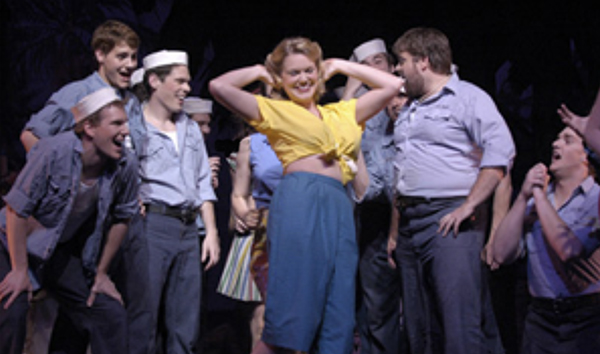
South Pacific
(1949)
Music by Richard Rodgers
Book by Oscar Hammerstein II and Joshua Logan
Set in an island paradise during World War II, two parallel love stories are threatened by the dangers of prejudice and war. Nellie, a spunky nurse from Arkansas, falls in love with a mature French planter, Emile. Nellie learns that the mother of his children was an island native and, unable to turn her back on the prejudices with which she was raised, refuses Emile’s proposal of marriage. Meanwhile, the strapping Lt. Joe Cable denies himself the fulfillment of a future with an innocent Tonkinese girl with whom he’s fallen in love out of the same fears that haunt Nellie. When Emile is recruited to accompany Joe on a dangerous mission that claims Joe’s life, Nellie realizes that life is too short not to seize her own chance for happiness, thus confronting and conquering her prejudice.
Conductor J. Lynn Thompson
Stage Director Steven Daigle
Choreographer Carol Hageman
Set Designer Tymberley Wittrig
Costume Designer Damita Peace
Lighting Designer Shannon Schweitzer
Ensign Nellie Forbush Sahara Glasner Kemper LeCroy
Émile de Becque Boyd Mackus
Ngana, his daughter Polly Dexter Emily Neill
Jerome, his son Jacob Greathouse Chase Smith
Henry, his servant Carl Bara
Bloody Mary Alta Boover Ingrid Young
Liat, her daughter Rosanna Yoder
Luther Billis Gregory Brookes
Stewpot, George Watts Nathan Brian
Professor Brian Woods
Lt. Joseph Cable, USMC Grant Knox Timothy Oliver
Captian George Brackett, USN James Harr
Commander William Harbison, USN Patrick Howle
Lt. Buzz Adams Joshua Kohl
Yeoman Herbert Quale, sailor Lee Matsos
2 Seabees David Haslam Kevin Blickfeldt
2 Sailors Chris Lyons Drake Dantzler
3 Marines Joshua Kohl Nathan Brian Lee Matsos
McCaffrey Kevin Blickfeldt
A Shore Patrolman David Haslam
Lead Nurse Rachel Rowe
Ensign Dinah Murphy Elizabeth Mitchell
Ensign Janet MacGregor Sara Gartland
Women of the Ensemble: Alta Boover, Robin De Leon, Polly Dexter, Sara Gartland, Sahara Glasener, Shannon Langman, Kemper LeCroy, Danielle McCormick, Dominique McCormick, Sarah Minckler, Elizabeth Mitchell, Emily Neill, Rachel Rowe, Sarah Walker, Rosanna Yoder, Ingrid Young
Men of the Ensemble: Carl Bara, Kevin Blickfeldt, Gregory Brookes, Nathan Brian, Drake Dantzler, James Harr, David Haslam, Jacob Greathouse, Patrick Howle, Grant Knox, Joshua Kohl, Chris Lyons, Boyd Mackus, Lee Matsos, Timothy Oliver, Chase Smith, Brian Woods

The Merry Widow
(1905)
Music by Franz Lehár
Based on Comedy by Henri Meilhac
In gay Paris, a birthday party for the ruler of the imaginary land of Marsovia is in full swing. Wealthy Hanna is surrounded by suitors, to the despair of Marsovian diplomat Baron Popoff, who fears she will bankrupt their country if she marries a foreigner. He cleverly convinces Prince Danilo, the minister of finance, to woo Hanna, though the prince has been rejected once. While Hanna lavishes special attention on the prince, he feigns indifference until she announces her engagement to a Frenchman. In agony, he at last reveals his true love to Hanna and discovers with joy that her engagement is a fiction and that she shares his passionate feelings.
Conductor J. Lynn Thompson
Stage Director Nicholas Wuehrmann
Choreographer Carol Hageman
Set Designer Kirk Domer
Costume Designer Jasen J. Smith
Lighting Designer Shannon Schweitzer
Viscount Cascada, a Parisian Noble Drake Dantzler
Baron Mirko Zeta, Pontevedrian Ambassador of France Boyd Mackus
Raoul de St. Brioche, a noble Parisian Patrick Howle
Footman Grant Knox
Bagdonovitch, Pontevedrian Military Attaché David Haslam
Kromov, Pontevedrian Special Envoy Lee Matsos
Pritzl, Pontevedrian Consul Gregory Brookes
Mrs. Pritzl Ingrid Young
Camille de Rosillon, a Young Parisian Timothy Oliver Brian Woods
Valencienne, Wife of Baron Zeta Betha Christopher Sara Gartland
Njegus, Major-Domo to the Embassy Justin Legris
Hanna Glavari, the Merry Widow Robin De Leon Dominique McCormick
Count Danilo, Undersecretary to the Pontevedrian Embassy Ted Christopher Oliver Henderson
The Grisettes of Maxim’s
Lolo Kemper LeCroy
Dodo Danielle McCormick
Joujou Erin Jackson
Froufrou Rachel Rowe
Cloclo Sarah Walker
Margot Penny Hansen
Armand, Maitre d’ of Maxim’s Spiro Matsos
Women of the Ensemble: Alta Boover, Betha Christopher, Robin De Leon, Sara Gartland, Penny Hansen, Jessica Hornsten, Erin Jackson, Shannon Langman, Kemper LeCroy, Danielle McCormick, Dominique McCormick, Elizabeth Mitchell, Rachel Rowe, Sarah Walker, Ingrid Young
Men of the Ensemble: Carl Bara, Gregory Brookes, Ted Christopher, Drake Dantzler, Oliver Henderson, Patrick Howle, Grant Knox, Joshua Kohl, Chris Lyons, Justin Legris, Boyd Mackus, Lee Matsos, Spiro Matsos, Timothy Oliver, Brian Woods
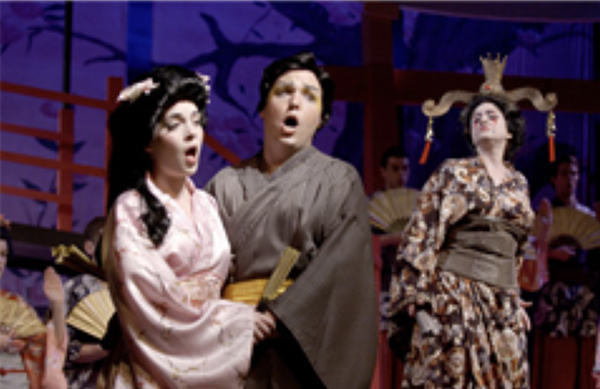
The Mikado
(1885)
Music by Sir Arthur Sullivan
Words by William S. Gilbert
Nanki-Poo has fled the court of his father, the Mikado of Japan, to escape marriage with an elderly lady. He disguises himself as a musician, then falls in love with a fair maiden, Yum-Yum. However, he has been prevented from marrying her by her guardian, Ko-Ko, who wishes to marry Yum-Yum himself.
Conductor J. Lynn Thompson
Stage Director Julie Wright
Choreographer Carol Hageman
Set Designer Kirk Domer
Costume Designer Jasen J. Smith
Lighting Designer Shannon Schweitzer
The Mikado of Japan Kenneth Kramer Nathan Brian
Nanki-Poo, his son, in disguise as a wandering minstrel Drake Dantzler Grant Knox
Ko-Ko, Lord High Executionor of Titipu Frederick Reeder
Pooh-Bah, Lord High Everything Else Gregory Brookes James Mismas
Pish-Tush, a Noble Lord Patrick Howle Boyd Mackus
Yum-Yum, ward of Ko-Ko Penny Hansen Danielle McCormick
Pitti-Sing, ward of Ko-Ko Betha Christopher Sahara Glasener
Peep-Bo, ward of Ko-Ko Erin Jackson
Katisha, an eldery Lady, in love with Nanki-Poo Alta Boover Julie Wright
Women of the Ensemble: Alta Boover, Betha Christopher, Sara Gartland, Sahara Glasener, Penny Hansen, Jessica Hornsten, Erin Jackson, Kemper LeCroy, Danielle McCormick, Dominique McCormick, Sarah Minckler, Elizabeth Mitchell, Sandra Ross, Rachel Rowe, Sarah Walker, Julie Wright
Men of the Ensemble: Carl Bara, Kevin Blickfeldt, Gregory Brookes, Nathan Brian, Drake Dantzler, James Harr, David Haslam, Oliver Henderson, Patrick Howle, Grant Knox, Chris Lyons, Justin Legris, Kenneth Kramer, Boyd Mackus, Lee Matsos, James Mismas, Timothy Oliver, Frederick Reeder
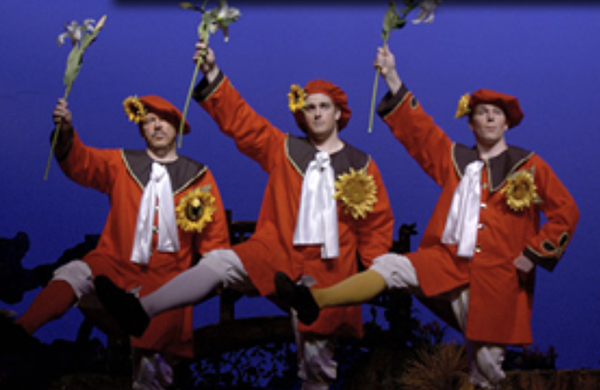
Patience
(1881)
Music by Sir Arthur Sullivan
Words by William S. Gilbert
The two protagonists, poets in the light of the artistic movement, provide consistent amusement. Reginald Bunthorne and Archibald Grosvenor compete for the love of Patience, a mere Dairy Maid, who vows to love unselfishly, thus providing the humorous dilemma of the story. Patience, though clearly fond of Grosvenor, admits her unselfish love for Bunthorne out of mere duty. The drama, in which the Fleshly and Idyllic poets compete for the love of the Dairy Maid, continues until Bunthorne threatens to curse his rival unless he immediately becomes utterly commonplace. Grosvenor agrees and thus Patience may turn to him because he has become so ordinary. Patience can finally love him unselfishly because he is no longer perfect. Bunthorne, however, is left with nothing but his depiction as the aestetic ideal.
Conductor J. Lynn Thompson
Stage Director Steven Daigle
Choreographer Carol Hageman
Set Designer Tymberley Wittrig
Costume Designer Damita Peace
Lighting Designer Shannon Schweitzer
Colonel Calverley, Officer of Dragoon Guards Boyd Mackus
Major Murgatroyd, Officer of Dragoon Guards Nathan Brian
Lieutenant – The Duke of Dunstable, Officer of Dragoon Guards Joshua Kohl
Reginald Bunthrone, A Fleshly Poet Frederick Reeder
Archibald Grosvenor, an Idyllic Poet Ted Christopher
Mr. Bunthrone’s Solicitor Michael Mullins
The Lady Angela, a Rapturous Maiden Sandra Ross
The Lady Ella, a Rapturous Maiden Betha Christopher
The Lady Jane, a Rapturous Maiden Elizabeth Mitchell
The Lady Saphir, a Rapturous Maiden Shannon Langman
Patience, a Dairy Maiden Sarah Minckler
Women of the Ensemble: Alta Boover, Julianna Byess, Betha Christopher, Robin De Leon, Sahara Glasener, Penny Hansen, Jessica Hornsten, Erin Jackson, Shannon Langman, Danielle McCormick, Dominique McCormick, Sarah Minckler, Elizabeth Mitchell, Sandra Ross, Ingrid Young
Men of the Ensemble: Kevin Blickfeldt, Nathan Brian, Ted Christopher, James Harr, Oliver Henderson, Patrick Howle, Grant Knox, Joshua Kohl, Chris Lyons, Justin Legris, Boyd Mackus, Frederick Reeder, Timothy Oliver
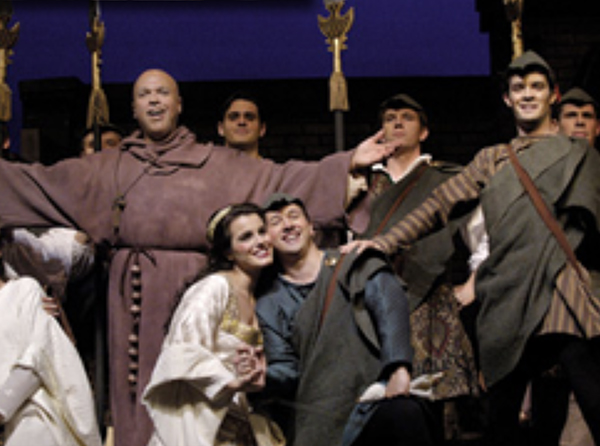
Robin Hood
(1890)
Music by Reginald De Koven
Book by Harry B. Smith
In this story, Robert, the Earl of Huntington is stripped of his title and becomes Robin Hood. With the moral assistance of Maid Marian, he robs the rich to help the poor, until his title is restored. Will Scarlett, Little John, Friar Tuck and The Sheriff of Nottingham are all present just as they are in the traditional versions of the story.
Conductor J. Lynn Thompson
Stage Director James Stuart
Choreographer Carol Hageman
Set Designer Tymberley Wittrig
Costume Designer Jasen J. Smith
Lighting Designer Shannon Schweitzer
Orchestration Recovery and Arrangments Quade Winter
Robert of Locksley, afterwards Robin Hood Timothy Oliver
Sheriff of Nottingham Frederick Reeder
Sir Guy Gisborne, his ward Brian Woods
The Merrymen:
Allan-a-Dale Sandra Ross
Little John Oliver Henderson
Will Scarlett Gregory Brookes
Friar Tuck James Mismas
Lady Marian Fitzwalter, ward of the Crown Dominique McCormick
Dame Durden, a widow Alta Boover
Annabel, her daughter Danielle McCormick
Women of the Ensemble: Alta Boover, Betha Christopher, Robin De Leon, Sara Gartland, Sahara Glasener, Penny Hansen, Jessica Hornsten, Erin Jackson, Shannon Langman, Kemper LeCroy, Danielle McCormick, Dominique McCormick, Sarah Minckler, Elizabeth Mitchell, Sandra Ross, Rachel Rowe, Sarah Walker, Rosanna Yoder, Ingrid Young
Men of the Ensemble: Carl Bara, Drake Dantzler, Kevin Blickfeldt, Gregory Brookes, Nathan Brian, Ted Christopher, James Harr, Grant Knox, David Haslam, Oliver Henderson, Patrick Howle, Joshua Kohl, Chris Lyons, Justin Legris, Lee Matsos, James Mismas, Timothy Oliver, Frederick Reeder, Brian Woods
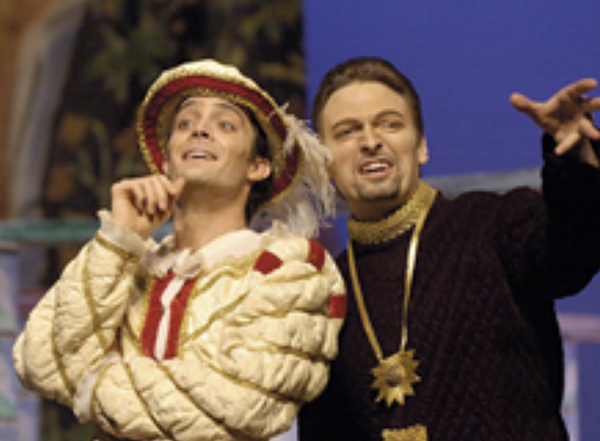
The Vagabond King
(1925)
Music by Rudolf Friml
Book by Brian Hooker & Willmarth H. Post
In this romantic and robust operetta, the swaggering thief François Villon is made king for a day as part of a wager. He rallies beggars and vagabonds to defeat Burgundy, thus redeeming himself and subsequently wins the hand of the royal Katherine de Vaucelles.
Conductor Steven Byess
Stage Director Steven Daigle
Choreographer Carol Hageman
Set Designer Dale Seeds
Costume Designer Jasen J. Smith
Lighting Designer Shannon Schweitzer
Rene de Montigny Nathan Brian
Casin Cholet Carl Bara
Margot Kemper LeCroy Ingrid Young
Hugette Sandra Ross
Jehannaton Erin Jackson
Guy Tabarie Patrick Howle
Tristan L’Hermite Gregory Brookes
Louis XI Brian Woods
François Villion Ted Christopher Oliver Henderson
Katherine de Vaucelles Sarah Minckler Julie Wright
Thibault D’Aussigny Justin Legris
Captain of the Scotch Archers Kevin Blickfeldt
An Astrologer Joshua Kohl
Lady Mary Shannon Langman
Noel Le Jolys Drake Dantzler
Oliver Le Dain James Harr
Toison D’Or Chris Lyons
Queen Erin Jackson
Women of the Ensemble: Betha Christopher, Sara Gartland, Sahara Glasener, Penny Hansen, Jessica Hornsten, Erin Jackson, Shannon Langman, Kemper LeCroy, Sarah Minckler, Sandra Ross, Rachel Rowe, Sarah Walker, Julie Wright, Rosanna Yoder, Ingrid Young
Men of the Ensemble: Kevin Blickfeldt, Carl Bara, Gregory Brookes, Nathan Brian, Ted Christopher, Drake Dantzler, James Harr, David Haslam, Oliver Henderson, Patrick Howle, Joshua Kohl, Chris Lyons, Justin Legris, Lee Matsos, Timothy Oliver, Brian Woods
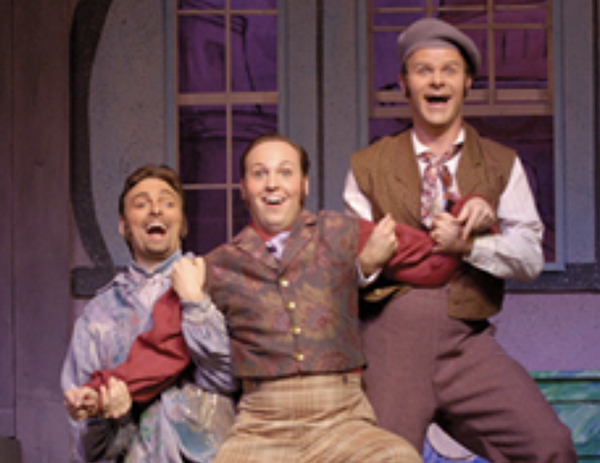
The Violet of Montmartre
(1930)
Music & Lyrics by Emmerich Kálmán
Starving artists in a Parisian garret adopt a neighborhood girl as their friend and confidante.
Conductor Steven Byess
Stage Director Steven Daigle
Choreographer Carol Hageman
Set Designer Kirk Domer
Costume Designer Jasen J. Smith
Lighting Designer Shannon Schweitzer
Raoul Delacroix, a painter Brian Woods
Henry Murger, a poet Ted Christopher
Florimond Hervé, musician Grant Knox
Ninon, a grisette Robin De Leon
General Pipo de Frascatti, Minister of Fine Arts James Harr
Violetta Cavallini, a street singer, called “The Violet of Montmartre” Nancy María Balach
Parigi, her gaurdian – a street musician Kevin Blickfeldt
Baron Jacob Rothchild Boyd Mackus
François Pisquatschec, the town bailiff Gregory Brookes
Camille Blumé, art dealer and theater fan Joshua Kohl
The Director of the Vaudeville Theater in Paris Justin Legris
Secretary Leblanc of the Ministry of Fine Arts Oliver Henderson
Armand, an elderly bohemian Spiro Matsos
Maurice, theatre usher Lee Matsos
Cast members of A Kiss in Springtime
Lolette Shannon Langman
Chochette Betha Christopher
Fleurette Penny Hansen
Bébé, a messenger of the dress shop “The Two Monkeys” Julianna Byess
Frapeau, the stage manager Nathan Brian
Margot, maid of Ninon’s Rachel Rowe
A Kitchen Boy David Haslam
Women of the Ensemble: Nancy María Balach, Julianna Byess, Betha Christopher, Robin De Leon, Sara Gartland, Sahara Glasener, Penny Hansen, Jessica Hornsten, Shannon Langman, Danielle McCormick, Dominique McCormick, Sarah Minckler, Elizabeth Mitchell, Sandra Ross, Rachel Rowe, Rosanna Yoder
Men of the Ensemble: Carl Bara, Kevin Blickfeldt, Gregory Brookes, Nathan Brian, Ted Christopher, Drake Dantzler, James Harr, David Haslam, Oliver Henderson, Grant Knox, Joshua Kohl, Justin Legris, Boyd Mackus, Lee Matsos, Spiro Matsos, Brian Woods
2003 Season
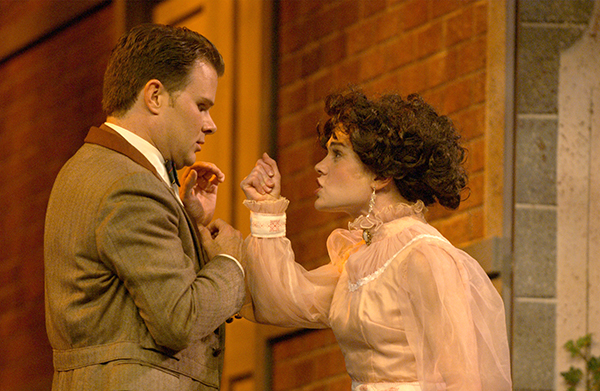
My Fair Lady
(1958)
Music & Lyric by Lerner & Loewe
Based on Pygmalion by George Bernard Shaw
When Henry Higgins, a well-to-do, self-centered bachelor professor of languages, and his friend Colonel Pickering encounter raggedy flower girl Eliza Doolittle (selling flowers to passersby), Henry is inspired to make a wager with Pickering. In a mere six months, he bets, through voice and diction adjustment, he can transform this street person into a proper lady. Eliza accompanies Henry to his home on upscale Wimpole Street. Henry and Pickering eventually escort Eliza to the Ascot horse races, where she thoroughly charms wealthy young bachelor Freddy Eynsford-Hill. Henry offers little praise to Eliza for her accomplishments. Hurt and angry, Eliza returns to her squalid former life. She realizes that she wishes to have her new life back. Back on Wimpole Street, as Henryponders the surprising discovery that he misses Eliza, she enters the room. Smugly, Henry breathes a sigh of relief, hoping that life is, as he perceives it, back to normal.
Stage Director Steven Daigle
Choreographer Carol Hageman
Set Designer Tymberley Wittrig
Costume Designer Jasen Smith
Lighting Designer Krystal Kennel
Conductor J. Lynn Thompson
Eliza Doolittle Lauren Beatty Robin Bricker
Colonel Pickering Anthony Maida
Henry Higgins Ted Christopher Ben Smith
Freddy Eynsford-Hill Grant Knox Nathan Brian
Mrs. Eynsford-Hill Betha Curtis
Mrs. Pearce Julie Wright
Alfred P. Doolittle Greg Brookes Harry Patrick Howle
Jamie Justin Legris
2 Maids
Candice Coffey, Lucy Cambell-Weber
Mrs. Higgins Sandra Ross
Cockneys
Oliver Henderson, Matthew Pelliccia, Jonathan Stinson, David Wannen
Flower Girls
Sahara Glasener, Dominique McCormick, Sarah Minckler, Jami Rhodes
Servants of Henry Higgins
Lucy Cambell-Weber, Candice Carnes, Danielle McCormick, Drake Dantzler, Wade Woodward
Chorus: Nathan Brian, Lucy Cambell-Weber, Aline Carnes, Candice Coffey, Betha Curtis, Drake Dantzler, Sahara Glasener, Oliver Henderson, Patrick Howle, Justin Legris, Sarah Minckler, Danielle McCormick, Dominique McCormick, Matthew Pelliccia, Jami Rhodes, Jonathan Stinson, David Wannen, Wade Woodward

The Pirates of Penzance
(1879)
Music by Arthur Sullivan
Book by W. S. Gilbert
The setting is 19th century Cornwall. Because of an error by the nurse Ruth, Frederic has been apprenticed to the Pirate King and is out of his indentures, having reached his 21st birthday. He falls in love with Mabel, daughter of Major General Stanley, and decides that, for the sake of society, his former associates must be exterminated. As the police expedition against the pirates is about to set out, the Pirate King informs Frederic that he was born in leap year on February 29 and that his contract states that he is apprenticed until his 21st birthday, not his 21st year. He feels honor-bound to rejoin the pirates. The pirates defeat the policemen, but submit when called upon to do so in Queen Victoria’s name. Ruth reveals that the pirates are all noblemen who have “gone wrong,” and the snobbish Major General Stanley orders them to be released and to resume their former positions. The pirates marry his daughters, and Mabel and Frederic are united.
Stage Director Julie Wright
Choreographer Carol Hageman
Set Designer Tymberley Wittrig
Costume Designer Jasen Smith
Lighting Designer Krystal Kennel
Assitant Director Ted Christopher
Conductor Steven Byess
Pirate King Greg Brookes Jonathan Stinson
Samuel Patrick Howle
Ruth Alta Boover Jami Rhodes
Mabel Robin Bricker Sarah Minckler
Major General Stanley Nicholas Wuehrmann
Frederic Jason Bridges Drake Dantzler
Edith Danielle McCormick
Kate Sahara Glasener
Isabella Lucy Cambell-Weber
Sergeant of Police David Wannen
Policemen
Nathan Brian, Oliver Henderson, Grant Knox, Justin Legris, Ben Smith
Chorus: Nathan Brian, Lucy Cambell-Weber, Candice Coffey, Betha Curtis, Sahara Glasener, Oliver Henderson, Patrick Howle, Grant Knox, Justin Legris, Danielle McCormick, Dominique McCormick, Matthew Pellica, Amy Pfrimmer, Sandra Ross, Arlene Simmonds, Ben Smith, Brian Woods, Wade Woodward
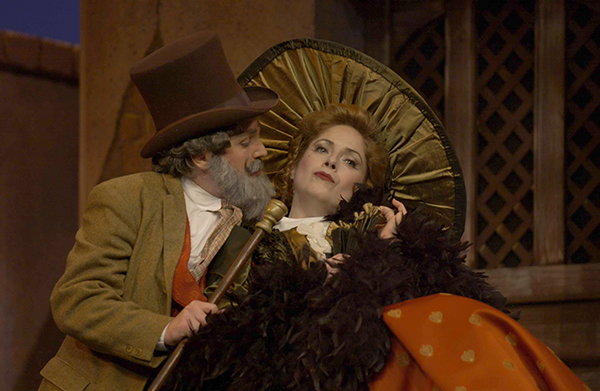
The Grand Duke
(1896)
Music by Arthur Sullivan
Book by W. S. Gilbert
An old law banning dueling, states that instead, contestants will draw a card, and the one drawing the lowest card will become technically and legally dead. Ludwig, leading actor of Ernest Dumkoff’s theatrical troupe, challenges the miserly Grand Duke Rudolph to such a duel and wins. Ludwig takes over the reins of government. There are soon many claimants to Ludwig’s hand: his own fiancée, the soubrette, Lisa; leading lady Julia Jellicoe; the aging Baroness, who had been married to Rudolph; and the Princess of Monte Carlo, engaged to the Grand Duke in infancy. Eventually, all is resolved when the notary Dr. Tannhauser discovers that the law states that the ace which Ludwig drew in the duel always counts low. So, Ludwig never was Grand Duke, and the couples sort themselves out to their mutual satisfaction.
Stage Director Steven Daigle
Choreographer Carol Hageman
Set Designer Dale Seeds
Costume Designer Jasen Smith
Lighting Designer Shannon Schweitzer
Assistant Director Brian Woods
Conductor J. Lynn Thompson
Rudolph Oliver Henderson
Ernest Dumkoff Grant Knox
Ludwig Ted Christopher
Dr. Tannhauser Nicholas Wuehrmann
The Prince of Monte Carlo Wade Woodward
Ben Hashbaz Justin Legris
Herald Jonathan Stinson
The Princess of Monte Carlo Aline Carnes
The Baroness von Krakenfelt Jami Rhodes
Julia Jellico Julie Wright
Lisa Sandra Ross
Olga Arlene Simmonds
Gretchen Lauren Beatty
Bertha Betha Curtis
Chamberlains
Jason Bridges, Ben Smith, Justin Legris, Jonathan Stinson, Patrick Howle, Brian Woods, Nathan Brian
Ensemble: Lauren Beatty, Alta Boover, Nathan Brian, Robin Bricker, Jason Bridges, Lucy Cambell-Weber, Aline Carnes, Candice Coffey, Emily Cornelius, Betha Curtis, Oliver Henderson, Patrick Howle, Grant Knox, Justin Legris, Anthony Maida, Sarah Minckler, Danielle McCormick, Amy Pfrimmer, Sandra Ross, Arlene Simmonds, Ben Smith, Jonathan Stinson, Brian Woods, Wade Woodward
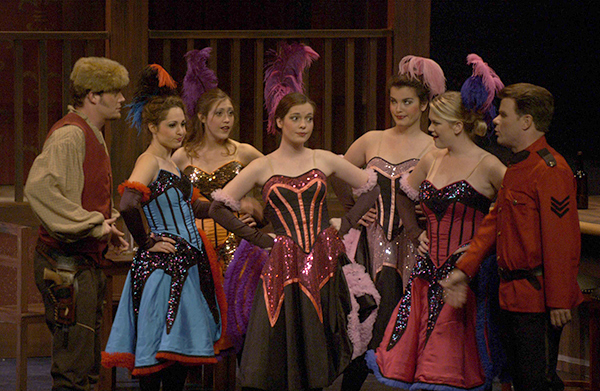
Rose Marie
(1924)
Music by Rudolf Friml and Herbert Stothart
Book and Lyrics by Otto Harbach and Oscar Hammerstein II
Rose Marie la Flamme, the sister of a French Canadian trapper, is in love with a miner, Jim Kenyon. Her brother wants her to wed a man from the city, Edward Hawley. Hawley’s ex-mistress Wanda stabs her husband Black Eagle to death. Hawley plots to put the blame of the death on Jim Kenyon. Sergeant Malone and the Canadian Mounties pursue the elusive Kenyon. Rose Marie is gradually persuaded that Jim really is the killer. She agrees to marry Hawley. Kenyon’s friend, “Hard-boiled” Herman, discovers the real truth behind Black Eagle’s death. Betrayed, Wanda interrupts their wedding with her dramatic revelation. With the truth told, Rose Marie and Jim can finally be together.
Stage Director Steven Daigle
Choreographer Carol Hageman
Set Designer Tymberley Wittrig
Costume Designer Jasen Smith
Lighting Designer Krystal Kennel
Conductor Steven Byess
Rose Marie Le Flamme Amy Pfrimmer Arlene Simmonds
Sergeant Malone Ted Christopher
Jim Kenyon Jason Bridges Brian Woods
Lady Jane Alta Boover Sandra Ross
Edward Hawley Boyd Mackus
Émile La Flamme Ben Smith
Wanda Betha Curtis
Hard Boiled Herman Wade Woodward
Ethel Brander Lucy Cambell-Weber
Black Eagle David Wannen
Caretaker Matthew Pelliccia
Chorus: Lauren Beatty, Nathan Brian, Robin Bricker, Greg Brookes, Lucy Cambell-Weber, Aline Carnes, Ted Christopher, Candice Coffey, Drake Dantzler, Sahara Glasener, Oliver Henderson, Patrick Howle, Grant Knox, Anthony Maida, Sarah Minckler, Danielle McCormick, Dominique McCormick, Mathew Pelliccia, Jami Rhodes, Ben Smith, Jonathan Stinson, David Wannen
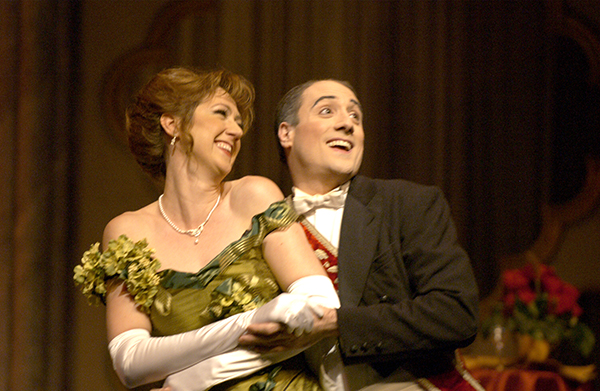
Countess Maritza
(1924)
Music & Lyrics by Emmerich Kálmán
The wealthy Countess Maritza owns an estate in the Hungarian borderlands, which is managed by the handsome Béla Török. Török is, in fact, really the Count Tassilo Endrödy Wittenburg. He remains incognito to pay off his family debts and earn a dowry for his sister, Lisa. Maritza announces a mock engagement to deter proposals she has been subject to, and she has chosen the phony name of her prospective bridegroom, Baron Koloman Zsupán. She gets a staggering surprise when a real Baron Zsupán turns up, all ready to fulfill his “engagement.” Tassilo, too, has some covering up to do, when it turns out that Lisa is part of the house party. After two acts of falling in love, misunderstandings and clearing up of the same misunderstandings, Maritza and Tassilo come together in a happy ending, alongside Lisa and the pig-farming Baron Zsupán.
Stage Director Nicholas Wuehrmann
Choreographer Carol Hageman
Set Designer Kirk Domer
Costume Designer Shelley Alexander Cornia
Lighting Designer Krystal Kennel
Conductor Steven Byess
Manja Dominique McCormick Amy Pfrimmer
Berko David Wannen
Tschekko Spiro Matsos
Housekeeper Alta Boover
Count Tassilo Endroulatdy-Wittenberg Brian Woods
Karl Stephen Liebenberg Patrick Howle
Prince Moritz Drogomir Popolescu Boyd Mackus
Countess Maritza Julie Wright
Baron Koloman Zsupán Anthony Maida
Gypsy Violinist Jonathan Stinson
Lisa Sandra Ross Betha Curtis
A Gentleman Greg Brookes
Ilka Lucy Cambell-Weber
Maids Lauren Beatty, Aline Carnes
Princess Bozena Alta Boover
Cuddenstein zu Chlumetz Penizek James Stuart
Children’s Chorus: Julianna Byess, Megan Earnest, Mindy Earnest, Claire Miller, Emily Neill, Jack Neill, Ben Schlabach, Sadie Schlabach
Chorus: Lauren Beatty, Alta Boover, Jason Bridges, Greg Brookes, Lucy Cambell-Weber, Aline Carnes, Ted Christopher, Drake Dantzler, Patrick Howle, Justin Legris, Boyd Mackus, Spiro Matsos, Dominique McCormick, Matthew Pellica, Amy Pfrimmer, Jami Rhodes, Arlene Simmonds, Jonathan Stinson, David Wannen
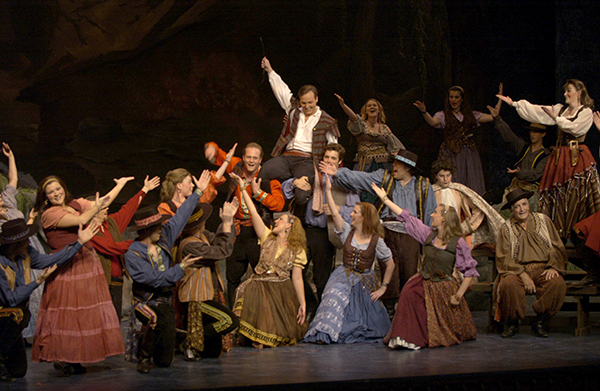
The Brigands
(1869)
Music by Jacques Offenbach
Translation by William S. Gilbert
Fragoletto, a young farmer, has turned brigand to win the heart of Fiorella, the daughter of the bandit chief Falsacappa. All three become part of a conspiracy to rob money from the Duchy of Mantua. The money is to be paid over to the representative of the government of Granada, when the country’s Princess arrives in Mantua to wed the Duke. Fiorella takes the place of the Princess, with her father impersonating the lofty Gloria-Cassis and Fragoletto as the Princess’ page. They present themselves to the Duke and his treasury, only to find that there is no money. The Duke’s secretary of treasury has spent the money courting and dining pretty ladies.
Stage Director Julie Wright
Choreographer Carol Hageman
Set Designer Kirk Domer
Costume Designer Clay Smith
Lighting Designer Shannon Schweitzer
Conductor Steven Byess
Domino Jonathan Stinson
Barbavano Greg Brookes
Carmagnola Nathan Brian
Falscappa Nicholas Wuehrmann
Pietro James Stuart
Fiorella Arlene Simmonds
Fragoletto Grant Knox
The Duke of Mantua Patrick Howle
The Baron of Campotasso Ben Smith
Marchioness Betha Curtis
Duchess Jami Rhodes
Antionio Matthew Pelliccia
Princess of Grenada Lauren Beatty
Count of Gloria Cassis Jason Bridges
Preceptor of the Princess David Wannen
Adolphe of Valadolid Justin Legris
Two Pages Robin Bricker, Candice Coffey
Captain of the Carabineers Oliver Henderson
Carabineers Alta Boover, Sandra Ross, Ted Christopher, Brian Woods
Fiametta Danielle McCormick
Zerlina Aline Carnes
Cicinella Lucy Cambell-Weber
Pipo Spiro Matsos
Pipa Sahara Glasener
Pipetta Dominique McCormick
Ensemble: Lauren Beatty, Alta Boover, Nathan Brian, Robin Bricker, Jason Bridges, Greg Brookes, Lucy Cambell-Weber, Aline Carnes, Ted Christopher, Candice Coffey, Betha Curtis, Drake Dantzler, Sahara Glasener, Oliver Henderson, Patrick Howle, Grant Knox, Justin Legris, Anthony Maida, Spiro Matsos, Sarah Minckler, Danielle McCormick, Dominique McCormick, Matthew Pelliccia, Amy Pfrimmer, Jami Rhodes, Sandra Ross, Arlene Simmonds, Ben Smith, Jonathan Stinson, David Wannen, Brian Woods, Wade Woodward
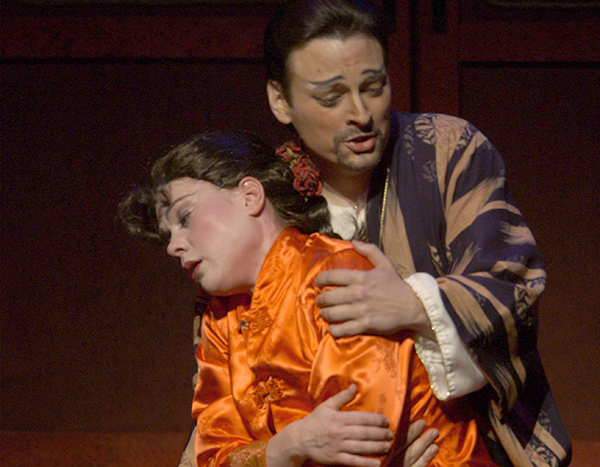
The Land of Smiles
(1923)
Music & Lyrics by Franz Lehár
Prince Sou Chong weds the Viennese Lisa and takes her back to his homeland. There she discovers that the Prince is expected by custom to take additional Chinese brides as well. He is unable to defy his traditions, and Lisa, in spite of her love for him, cannot bend to them. Aided by Sou Chong’s sister, Mi, who longs for a taste of the freedom in the West, and by her Viennese friend Gustl, she plans an escape. The Prince catches the fleeing foreigners and realizes it would be better to let Lisa leave. Sou Chong, brokenhearted, remains to continue his rule in his country.
Stage Director Steven Daigle
Choreographer Carol Hageman
Set Designer Kirk Domer
Costume Designer Jasen Smith
Lighting Designer Krystal Kennel
Assitant Director Emily Cornelius
Conductor J. Lynn Thompson
Lisa Amy Pfrimmer Dominique McCormick
Prince Sou-Chang Brian Woods Jason Bridges
Mi Lauren Beatty Danielle McCormick
Gustl Wade Woodward Oliver Henderson
Franz Nathan Brian
Fu-Li David Wannen
Prince Tschang Anthony Maida
Chi-Fu Justin Legris
General Count Lichtenfels Matthew Pelliccia
Countess Boheim Arlene Simmonds
Colonel Bloch Ben Smith
Fini Arlene Carnes
Lore Sarah Minckler
Toni Sahara Glasener
Chorus: Alta Boover, Nathan Brian, Robin Bricker, Greg Brookes, Aline Carnes, Candice Coffey, Drake Dantzler, Sahara Glasener, Grant Knox, Justin Legris, Sarah Minckler, Dominique McCormick, Jami Rhodes, Arlene Simmonds, Ben Smith, David Wannen, Nick Wuehrmann
2002 Season
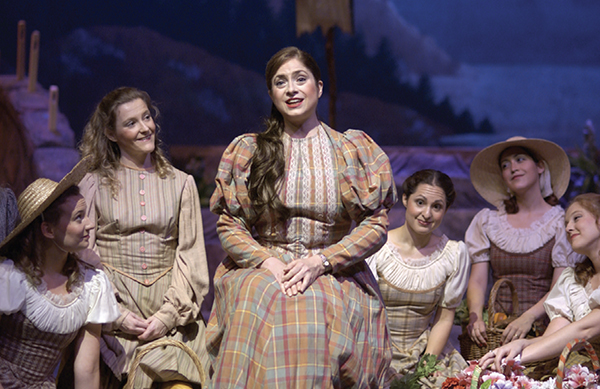
Brigadoon
(1947)
Music by Frederick Loewe
Musical play by Alan Lerner
Americans Tommy Albright and Jeff Douglass are on a hunting trip in Scotland when they stumble upon a village that does not appear on the map. It is called Brigadoon. The town is under a spell, by which it appears on earth only once in a century and, at the end of the day will vanish into sleep for another hundred years. Bring the whole family to this American classic!
Stage Director Sarah McGraw
Choreographer Carol Hageman
Set Designer Tymberley Wittrig
Costume Designer Jeffrey Meek
Lighting Designer Jen Groseth
Conductor J. Lynn Thompson
Andrew MacLaren Nathan Whitson
Angus MacGuffie Jonathan Stinson
Archie Beaton Nathan Arnett
Charlie Dalrymple Ben Smith Randall Umstead
Fiona MacLaren Julie Wright
Frank Eade Woodward
Harry Beaton Grant Knox
Jane Ashton Dominique McCormick
Jean MacLaren Leauren Beatty
Jeff Douglas Ted Christopher
Kate Betha Curtis
Meg Brockie Lauren Pastorek Ann Marie Wilcox
Mr. Lundie Brian Woods
Stuart Dalrymple Justin Legris
Tommy Albright Cassidy King David Wannen
Maggie Anderson Danielle McCormick
Sandy Dean Derek Parks
MacGregor Wade Woodward
Ensemble
Soprano: Lauren Beatty, Robin Bricker, Aline Carnes, Amy Castor, Danielle McCormick, Dominique McCormick, Arlene Simmonds, Julie Wright
Mezzo: Alta Boover, Candice Coffey, Betha Curtis, Yvonne Douthat, Sahara Galsener, Lauren Pastorek, Ann Marie Wilcox
Tenor: Nathan Arnett, Grant Knox, Justin Legris, Robert McNamara, Ben Smith, Randall Umstead, Brian Woods
Baritone and Bass: Ted Christopher, Patrick Howle, Cassidy King, Derek Parks, Jonathan Stinson, Nathan Whitson, David Wannen, Wade Woodward
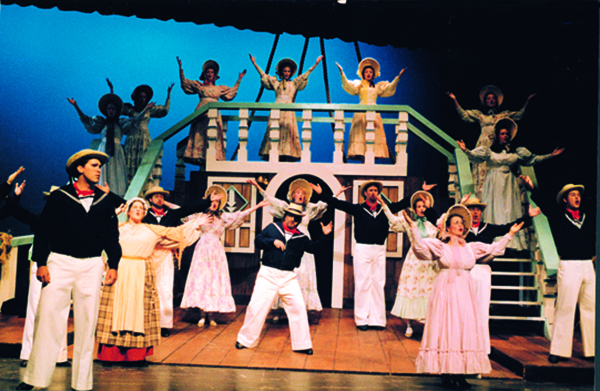
H.M.S. Pinafore
(1878)
Music by Sir Arthur Sullivan
Words by William S. Gilbert
The handsome young sailor, Ralph Rackshaw, is in love with Captain Corcoran’s daughter Josephine, however, she is betrothed to Sir Joseph. Ralph and Josephine make plans to elope. Dick Deadeye informs Captain Corcoran of Ralph and Josephine’s plans and foils the elopement. Buttercup expresses her deep affection for Captain Corcoran and reveals that the Ralph and he were switched at birth. Sir Joseph can no longer marry a woman of such a lowly rank. Now Josephine is free to marry Ralph and the Captain can unite with Little Buttercup.
Stage Director Steven Daigle
Choreographer Carol Hageman
Set Designer Tymberley Wittrig
Costume Designer Jasen Smith
Lighting Designer Jen Groseth
Conductor Steven Byess
Sir Joseph Porter Ted Christopher
Captain Corcoran Jonathan Stinson Wade Woodward
Ralph Rachstraw Robert McNamara Brian Woods
Dick Deadeye Nathan Whitson
Boatswain David Wannen
Josephine Amy Castor
Dominique McCormick
Cousin Hebe Danielle McCormick
Little Buttercup Jessie Wright Martin Alta Boover
Midship Mite Julianna Byess
Carpenter’s Mate Derek Parks
Ensemble
Soprano: Lauren Beatty, Robin Bricker, Amy Castor, Jaquelyn Lengfelder, Danielle McCormick, Dominique McCormick, Arlene Simmonds, Julie Wright
Mezzo: Alta Boover, Candice Coffey, Betha Curtis, Yvonne Douthat, Sahara Galsener, Jessie Wright Martin, Sandra Ross, Ann Marie Wilcox, Suzanne Woods
Tenor: Nathan Arnett, Grant Knox, Justin Legris, Robert McNamara, John Pickle, Ben Smith, Randall Umstead, Brian Woods
Baritone and Bass: Ted Christopher, Oliver Henderson, Patrick Howle, Cassidy King, Derek Parks, Jonathan Stinson, Nathan Whitson, David Wannen, Wade Woodward
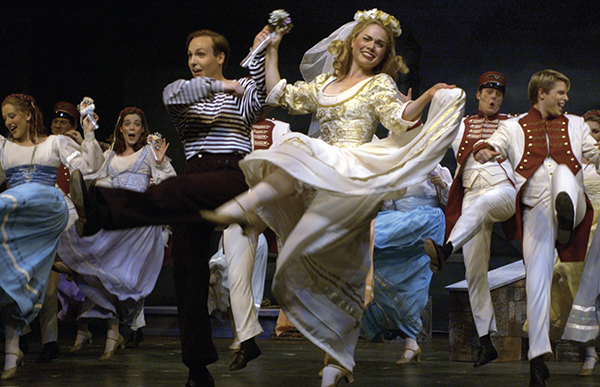
Ruddigore
(1887)
Music by Arthur Sullivan
Book & Lyrics by W. S. Gilbert
Ruthven Murgatroyd has run away from a baronetcy which, because of a witch’s curse, obliged him to commit a crime every day. He lives a happy life in disguise as Robin Oakapple but unfortunately falls in love with Rose Maybud. His true identity is revealed and Ruthven squeamishly finds every way he can avoid his doomful duty. His angry ancestors descend from their pictures and demand that he honor his horrid responsibilities. Ruthven emerges with a spotless piece of complex logic, which allows him to baffle the old curse and tie up a happy ending with Rose.
Stage Director Sarah McGraw
Choreographer Carol Hageman
Set Designer Tymberley Wittrig
Costume Designer Jeffrey Meek
Lighting Designer Jen Groseth
Conductor J. Lynn Thompson
Andrew MacLaren Nathan Whitson
Angus MacGuffie Jonathan Stinson
Archie Beaton Nathan Arnett
Charlie Dalrymple Ben Smith Randall Umstead
Fiona MacLaren Julie Wright
Frank Eade Woodward
Harry Beaton Grant Knox
Jane Ashton Dominique McCormick
Jean MacLaren Leauren Beatty
Jeff Douglas Ted Christopher
Kate Betha Curtis
Meg Brockie Lauren Pastorek Ann Marie Wilcox
Mr. Lundie Brian Woods
Stuart Dalrymple Justin Legris
Tommy Albright Cassidy King David Wannen
Maggie Anderson Danielle McCormick
Sandy Dean Derek Parks
MacGregor Wade Woodward
Ensemble
Soprano: Lauren Beatty, Robin Bricker, Aline Carnes, Amy Castor, Danielle McCormick, Dominique McCormick, Arlene Simmonds, Julie Wright
Mezzo: Alta Boover, Candice Coffey, Betha Curtis, Yvonne Douthat, Sahara Galsener, Lauren Pastorek, Ann Marie Wilcox
Tenor: Nathan Arnett, Grant Knox, Justin Legris, Robert McNamara, Ben Smith, Randall Umstead, Brian Woods
Baritone and Bass: Ted Christopher, Patrick Howle, Cassidy King, Derek Parks, Jonathan Stinson, Nathan Whitson, David Wannen, Wade Woodward
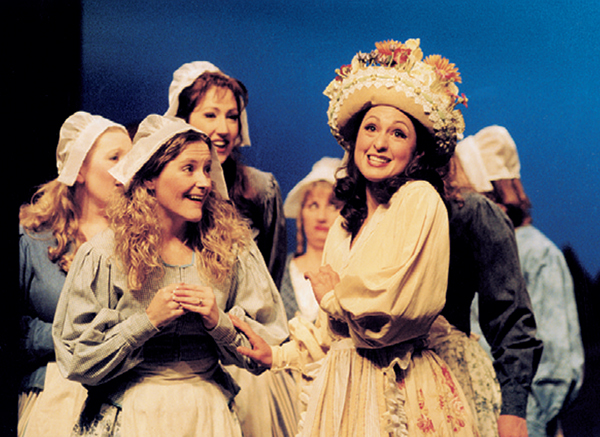
Sweethearts
(1913)
Music by Victor Herbert
Libretto and book by Harry B. Smith and Fred de Gresac
New Ohio Light Opera Performance by Chris Flaharty and Quade Winter
Princess Sylvia of Zilania was stolen away from her home as a baby to keep her safe from a revolution, and lives with an unobtrusive family of working folk in a far-off country (Bruges). Sylvia’s ‘foster-family’ are laundry-folk. With Sylvia considered missing in Zilania, a distant cousin, Prince Franz, is next in line to ascend the throne. The Prince travels through Belgium and happens to enter the washing-shop. Through many intriguing encounters the Prince eventually falls in love with the disguised Princess Sylvia. Order is restored in Zilania and the couple is free to rule together.
Stage Director Quade Winter
Choreographer Carol Hageman
Set Designer Dale Seeds
Costume Designer Shelley Alexander Cornia
Lighting Designer Jen Groseth
Conductor J. Lynn Thompson
Sylvia Suzanne Woods
Liane Robin Bricker
Dame Paula Alta Boover
Franz Cassidy King
Mikel Mikelovitz Jonathan Stinson
Lieutenant Karl John Pickle
Percy Algernon Slingsby Ben Smith
Petrus von Tromp Derek Parks
Aristide Caniche Patrick Howle
Jeanette Betha Curtis
Clairette Aline Carnes
Babette Candice Coffey
Lizette Arlene Simmonds
Toinette Sandra Ross
Nanette Sahara Galsener
Captain Lourent Randall Umstead
First Footman Grant Knox
Second Footman Justin Legris
Ensemble
Soprano: Lauren Beatty, Robin Bricker, Aline Carnes, Amy Castor, Jaquelyn Lengfelder, Danielle McCormick, Dominique McCormick, Arlene Simmonds, Suzanne Woods
Mezzo: Alta Boover, Candice Coffey, Betha Curtis, Yvonne Douthat, Sahara Galsener, Lauren Pastorek, Sandra Ross
Tenor: Nathan Arnett, Grant Knox, Justin Legris, Robert McNamara, John Pickle, Ben Smith, Randall Umstead
Baritone and Bass: Oliver Henderson, Patrick Howle, Cassidy King, Derek Parks, Jonathan Stinson, Nathan Whitson, Wade Woodward
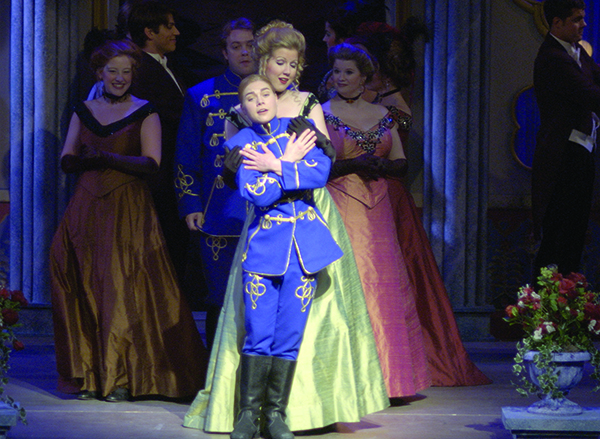
Autumn Maneuvers
(1908)
Music by Emmerich Kálmán
Libretto by Karl von Bakonyi and Robert Bodanzky
English translation and New Ohio Light Opera version by Steven A. Daigle
The story is set in Hungary at a country estate of the widow Baroness Risa von Marbach where she has given permission for the army to reside at her estate for autumn maneuvers. Lt. Lorenthy is pursued by the passionate Treska, his commanding officer’s daughter, much to the army volunteer Marosi’s jealous disapproval. The Baroness Risa and Lt. Lorenthy are in love with each other, but unable to admit it. In order to force a jealous reaction out of Risa, Lorenthy stages a marriage proposal to Treska. The romance and intrigue unfold when Risa and Lorenthy are reunited.
Stage Director Steven Daigle
Choreographer Carol Hageman
Set Designer Kirk Domer
Costume Designer Shelley Alexander Cornia
Lighting Designer Adam Howarth
Assistant Director Ted Christopher
Conductor Steven Byess
Field Marshall Lieutenant von Lohonay Oliver Henderson
Baroness Treszka Lauren Pastorek
Baroness Risa von Marbach Jacquelyn Lengfelder
Cavalry Captain von Emmerich Brian Woods
Lieutenant Elekes Derek Parks
First Lieutenant Lörenthy Wade Woodward
Marosi Lauren Beatty
Wallerstein Nathan Arnett
Turi Grant Knox
Mrs. Von Bergen Betha Curtis
Countess Olga Sandra Ross
Lajos Spiro Matsos
Starke Justin Legris
Birág David Wannen
Fekete Nathan Whitson
Laczi Patrick Howle
Colonel Wulff Cassidy King
Mr. Von Bergen John Pickle
Lieutenant Sturmfried Randall Umstead
Deputy Cadet Officer Fritsche John Pickle
Lieutenant Köppler Robert McNamara
Gypsy Violinist Jonathan Stinson
Friend Löbl John Pickle
Ensemble
Soprano: Lauren Beatty, Aline Carnes, Amy Castor, Jaquelyn Lengfelder, Danielle McCormick, Dominique McCormick, Arlene Simmonds, Suzanne Woods
Mezzo: Alta Boover, Betha Curtis, Yvonne Douthat, Sahara Galsener, Lauren Pastorek, Sandra Ross, Ann Marie Wilcox
Tenor: Nathan Arnett, Grant Knox, Justin Legris, Robert McNamara, Randall Umstead, Brian Woods
Baritone and Bass: Oliver Henderson, Patrick Howle, Cassidy King, Derek Parks, Jonathan Stinson, Nathan Whitson, David Wannen, Wade Woodward
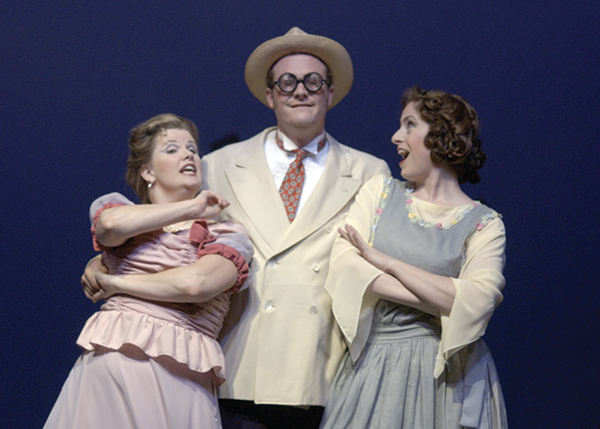
The Cousin from Batavia
(1921)
Music by Eduard Künneke
Lyrics by Herman Haller and Fritz Oliven
English translation and Ohio Light Opera performance version by Richard Traubner
The story, set in 1920s Holland, revolves around Julia and Hanna, two young women coming of age who have been searching for romance in their lives. Julia tells of her relationship with a childhood sweetheart. A stranger, who is thought to be Julia’s young love, visits Julia and Hanna but is reluctant to reveal his identity. The two young ladies’ intrigues are further complicated by the arrival of a second stranger. If you enjoy the lyric romance of Franz Lehár’s music, you will be thrilled with the endearing score of Eduard Künneke’s ‘The Cousin from Batavia.’
Stage Director Steven Daigle
Choreographer Carol Hageman
Set Designer Richard Traubner
Costume Designer Shelley Alexander Cornia
Lighting Designer Krystal Kennel
Conductor J. Lynn Thompson
Julia de Weert Suzanne Woods
Hanna Julie Wright
Josef Kuhbrot Oliver Henderson
Wimphemine Ann Marie Wilcox
Stranger I John Pickle
Stranger II Ted Christopher
Egon Von Wildehaven Wade Woodward
Hans David Wannen
Carlotta Sandra Ross
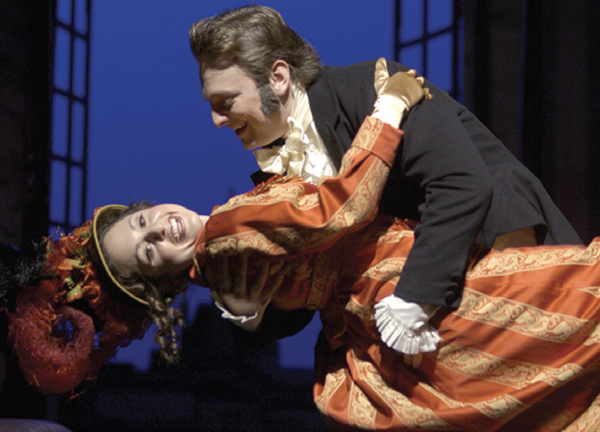
Das Dreimäderlhaus
(1916)
Music by Franz Schubert
arranged by Heinrich Traubner
Libretto by Rudolph H. Bartsch
English translation and New Ohio Light Opera version by Richard Traubner
Hannerl Tscholl helps her two sisters, Haiderl and Hederl, meet their boyfriends, Bruneder and Brinder, for a discreet rendezvous. During this arrangement, Hannerl meets Franz Schubert. Hannerl, has warm feelings for the composer, but the actress, Demoiselle Grisi, the jealous mistress of Schubert’s poet friend Franz Schober, warns the girl against the womanizing Franz. Schubert writes a song to express his love for Hannerl and the easy-going Schober sings it to her. Hannerl, believing the feelings expressed in the song are Schober’s, responds by agreeing to marry him. Schubert is left at the final curtain with only his music to console him.
Stage Director Steven Daigle
Choreographer Carol Hageman
Set Designer Richard Traubner
Costume Designer Shelley Alexander Cornia
Lighting Designer Adam Howart
Assitant Director Ben Smith
Conductor Steven Byess
Franz Schubert John Pickle
Baron Schober Brian Woods
Moriz von Schwind Ted Christopher
Johann Nepomuk Vogl Cassidy King
Christian Tschöll Ben Smith
Marie Tschöll Yvonne Douthat
Hanni Tschöll Julie Wright
Haiderl Tschöll Suzanne Woods
Hederl Tschöll Lauren Pastorek
Signora Lucia Grisi Robin Bricker
Andreas Bruneder David Wannen
Ferdinand Binder Patrick Howle
Kupelwieser Nathan Whitson
Count Scharntorff Nathan Whitson
Nowotny Oliver Henderson
Street Slinger I Aline Carnes
Street Slinger II Candice Coffey
Krautmeyer Justin Legris
Schani Justin Legris
Stingl Nathan Whitson
Frau Banberger Betha Curtis
Frau Weber Jessie Wright Martin
Rosl Aline Carnes
Ensemble
Soprano: Robin Bricker, Aline Carnes, Suzanne Woods, Julie Wright
Mezzo: Candice Coffey, Betha Curtis, Yvonne Douthat, Jessie Wright Martin, Lauren Pastorek
Tenor: Justin Legris, John Pickle, Ben Smith, Brian Woods
Baritone and Bass: Ted Christopher, Oliver Henderson, Patrick Howle, Cassidy King, Nathan Whitson, David Wannen
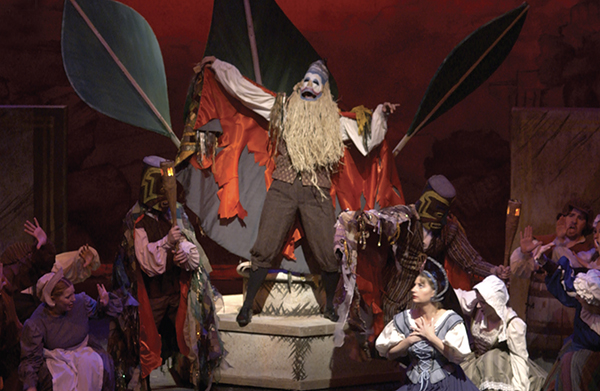
Boccaccio
(1858)
Music by Franz von Suppé
Libretto by JF. Zell and Richard Genée
English translation by Quade Winter
Giovanni Boccaccio is a poet and novelist in Florence who takes the plots of his tales of duped husbands and faithless women from his own life experience. Pietro, Prince of Palermo, arrives in Florence incognito to search out “real life”. He befriends Boccaccio who leads the Prince on some wild excursions throughout Florence. At the marriage festivities, Pietro justifies Boccaccio’s presence at the Tuscany court by announcing that he has been hired to write and stage entertainment for the royal betrothal. Boccaccio’s entertainment takes the form of a moral commedia dell’arte which charms the Duke of Tuscany. The Duke sentences Boccaccio to life imprisonment as Fiametta’s husband and is also appointed Poet Laureate to the Tuscan Court.
Stage Director Steven Daigle
Choreographer Carol Hageman
Set Designer Dale Seeds
Costume Designer Jeffrey Meek
Lighting Designer Krystal Kennel
Conductor Steven Byess
Lambertuccio Robert McNamara
Peronella Yvonne Douthat
Fiametta Jacquelyn Lengfelder
Giovanni Boccaccio Nathan Arnett
Pietro Randall Umstead
Lotteringhi Brian Woods
Isabella Sandra Ross
Leonetto Patrick Howle
Beppo Jonathan Stinson
Scalza Nathan Whitson
Beatrice Arlene Simmonds
Ceccho David Wannen
Zenatello Derek Parks
Martinelli Grant Knox
Borghatti Ben Smith
Lotto Ben Smith
Totto Oliver Henderson
Giotto Wade Woodward
Lauretta Danielle McCormick
Serafina Betha Curtis
Emilia Candice Coffey
Major Domo David Wannen
Colobina Betha Curtis
Arlecchino Cassidy King
Pantalone Oliver Henderson
Narcissino Justin Legris
Zirzabella Wade Woodward
Ensemble
Soprano: Lauren Beatty, Robin Bricker, Aline Carnes, Amy Castor, Jaquelyn Lengfelder, Danielle McCormick, Dominique McCormick, Arlene Simmonds
Mezzo: Alta Boover, Candice Coffey, Betha Curtis, Yvonne Douthat, Sahara Galsener, Lauren Pastorek, Sandra Ross, Ann Marie Wilcox, Suzanne Woods
Tenor: Nathan Arnett, Grant Knox, Justin Legris, Robert McNamara, Ben Smith, Randall Umstead, Brian Woods
Baritone and Bass: Oliver Henderson, Patrick Howle, Cassidy King, Derek Parks, Jonathan Stinson, Nathan Whitson, David Wannen, Wade Woodward
2001 Season
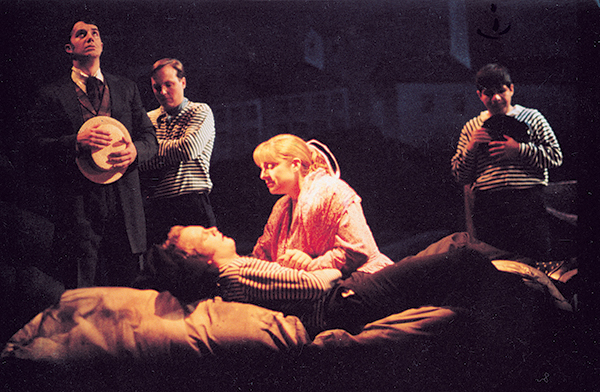
Carousel
(1945)
Music by Richard Rodgers
Book & Lyrics by Oscar Hammerstein II
Stage Director Sarah McGraw
Choreographer Carol Hageman
Set Designer Richard Traubner
Assistant to the Set Designer Kirk Domer
Costume Designer Jeffrey Meek
Lighting Designer Jen Groseth
Conductor Steven Byess
Julie Jordan Julie Wright
Carrie Pipperidge Megan Loomis Sarah Jane McMahon
Mrs Mullin Arlene Simmonds
Billy Bigelow Ted Christopher Wade Woodward
Mr Enoch Snow Brian Carlton Anthony Maida
Nettie Fowler Ann Marie Wilcox
Jigger Craigin David Wannen
David Bascombe John Musick
Mrs Bascombe Laura Black
Louise Lauren Beatty
Enoch Snow Jr Grant Knox
Policeman Lucas Meachem
2nd Policeman Spiro Matsos
Captain Jonathan Stinson
Principal Kelli Geoghegan
Doctor Seldon Tim Oliver
Barker Cassidy King
Arminy Lauren Pastorek
Heaven Friend (Brother Joshua) Brian Woods
Starkeeper John Sumners
European Beauties: Kimberley G. Cadley-Mach, Rachel Cutler, Briana Humphrey, Sarah White
Enoch Snow’s Family: Nancy Maria Balach, Grant Knox, Michaela Boros, Kimberly Carter, Kendra Shehy
Ladies: Nancy María Balach, Lauren Beatty, Laura Black, Michaela Boros, Dawn Boudreaux, Kimberly Carter, Rebecca Comerford, Yvonne Douthat, Kelli Geoghegan, Jacquelyn Lengfelder, Jessie Wright Martin, Emily Neill, Lauren Pastorek, Sandra Ross, Kendra Shehy, Nicole Sikora, Arlene Simmonds
Men: Cassidy King, Grant Knox, Spiro Matsos, Lucas Meachem, Isai Munoz, John Musick, Tim Oliver, Jonathan Stinson, John Sumners David Wannen, Brian Woods
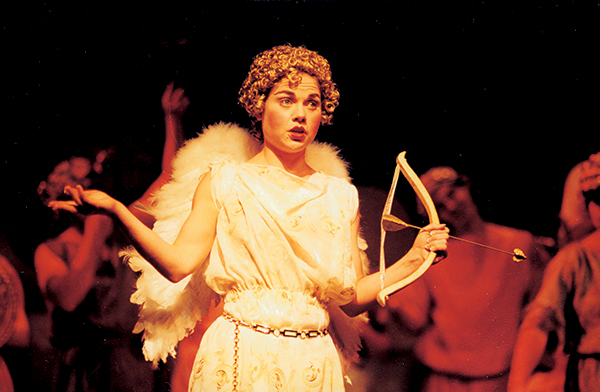
Orpheus in the Underworld
(1858)
Music Jacques Offenbach
Original French Libretto Hector Crémieux and Ludovic Halévy
English Translation Richard Traubner
Edited and adapted by Steven A. Daigle
Public Opinion enters and informs the audience that it is her duty to society to keep the theatrical setting of this entertainment morally sound. Eurydice is bored to death with her fiddle-playing husband Orpheus and is having an affair with the shepherd Aristeus (Pluto, god of the Underworld, in disguise). Orpheus is also guilty of infidelity. He has been giving more than just violin lessons to his students. Out of spite, Orpheus sets a trap for Aristeus in a wheat field. Aristeus knows of Orpheus’ trap and uses it as a means to “kill” Eurydice, thus bringing her to Hades. As Eurydice dies, Aristeus reveals himself as Pluto, and she is delighted to accompany him to the Underworld. Orpheus is thrilled to find out about Eurydice’s recent departure. Now he can spend more time with his students. But Public Opinion insists that he go with her to Mount Olympus to plead for his wife’s return. On Olympus, Jupiter tries to instill good behavior in the other deities. His attempts are thwarted by their reminding him of his own innumerable amorous adventures. Public Opinion and Orpheus arrive. Jupiter decides to investigate the affair between Pluto and Eurydice personally and descends to the Underworld with the rest of the gods. Eurydice is kept in seclusion and guarded by the dimwitted former King of Beotia, John Styx. Eurydice, bored with her confinement, accepts the advances of Jupiter, who disguises himself as a fly to get into her room. Orpheus arrives, and Jupiter allows him to have Eurydice back, provided that he does not turn and look at her. Then, to make sure that he does look, he hurls a thunderbolt at Orpheus’ feet. Eurydice decides to become a Bacchante, and all join in the famous can-can.
Stage Directors Steven Daigle, Quade Winter
Choreographer Carol Hageman
Set Designer Richard Traubner
Assistant to the Set Designer Kirk Domer
Costume Designer Shelley Alexander Comia
Lighting Designer Adam Howarth
Conductor Steven Byess
Public Opinion Sandra Ross
Eurydice Dawn Boudreaux
Orpheus Thomas Glenn
Aristeus/Pluto Brian Woods
Jupiter Ted Christopher
Cupid Lauren Beatty
Mercury Arlene Simmonds
Diana Nancy Maria Balach
Venus Lauren Pastorek
Juno Rebecca Comerford
Hebe Laura Black
Minerva Jessie Wright Martin
John Styx Anthony Maida
Mars David Wannen
Bacchus Jeffrey Miller
Orpheus’ Students: Kelli Geoghegan, Megan Loomis, Sarah Jane McMahon, Nicole Sikora
Can-Can Dancers: Nancy María Balach, Sarah Jane McMahon, Megan Loomis, Lauren Pastorek
Goddesses of Mount Olympus: Nancy María Balach, Laura Black, Rebecca Comerford, Lauren Beatty, Kelli Geoghegan, Megan Loomis, Jessie Wright Martin, Sarah Jane McMahon, Lauren Pastorek, Nicole Sikora, Arlene Simmonds, Ann Marie Wilcox, Julie Wright
Gods of Mount Olympus: Brian Carlton, Ted Christopher, Grant Knox, Lucas Meachem, Jeffrey Miller, John Musick, Tim Oliver, John Stinson, John Sumners, David Wannen
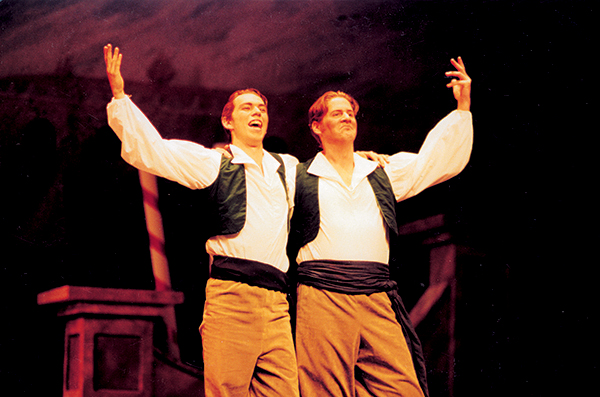
The Gondoliers
(1889)
Music by Sir Arthur Sullivan
Words by William S. Gilbert
Casilda, the 21-year-old daughter of the Duke and Duchess of Plaza-Toro, was married at birth by proxy to the infant son and heir of the exceedingly wealthy King of Barataria. Unfortunately, the King became a rather bigoted Wesleyan Methodist, and the Grand Inquisitor, determined that such a trend should not continue, arranged for the heir to be kidnapped and taken to Venice. There he was placed in the care of a respectable gondolier who raised him alongside his own son. Now gondoliers themselves, his “sons”, Marco and Giuseppe, have recently selected a bride each, Gianetta and Tessa, from their large female following and are, therefore, upset to learn that, as heir apparent to the throne, one of them may have to sacrifice his bride in order to marry Casilda. She is not happy with the situation either as she is in love with Luiz. As Marco and Giuseppe’s “father” has since died, the only person that can truly identify the Prince is Inez, who was his childhood nurse. When called upon to make her judgement she reveals that neither is in fact the King’s son, because when the baby was kidnapped she substituted her own child in his place. Therefore, the true heir to the throne of Barataria is Luiz. This proves satisfactory to all parties, as the gondoliers can keep their brides, and Casilda can both fulfill the proxy and marry the one she loves. Children of all ages will be captivated by the charisma of The Gondoliers.
Stage Director Julie Wright
Choreographer Carol Hageman
Set Designer Kirk Domer
Assistant to the Set Designer Sara K. Armstrong
Costume Designer Jessica Hayes
Lighting Designer Adam Howarth
Conductor Steven Byess
Duke of Plaza-Toro Cassidy King
Duchess of Plaza-Toro Sandra Ross
Casilda Arlene Simmonds
Luiz Grant Knox
Don Alhambra Del Bolero Jeffrey Miller
Gianetta Lauren Beatty Nicole Sikora
Tessa Yvonne Douthat Jessie Wright Marti
Fiametta Dawn Boudreaux
Giulia Rebecca Comerford
Vittoria Kelli Geoghegan
Marco Palmieri Brian Carlton
Giuseppe Palmieri Jonathan Stinson
Francesco Isai Munoz
Antonio David Wannen
Giorgio John Musick
Annibale Lucas Meachem
Solo Gondolier Tim Oliver
Inez Jessie Wright
Martin Yvonne Douthat
Contadine: Lauren Beatty, Dawn Boudreaux, Rebecca Comerford, Yvonne Douthat, Kelli Geoghegan, Jacquelyn Lengfelder, Megan Loomis, Jessie Wright Martin, Lauren Pastorek, Nicole Sikora
Venetian Gondoliers: Brian Carlton, Ted Christopher, Thomas Glenn, Anthony Maida, Lucas Meachem, Isai Munoz, John Musick, Jonathan Stinson, David Wannen, Brian Woods, Wade Woodward
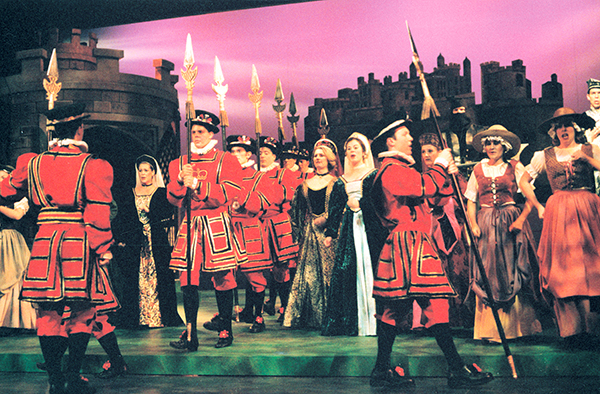
Yeomen of the Guard
(1888)
Book by William S. Gilbert
Music by Arthur S. Sullivan
Phoebe, the daughter of Sergeant Meryll of the Yeomen of The Guard, irritates the jailer Wilfred when she ignores him and expresses pity for the jailed Captain Fairfax who, through an inheritance scam by a scheming relative, has been condemned to death for sorcery and is to be executed this very day at the Tower of London. Meryll concocts a plan whereby his son, Leonard, arriving to join the Yeomen, will go into hiding and be impersonated by a newly-shaven, beardless, unrecognizable Fairfax, thus providing time to seek a pardon. In order to thwart his unscrupulous kinsman, Fairfax begs Tower Lieutenant Cholmondely to find him a wife. Jester Jack Point and his intended bride, the strolling singer Elsie Maynard, arrive in town; the lieutenant confronts Elsie and, with the promise of 100 crowns and an assurance to Jack that her new husband will shortly be dead, Elsie is blindfolded, whisked away, and married to Fairfax. The plan goes awry when the condemned prisoner is discovered missing from his cell. Tower housekeeper Dame Carruthers, always with a matrimonial eye on Sergeant Meryll, reveals to Fairfax the identity of his wife. Point, desperate for Elsie’s affections, announces that Fairfax has been killed in an escape attempt. The “widow” Elsie is immediately wooed by both Point and Fairfax, the latter still posing as Leonard. When the real Leonard arrives with a pardon for Fairfax, Elsie discovers that her “Leonard” is really Fairfax and that she is already married to the man she loves. Jack Point falls insensible at their feet.
Stage Director Steven Daigle
Choreographer Carol Hageman
Set Designer Kirk Domer
Costume Designer Jeffrey Meek
Lighting Designer Krystal Kennel
Props Artisan Alison Gent
Phoebe Lauren Pastorek
Wilfred Shadbolt Jeffrey Miller
Sir Richard Cholmondeley Jonathan Stinson
Colonel Fairfax Brian Woods
Sergeant Meryll John Musick
Leonard Meryll John Sumners
Jack Point Ted Christopher
Elsie Maynard Julie Wright
Dame Carruthers Sandra Ross
Kate Dawn Boudeaux
1st Yeoman Grant Knox
2nd Yeoman Lucas Meachem
The Headsman Tim Crump
Citizens: Lauren Beatty, Dawn Boudeaux, Laura Black, Brian Carlton, Yvonne Douthat, Kelli Geoghegan, Cassidy King, Jacquelyn Lengfelder, Sarah Jane McMahon, Tim Oliver, Nicole Sikora, Arlene Simmonds, Anne Marie Wilcox, Wade Woodward
Yeomen of the Guard: Brian Carlton, Thomas Glenn, Cassidy King, Grant Knox, Anthony Maida, Lucas Meachem, John Musick, Isai Munoz, Tim Oliver, Wade Woodward
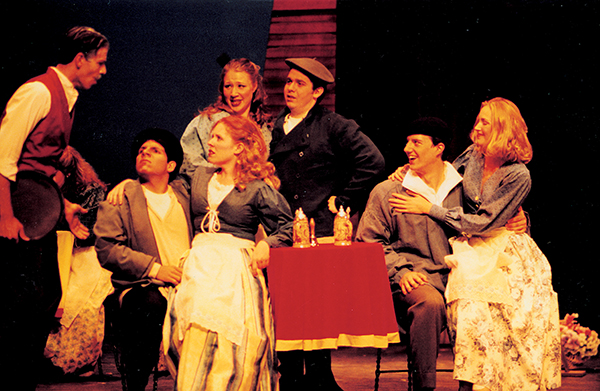
The Red Mill
(1906)
Music by Victor Herbert
Libretto by Henry Blossom
Stage Director Steven Daigle
Choreographer Carol Hageman
Set Designer Dale Seeds
Costume Designer Shelley Alexander Comia
Lighting Designer Jen Groseth
Conductor J. Lynn Thompson
‘Con’ Kidder Cassidy King
‘Kid’ Conner Anthony Maida
Jan Van Borkem Lucas Meachem
Gretchen Van Borkem Nancy Maria Balach
Franz Jeffrey Miller
Bertha Ann Marie Wilcox
Willem David Wannen
Tina Megan Loomis
Captain Christian Van Damm Brian Woods
The Governor of Zeeland Wade Woodward
Contesse de la Fere Jessie Wright Martin
Alphonse Jonathan Stinson
Pierre Brian Carlton
Joshua Pennyfeather John Sumners
Rose Arlene Simmonds
Heather Rebecca Comerford
Gaston John Musick
Flora Laura Black
Dora Nicole Sikora
Lora Kelli Goeghegan
Dirk John Musick
Piet Isai Munoz
Ladies: Laura Black, Rebecca Comerford, Yvonne Douthat, Kelli Geoghegan, Jessie Wright Martin, Sarah Jane McMahon, Sandra Ross, Nicole Sikora, Arlene Simmonds
Men: Brian Carlton, Thomas Glenn, Jeffrey Miller, Isai Munoz, John Musick, Jonathan Stinson, John Sumners, David Wannen

Sari
“Der Zigeunerprimas”
(1912)
Music by Emmerich Kálmán
Libretto by Julius Wilhelm and Fritz Grünbaum
Stage Director Steven Daigle
Choreographer Carol Hageman
Set Designer Dale Seeds
Costume Designer Jeffrey Meek
Lighting Designer Krystal Kennel
Conductor J. Lynn Thompson
Pali Rácz Lucas Meachem
Juliska Jacquelyn Lengfelder
Sari Sarah McMahon
Laczi Thomas Glenn
Gaston Tim Oliver
Monsieur Cadeau Anthony Maida
Countess Irini Julie Wright
King Heribert VII (Count Estragon) Wade Woodward
Excellency Mustari John Musick
Jósska Fekete Jonathan Stinson
Pierre David Wannen
Henri Grant Knox
Ferko Isai MuZoz
Klari Lucy Lengfelder
General Godefroy Cassidy King
Duke Patiseuil Brian Woods
Minister Cracquard Jeffrey Miller
Children of Pali Pácz: Lauren Beatty, Dawn Boudreaux, Thomas Glenn, Grant Knox, Josh Lengfelder, Lucy Lengfelder, Sarah Jane McMahon, Megan Loomis, Isai Munoz, Nicole Sikora, Arlene Simmonds
Women Gypsies and Guests of Countess Irini: Lauren Beatty, Laura Black, Dawn Bourdeaux, Rebecca Comerford, Yvonne Douthat, Megan Loomis, Jessie Wright Martin, Lauren Pastorek, Sandra Ross, Nicole Sikora, Arlene Simmonds
Men Gypsies, Musicians and Guests of Countess Irini: Ted Christopher, Cassidy King, Grant Knox, Jeffrey Miller, Isai Munoz, Jonathan Stinson, David Wannen, John Sumners, Brian Woods
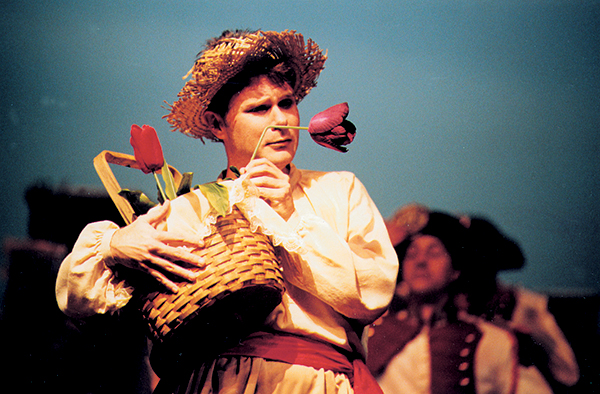
The Merry War
(1881)
Music and Libretto by Johann Strauss II
Stage Director Steven Daigle
Choreographer Carol Hageman
Set Designer Tymberley Wittrig
Costume Designer Shelley Alexandrer Cornia
Lighting Designer Jen Groseth
Conductor J. Lynn Thompson
Violetta Jacquelyn Lengfelder
Umberto Spinola Tim Oliver
Carlo Spinzi John Musick
Fortunato Franchetti David Wannen
Riccardo Durazzo Brian Carlton
Biffi Isai Munoz
Marquis Sebastiani John Sumners
Colonel von Scheelen Grant Knox
Balthasar Groot Ted Christopher
Else Lauren Beatty
Artemisia Yvonne Douhat
Honor Guards Cassidy King, Wade Woodward
Captured Peasant Girls (Ladies-in-Waiting of Artemisia): Nancy Maria Balach, Laura Black, Rebecca Comerford, Dawn Boudreaux, Kelli Geoghegan, Megan Loomis, Sarah Jane McMahon, Lauren Pastorek, Ann Marie Wilcox
Soldiers of the Genoese Army: Brian Carlton, Thomas Glenn, Cassidy King, Grant Knox, Anthony Maida, Jeffrey Miller, Isai Munoz, John Musick, David Wannen, Wade Woodward
2000 Season
Camelot
(1960)
Music by Frederick Loewe
Book and Lyrics by Alan Jay Lerner
ACT I: On a wintry morning, King Arthur’s court greets the arrival of Guenevere, the King’s soon-to-be bride. Arthur is nervous at becoming a bridegroom; Guenevere is more romantically inclined in her new position as Queen of England, but equally uncertain. When they meet unexpectedly, he outlines the pleasures of life in Camelot. Each charmed by the other’s lack of court etiquette and formality, they are happily married as King and Queen. Arthur’s tutor, the magician Merlyn, is lured away from Camelot and is unable to warn the King of imminent dangers. Arthur has learned the wisdom of peaceful ways from Merlyn and has brought tranquility and justice to his domain through the establishment of the celebrated Round Table. News of the Table has even reached France, engaging the sympathies of young Lancelot du Lac, who arrives at Camelot proclaiming his intentions to serve King Arthur. Lancelot, in the view of the court and Guenevere, is insufferable; she encourages the castle knights to challenge him to a joust. Arthur tries to dissuade her from siding against Lancelot, but the Queen is adamant. Lancelot is victorious, exhibiting a strange power of faith and purity, thereby gaining the respect of the court and of the Queen. His feelings towards Guenevere speedily develop into a deep but silent love, putting to test the principles of the Round Table and Lancelot’s true love for the King he serves.
ACT II: Two years pass – Lancelot and Guenevere still strive to conceal their love. Arthur is aware of their feelings, but covers his resentment to preserve peace in Camelot. Rumors of the relationship attract the young squire Mordred, Arthur’s illegitimate son, who loathes Arthur’s dreams of peace and intends to disrupt the kingdom in the hope that he may ascend to the throne. Through Mordred’s scheme, Arthur is trapped in the enchanted forest of Mordred’s aunt, Morgan Le Fey, who casts a sleeping spell over the King. Lancelot visits Guenevere in her chambers, where Mordred overhears them confess their love and accuses them of treason. Lancelot escapes, but Guenevere is sentenced to burn at the stake. At the last moment, Lancelot rescues Guenevere and takes her to France, and Arthur is forced to make war on his friend. Just before their final battle, Arthur meets both Guenevere and Lancelot, and discovers that they are no longer together. Realizing that all he has fought for is gone, Arthur forgives Guenevere. He discovers a young stowaway who aspires to join the Round Table. He knights the boy and sends him back to England, charging him, when he grows up, to tell another generation of the noble ideas of Camelot.
Stage Director Steven Daigle
Choreographer Carol Hageman
Set Designer Richard Traubner
Costume Designer Jeffrey Meek
Lighting Designer Jen Groseth
Sound Designer Jen Groseth
Props Artisan Kirk Domer
Conductor J. Lynn Thompson
Sir Dinadan David Wannen
Sir Lionel Ben Smith
Merlyn Tony Thomann
King Arthur Ted Christopher Boyd Mackus
Queen Guenevere Lauren Pastorek Julie Wright
Nimue Karla Hughes
Lancelot du Lac Sean Anderson Damian Savarino
Dap Richard Stevenson
King Pellinore Anthony Maida
Clarius John Sumners
Mordred Stephen Carr
Morgan Le Fey Amy Van Looy
Tom Garrett Hoffman Lee Matsos
Ladies in Waiting to the Queen Rebecca Comerford, Arlene Simmonds
‘Guenevere!’ Soloist Michael Gallant
Ladies of King Arthur’s Court: Nancy Maria Balach, Lauren Beatty, Rebecca Comerford, Jan Cornelius, Zanna Fredland, Karla Hughes, Renee Riegler, Traci Pickerell, Arlene Simmonds, Amy Van Looy, Anne Wilcox
Men of King Arthur’s Court: Michael Gallant, Lucas Meachem, Tim Oliver, Ben Smith, Christopher Swanson, Richard Stevenson, John Sumners, David Wannen
The Mikado
(1885)
Music by Sir Arthur Sullivan
Words by William S. Gilbert
Nanki-Poo has fled the court of his father, the Mikado of Japan, to escape marriage with an elderly lady. He disguises himself as a musician, then falls in love with a fair maiden, Yum-Yum. However, he has been prevented from marrying her by her guardian, Ko-Ko, who wishes to marry Yum-Yum himself.
Stage Director Steven Daigle
Choreographer Carol Hageman
Set Designer Richard Traubner
Costume Designer Jeffrey Meek
Lighting Designer Jen Groseth
Sound Designer Jen Groseth
Props Artisan Kirk Domer
Conductor Steven Byess
The Mikado of Japan Boyd Mackus
Nanki-Poo Michael Gallant Christopher Swanson
Ko-Ko Stephen Carr Richard Stevenson
Pooh-Bah Ben Smith Tony Thomann
Pish-Tush Sean Anderson
Yum-Yum Lauren Beatty Karla Hughes
Pitti-Sing Zanna Fredland Ann Marie Wilcox
Peep-Bo Tara Bowers Savarino
Katisha Colleen Firstenberger Traci Pickerell
Chorus of School Girls: Nancy Maria Balach, Rebecca Comerford, Jan Cornelius, Zanna Fredland, Lauren Pastorek, Amy Van Looy, Ann Marie Wilcox, Suzanne Woods, Julie Wright
Chorus of Nobles: Ted Christopher, Mchael Gallant, Anthony Maids, Lucas Meachem, Tim Oliver, John Pickle, Damian Savarino, John Sumners, Christopher Swanson, David Wannen
Utopia Limited
(1893)
Music by Arthur Sullivan
Libretto by William Gilbert
Anglophile King Paramount, who rules over the island kingdom of Utopia, has sent his daughter, Princess Zara, to be educated in England – for him, the greatest, most powerful, and wisest country in the world. She returns with six Flowers of Progress, who remodel Utopia on English principles. The island becomes “swamped by dull prosperity” and, led by Paramount’s advisors, rises in revolt against the British intruders. Zara forestalls all-out rebellion by introducing party politics, which allows the flourishing of “healthy” graft and squalor. Gilbert misses no opportunity to hammer his normal share of institutions: Parliament, big business, and party politics. Sullivan’s musical highlights include an engaging duet for two princesses and a remarkable “minstrel” ensemble replete with tambourines.
Stage Director Julie Wright
Choreographer Carol Hageman
Set Designer Richard Traubner
Assistant to the Designer Kirk Domer
Backdrop Design Elsie Sawchuk
Costume Designer Shelly Alexander
Lighting Designer Adam Howart
Conductor J. Lynn Thompson
King Paramount the First Ted Christopher
Scaphio Lucas Meachem
Phantis Tony Thomann
Tarara Anthony Maids
Calynx Richard Stevenson
Lord Dramaleigh Damian Savarino
Captain Fitzbattleax Tim Oliver
Captain Sir Edward Corcoran David Wannen
Mr. Goldbury Boyd Mackus
Sir Baily Barre Ben Smith
Mr. Blushington Christopher Swanson
The Princess Zara Nancy Maria Balach
The Princess Nekaya Amy Van Looy
The Princess Kalyba Jan Cornelius
The Lady Sophy Traci Pickerell
Salata Tara Bowers Savarino
Melene Karla Hughes
Phylla Lauren Pastorek
“Bold-faced Ranger” Emily Cornelius
First Life Guards: Stephen Carr, Michael Gallant, John Pickle, John Sumners
Chorus of Utopian Natives: Sean Anderson, Lauren Beatty, Stephen Carr, Rebecca Comerford, Colleen Firstenberger, Zanna Fredland, Michael Gallant, Karla Hughes, Anthony Maida, Lauren Pastorek, John Pickle, Renee Riegler, Damian Savarino, Tara Bowers Savarino, Arlene Simmonds, Ben Smith, John Sumners, Christopher Swanson, Richard Stevenson, David Wannen, Ann Marie Wilcox, Suzanne Woods
Naughty Marietta
(1910)
Music Victor Herbert
Book & Lyrics Rida Johnson Young
Stage Director Steven Daigle
Choreographer Carol Hageman
Scenic Designer Dale Seeds
Original Costume Design Billie Boston
Costumer Jeffrey Meek
Lighting Designer Jen Groseth
Sound Designer Jen Groseth
Props Artisan Kirk Domer
Conductor Steven Byess
Captain Richard Warrington John Pickle
Lieutenant Governor Grandet Boyd Mackus
Etienne Grandet Ted Christopher
Sir Harry Blake Lucas Meachem
Silas Simoneaux Stephen Carr
Rudolph Richard Stevenson
Florenze Spiro Matsos
Naughty Marietta Suzanne Woods
Lizette Zanna Fredland
Adah Anne Wilcox
Nanette Amy Van Looy
Fanchon Karla Hughes
Pierrot Anthony Maida
1st Sailor Michael Grant
2nd Sailor John Sumners
1st Flower Girl Amy Van Looy
2nd Flower Girl Nancy Balach
3rd Flower Girl Traci Pickerell
4th Flower Girl Lauren Pastorek
Two Spanish Dancers Amy Van Looy, Rebecca Comerford
Two French Dancers Nancy Balach, Karla Hughes
Watchman Lucas Meachum
Flower Girls, Casquette Maids, Buying Women, Maids of New Orleans: Nancy Maria Balach, Lauren Beatty, Rebecca Comerford, Jan Cornelius, Colleen Firstenberger, Karla Hughes, Renee Riegler, Lauren Pastorek, Traci Pickerell, Arlene Simmonds, Amy Van Looy
Street Sweepers, Merchants, Rangers, Gentlemen of New Orleans: Sean Anderson, Michael Gallant, Anthony Maida, Lucas Meachem, Tim Oliver, Ben Smith, Christopher Swanson, John Sumners, Tony Thomann
The Cousin from Batavia
(1921)
Music by Eduard Künneke
Lyrics by Herman Haller and Fritz Oliven
English translation and Ohio Light Opera performance version by Richard Traubner
The story, set in 1920s Holland, revolves around Julia and Hanna, two young women coming of age who have been searching for romance in their lives. Julia tells of her relationship with a childhood sweetheart. A stranger, who is thought to be Julia’s young love, visits Julia and Hanna but is reluctant to reveal his identity. The two young ladies’ intrigues are further complicated by the arrival of a second stranger. If you enjoy the lyric romance of Franz Lehár’s music, you will be thrilled with the endearing score of Eduard Künneke’s ‘The Cousin from Batavia.’
Stage Director Steven Daigle
Assistant Director Ben Smith
Choreographer Carol Hageman
Set Designer Richard Traubner
Assistant to the Designer Kirk Domer
Costume Designer Shelley Alexander
Lighting Designer Adam Howart
Conductor J. Lynn Thompson
Julia de Weert Suzanne Woods
Hanna Julie Wright
Josef Kuhbrot (Josse) Boyd Mackus
Wilhemine (Wimpel) Colleen Firstenberger
Egon Von Wildenhaven Damian Savarino
Stranger 1 John Pickle
Stranger 2 Ted Christopher
Carlotta Traci Pickerell
Hans David Wannen
Le Petit Duc
(1878)
Music by by Charles Lecocq
Libretto was by Henri Meilhac and Ludovic Halévy
Stage Director Steven Daigle
Choreographer Carol Hageman
Set Designer Richard Traubner
Assistant to the Designer Kirk Domer
Costume Designer Shelley Alexander
Lighting Designer Adam Howarth
Chorus Master Paul Transue
Conductor J. Lynn Thompson
Duke of Parthenay Nancy María Balach
Duchess Blanche de Cambray Lauren Beatty
Montlandry Lucas Meachem
Frimousse Christopher Swanson
Diane de Chateau-Lansac Ann Marie Wilcox
Hélène Lauren Pastorek
Gerard Amy Van Looy
Roger Rebecca Comerford
Julien Arlene Simmonds
Henri Renee Riegler
Gontran Tara Bowers Savarino
Mlle. De la Roche-Tonnerre Zanna Fredland
Mlle. De Champlatre Karla Hughes
Mlle. De Saint-Anénome Jan Cornelius
Sub-Mistress I Lauren Pastorek
Sub-Mistress II Colleen Firstenberger
Merignac David Wannen
Montchevrier Richard Stevenson
Nancey Tim Oliver
Tanneville Michael Gallant
Navailles Ben Smith
Bernard John Sumners
‘Dragoon Soloist’ Sean Anderson
Ninette Amy Van Looy
Marion Rebecca Comerford
Manon Arlene Simmonds
Margot Renee Riegler
‘Canteen Girl Soloist’ Lauren Pastorek
Ladies of the Court, Pensionnaires (students), Canteen Girls: Rebecca Comerford, Jan Cornelius, Colleen Firstenberger, Zanna Fredland, Karla Hughes, Renee Riegler, Lauren Pastorek, Tara Bowers Savarino, Arlene Smmonds, Amy Van Looy
Men of the Court, Dragoons: Sean Anderson, Stephen Carr, Ted Christopher, Michael Gallant, Tim Oliver, Damian Savarino, Ben Smith, Richard Stevenson, John Sumners, Tony Thomann, David Wannen
The Gypsy Baron
(1885)
Music by Johann Strauss
Libretto by Ignaz Schnitzer
English Translation by Ruth and Thomas Martin
Forgoing the light-hearted atmosphere of champagne in Die Fledermaus and gondoliers in A Night in Venice, Johann Strauss, in The Gypsy Baron, turned to a less frivolous Hungarian tale of gypsies, lost treasures, and class conflict. The dizzying array of toe-tapping tunes – rollicking, romantic, and sentimental – attests to Strauss’ success in combining the best of the Viennese waltz and Hungarian gypsy rhythms. Government officials have returned to Barinkay dispossessed family property. Neighboring pig farmer Zsupán tries successfully to interest him in a tactical marriage with his beautiful daughter Arsena. She, however, will accept nothing less than a baron for her husband. When Barinkay is ennobled as baron by a band of gypsies, but is still refused by Arsena, he plights himself to the gypsy girl Saffi, but backs off when he learns that she is the daughter of a Hungarian pasha. He joins the Hussars, returns as a war hero, and gets the girl – but which one? From the instantly recognizable “Treasure Waltz” to Barinkay’s remarkable catalogue aria in which he enumerates his past occupations to an anvil chorus reminiscent of Verdi, this is Viennese operetta at its most engaging.
Stage Director Quade Winter
Choreographer Carol Hageman
Set Designer Tymberley Wittrig
Costume Designer Shelley Alexander
Lighting Designer Jen Groseth
Sound Designer Jen Groseth
Props Artisan Kirk Domer
Conductor Steven Byess
Ottokar Christopher Swanson
Czipra Anne Wilcox
Count Carnero Tony Thomann
Sándor Barinkay John Pickle
Julesa Rebecca Comerford
Pali David Wannen
Józsi Lucas Meachem
Saffi Julie Wright
Kalman Zsupán Richard Stevenson
Mirabella Colleen Firstenberger
Arsena Arlene Simmonds Karla Hugues
Irma Amy Van Looy
Etelka Renee Riegler
Jolan Lauren Beatty
Ilka Zanna Fredland
Count Peter Homonay Ben Smith
Bride & Groom Amy Van Looy, Stephen Carr
Gypsies: Sean Anderson, Stephen Carr, Jan Cornelius, Michael Gallant, Karla Hugues, Tim Oliver, Lauren Pastorek, Traci Pickerell, Damian Savarino, John Sumners, Suzanne Woods





